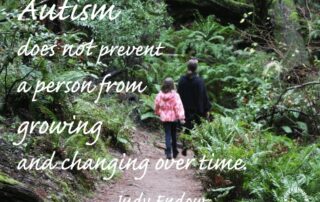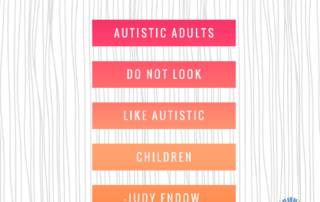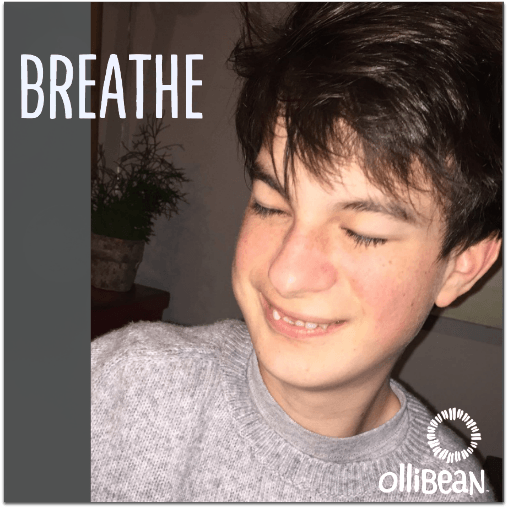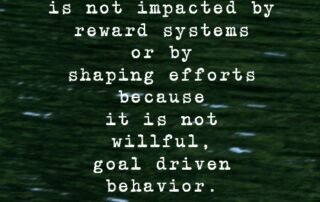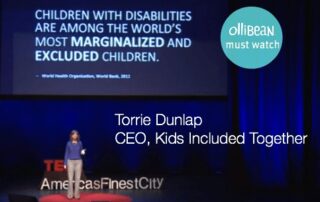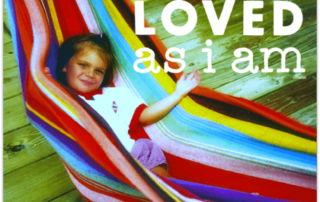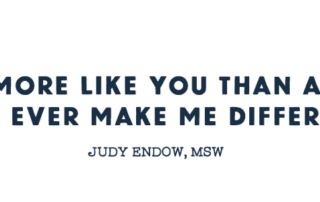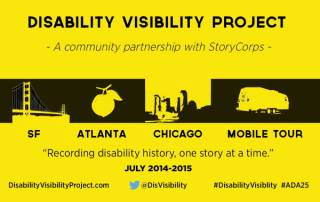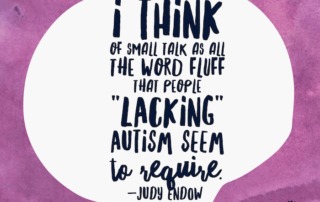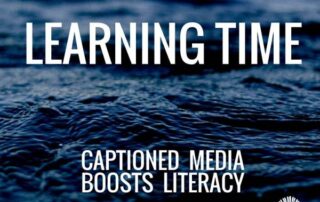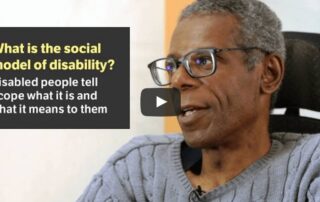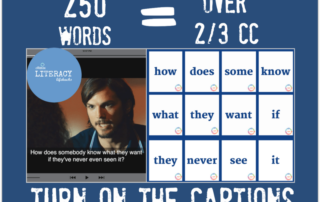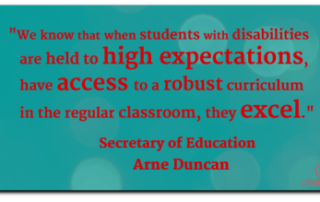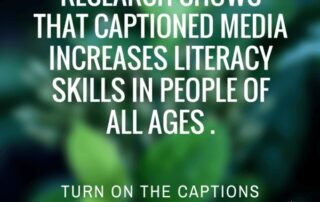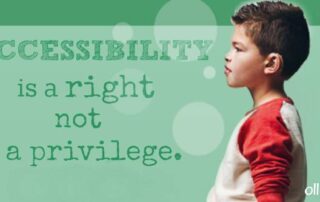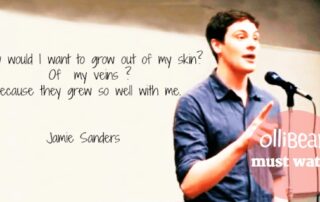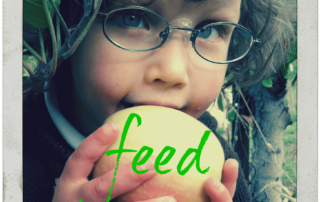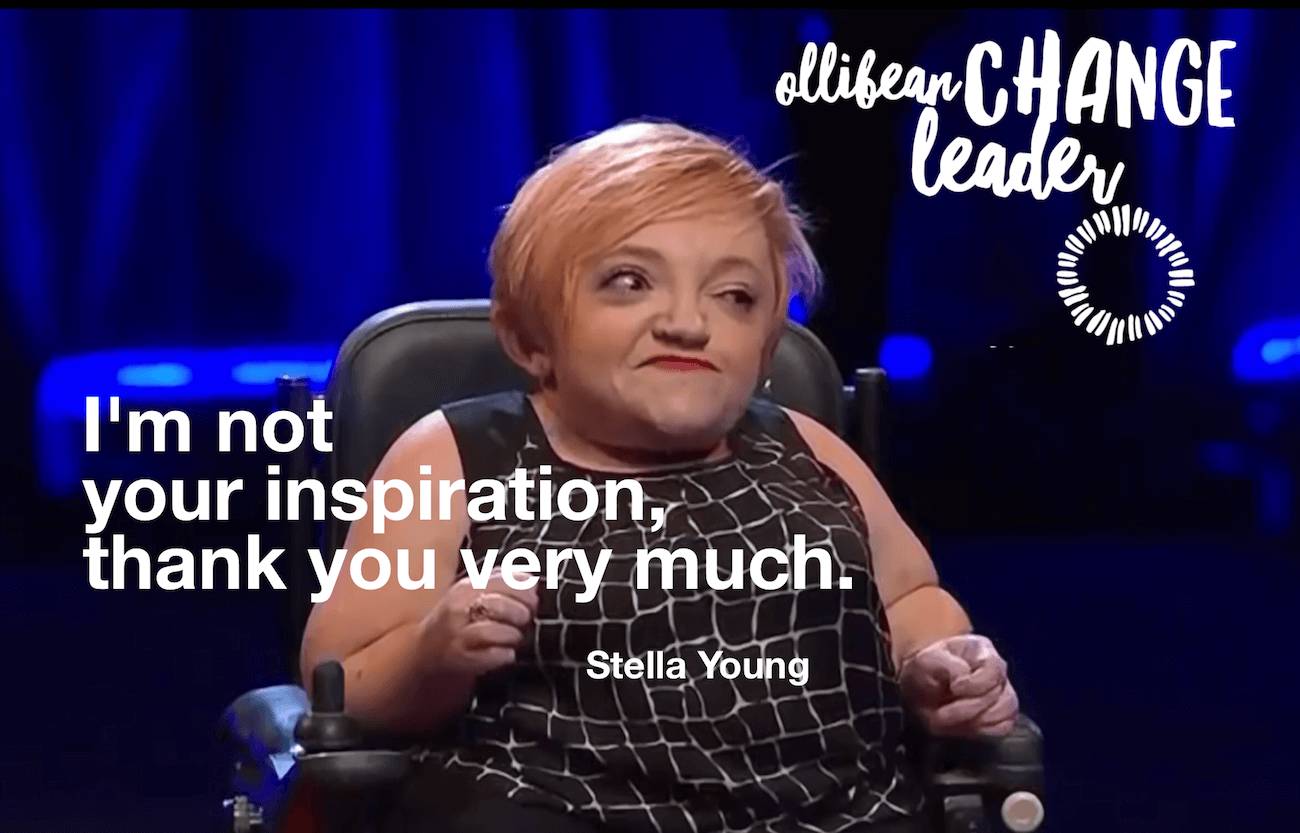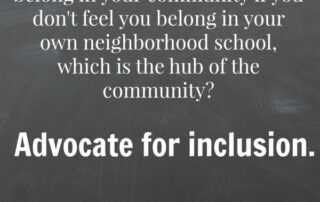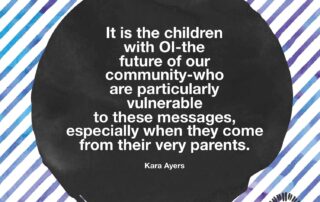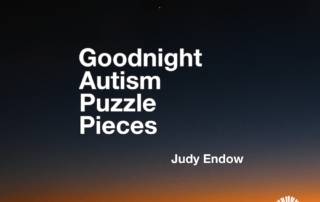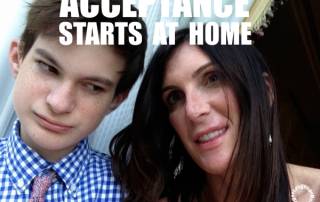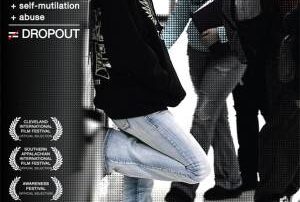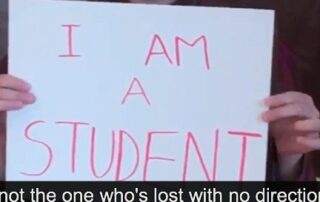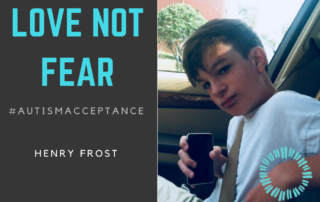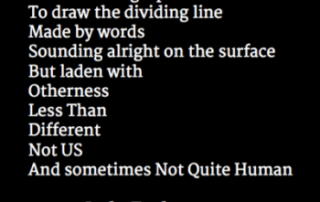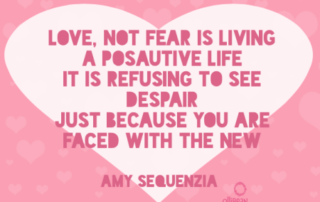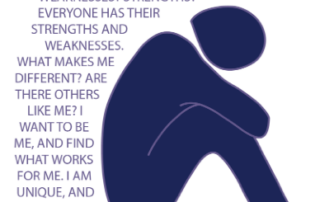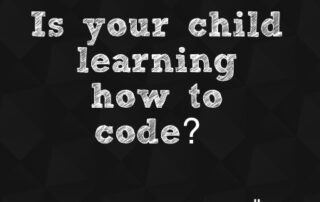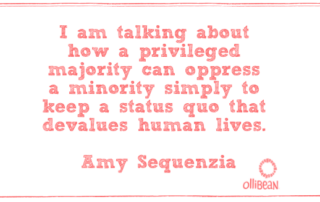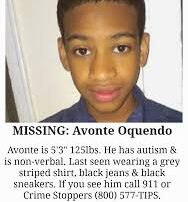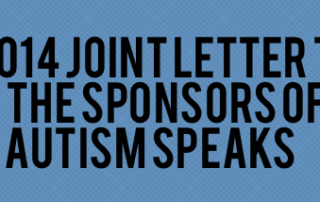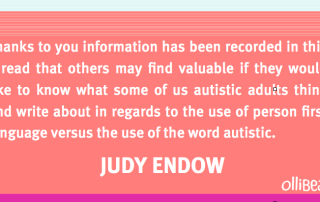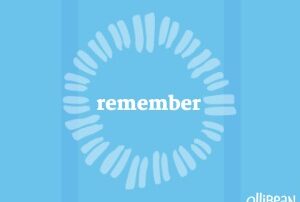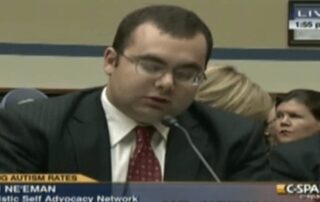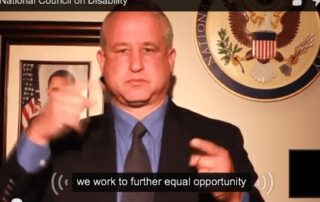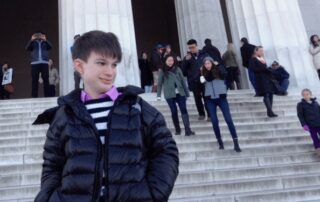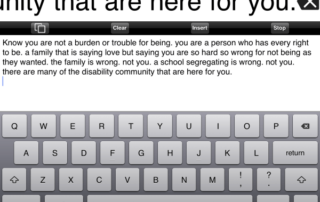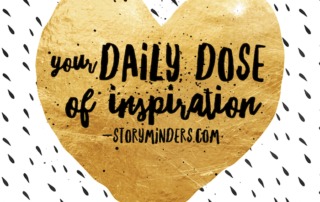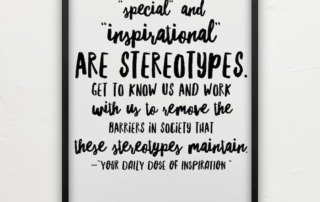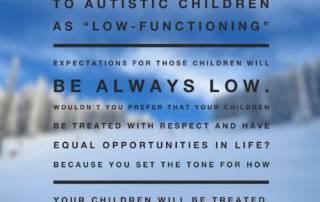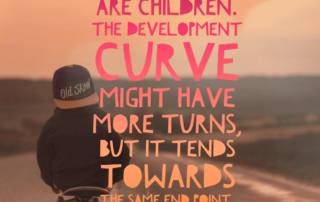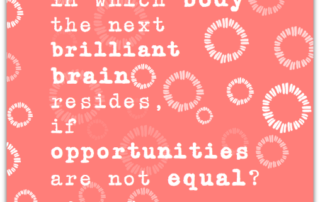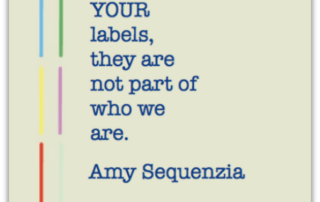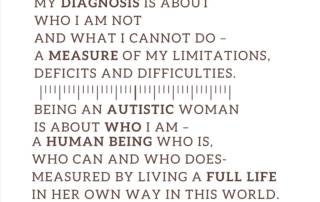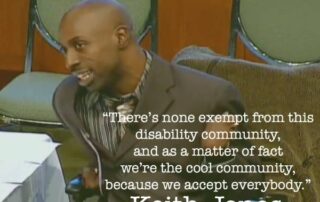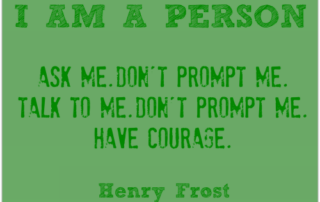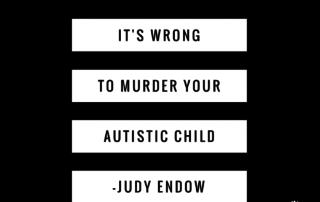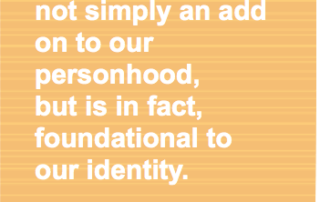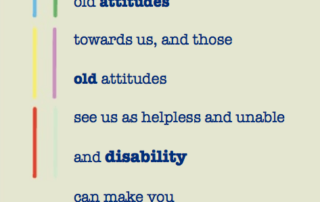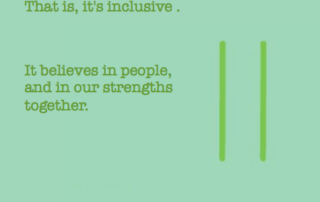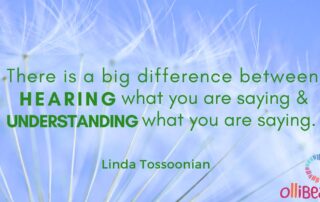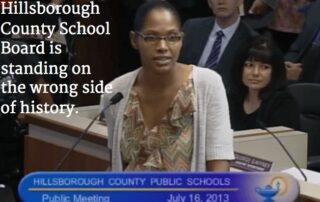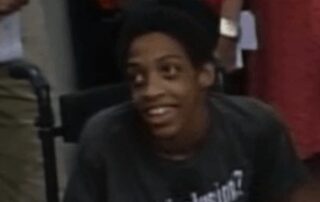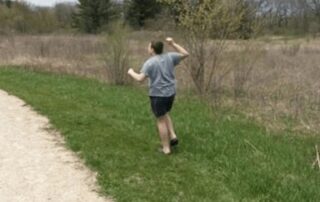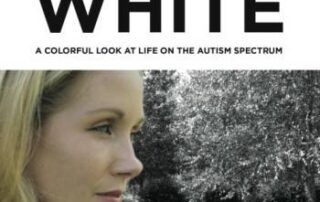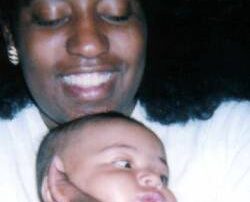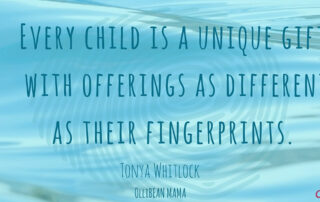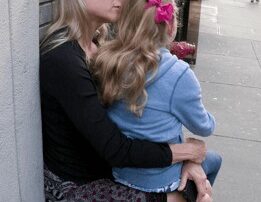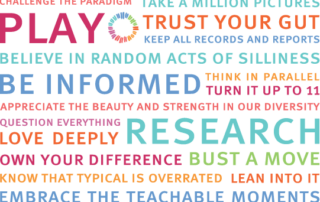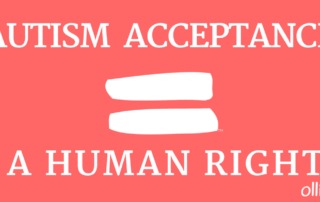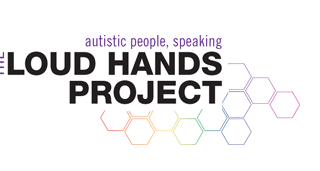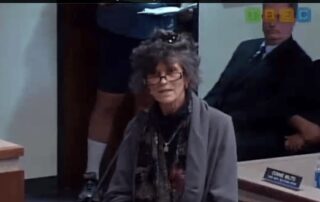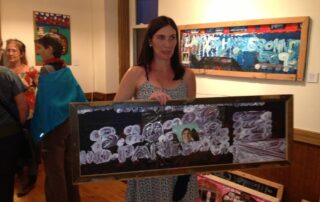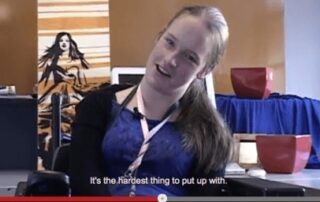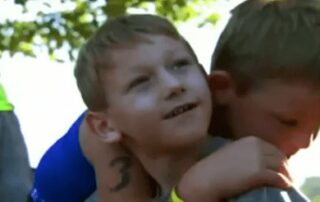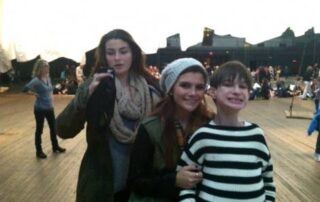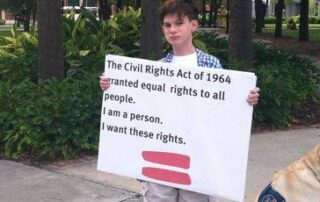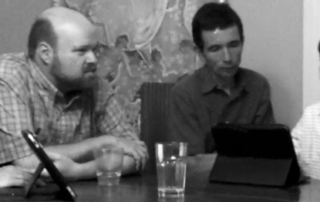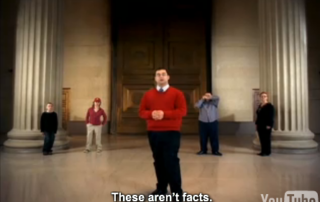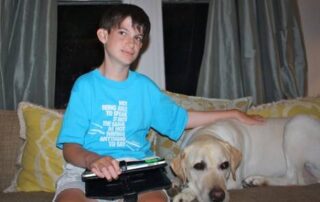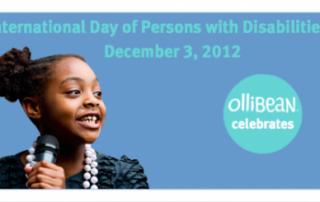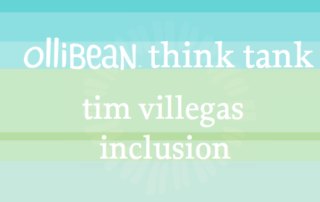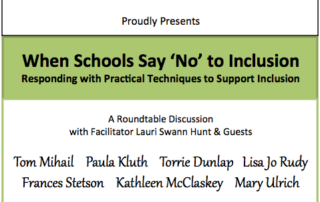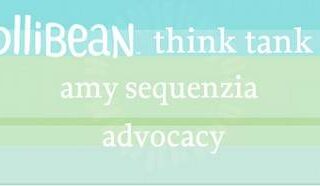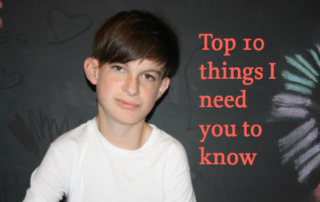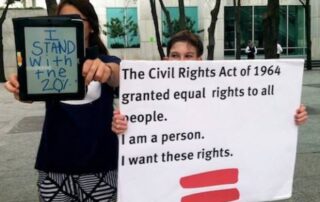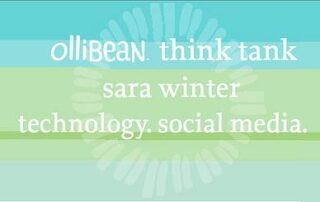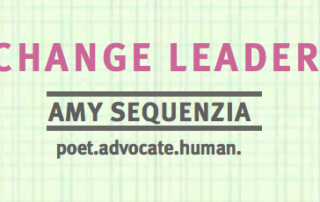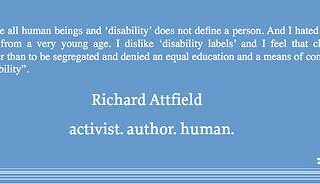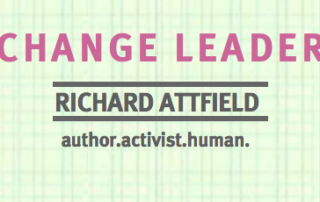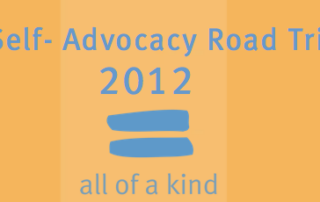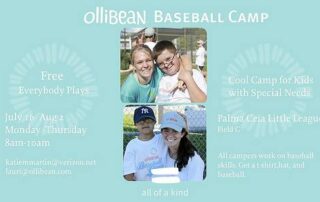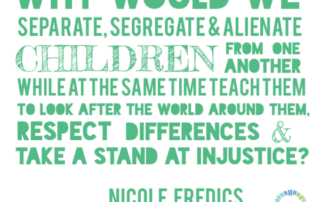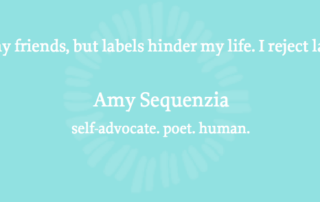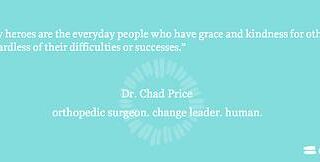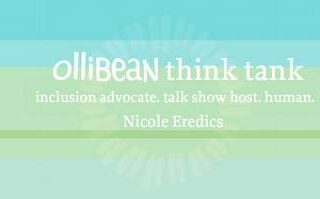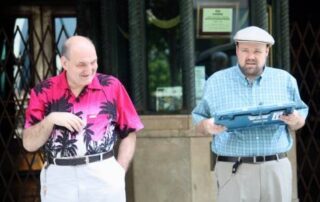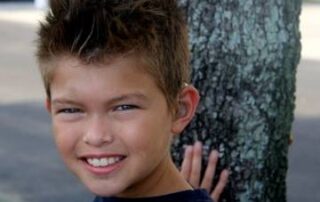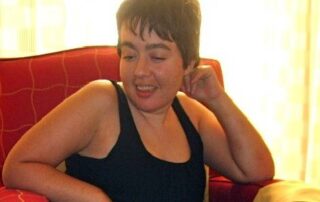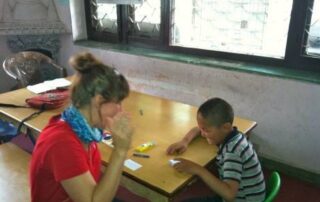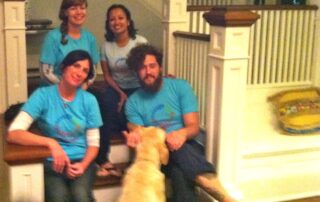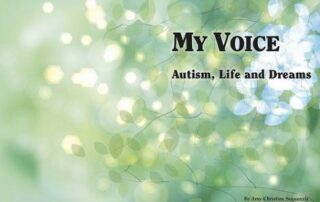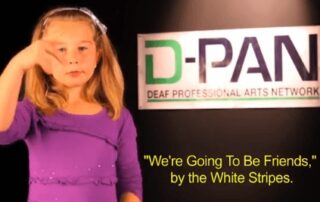Communication, Interaction, and Autism Acceptance
If you've read enough of my writings, you know that I am an activist for the rights of all people - especially Autistic people - to communicate using whatever method it works for each individual. Communication and Autism Acceptance Everybody communicates. Communication doesn't need spoken words. Communication doesn't need words at all. Behavior is communication. Smiles, looks, our bodies - those are used for communication and they are as valid as any word. I can type, and I like to type. Even if typing is exhausting, I still use this method to speak out. Interaction and Autism Acceptance But I
Autism Awareness Month Awareness
Beware of Autism Awareness Month by Amy Sequenzia. "Autism Awareness Month" Awareness I am writing this in March because I want everyone to start getting ready for April, which was declared by non-Autistics to be "Autism Awareness Month". I am declaring March: “Autism Awareness Month” Awareness Month. To make it less confusing, let's call March: The Month to Beware of Autism Awareness Month. Why am I doing this? April's Autism Awareness Month Because Autism Awareness Month is the month when all those so-called autism advocacy organizations double, triple down on using our neurology to raise money by advertising how terrible it is
Intelligence Is an Ableist Concept
Intelligence Is an Ableist Concept, by Amy Sequenzia. Warning: use of the R-word. Am I “Intelligent”? Too many times I see the word "intelligence" in articles that are supposedly about disability rights. The word comes up to explain that being disabled does not mean that there is a "problem" with the brain. Many times this happens when a physically disabled person, or someone talking about physical disabilities, want to point out that “their minds are fine”. The word is also used to tell stories of non-speaking Autistics who learned to type to communicate and "proved" that they are "intelligent".
Living My Disabled Life: My Story Is Mine to Tell Part 3
How I Tell My Story by Amy Sequenzia. Living my disabled life: My Story Is Mine to Tell Part 3. (Part 1 Autism: My Story Is Mine to Tell and Part 2 Love, Respect and “Autism Parents” ) By living my life. Unapologetically. Fiercely. With pride. I am me. I am disabled and I am a perfect being, despite the bias and oppression imposed on me. I am a perfect being despite my human flaws. My story is mine. The life I live is the one I have. I like my life. I don’t like what non-disabled people believe my life to
Love, Respect and “Autism Parents”: My Story Is Mine to Tell Part 2
Love, Respect and "Autism Parents" : My Story is Mine to Tell - Part 2 by Amy Sequenzia. This is the second post on how Autistic voices are dismissed and erased when the world talks about autism, and about what being Autistic means. The first post was about how the "experts", the media, and so-called advocacy organizations tell our stories. This post is about how parents tell our stories. It is a little more complex, because while it is true that parents usually know their children better than other people, and while we all hope that every parent loves their
Autism: My Story Is Mine to Tell
My Story is Mine to Tell by Amy Sequenzia. Everywhere - on the web, in conferences, in books, on TV and on the radio, in college lecture halls - people are talking about autism. Too many of these voices are non-autistic voices. Too many of these voices don't really know what autism is. Too many of these voices are simply telling old stories - full of assumptions - that non-Autistics voices have told before. Too many of these voices are actively silencing and ignoring Autistic voices, while being hostile to us when we tell them they are wrong. They tell
Proudly Autistic by Amy Sequenzia
by Amy Sequenzia Being Proudly Autistic Being proudly Autistic. Being proudly Disabled. Being me. Telling my story because my voice is my own. My story is mine to tell. I define myself. Since I was very young I have had an independent mind. Sometimes - no, many times - for a long time, I was silenced. I was told to comply. I was called names. To many, I didn't have dignity, I didn't deserve dignity. But I persevered. Perseverated. Persisted. Some people saw my humanity. To them, I let myself known. Without words. With smiles. An occasional hug. And
I Resist by Amy Sequenzia
by Amy Sequenzia. I RESIST My resistance is an act of defiance. I defy the assumptions of an unlivable life Of a tragic existence Of dreams that would never become true. The world said I wouldn't - I defied. The world said I couldn't - I defied. The world says that I won't, that I can't - I resist. I defied the expectations, and I kept existing. I defied assumptions, and I celebrate my existence. I resist the ones who insist on erasing my existence. I defy the ones who deny me respect. My existence is an act of
Mental Health Therapy and the Autistic Client: When Clinicians Don’t See the Autism (It’s All the Autism)
When Clinicians Attribute All Psychiatric Symptomatology to the Autism Autistic people find their way to therapy when symptoms of depression, anxiety, OCD and other diagnoses become problematic to them in their daily lives. When a client has been previously diagnosed with autism it is common for mental health clinicians to attribute all psychiatric symptomatology to the autism, which often results in autistics not being diagnosed or treated for comorbid mental illnesses when warranted. As clinicians we need to understand the autistic operating system – in other words, to see the autism – if we are to be helpful to
When Disabled Students Are Abused
This is the second in a series of posts about trauma due to criminalization of disabled students by Amy Sequenzia. Content Warning: ableist slurs, description of abuse. I write this post based on the case linked here, NC Boy With Autism Slapped: Former Teacher Gets Jailtime , and on similar cases that make the news when they happen but after that we don’t hear about the victims. I will tell what happened to me, how I reacted to the abuse, and the lasting trauma that might have gone unnoticed to many. The case in the link had a better ending than most.
Mental Health Therapy and the Autistic Client: When Clinicians Don’t See the Autism
A Series on Mental Health Therapy and the Autistic Client by Judy Endow, MSW When Clinicians Don’t See the Autism (Can’t See the Forest for the Trees) Today, autistic people, just like the population at large, find their way to therapy when symptoms of depression, anxiety, OCD and other diagnoses become problematic to them in their daily lives. As clinicians we need to understand the autistic operating system – in other words, to see the autism – if we are to be helpful to our autistic clients. When we do not have a strong grasp on this the results are
The Criminalization of Disabled Students
This is the first of a series of posts about trauma due to criminalization of disabled students by Amy Sequenzia. The Trauma Is Real Everyone has heard of the school-to-prison pipeline. It is the system that criminalizes students' minor infractions of school rules. It is the result of "zero tolerance" policies, of the presence of cops (School Resource Officers - SRO) in schools. It has become so extreme that a student kicking a trash can, due to frustration, can lead to a criminal record, detention in a juvenile facility and criminal charges instead of a school disciplinary action, like after
Mental Health Therapy and the Autistic Client: The Autistic Operating System, Part One
The Autistic Operating System, Part One Mental health diagnosis and treatment has evolved over time according to what makes sense and what works for most people. We have an increasing body of research around mental health issues that informs us today. However, when it comes to autistic people we do not have a body of research that informs us about diagnosis and treatment of mental health disorders. Autistic people are not like most people. This means we need to understand the underlying autism neurology along with its impacts in the realm of diagnosing and treating mental health disorders
Mental Health Therapy and the Autistic Client
By Judy Endow , MSW Mental Health Therapy and the Autistic Client: Establishing Context Background Information: The autism neurology gets hit with elements of confusion, chaos and change as a person goes through their day. How this happens is different for each individual on the spectrum. For example, Brady’s neurology startles to a touch on the arm, DeShawn’s neurology reacts adversely when it perceives a surprise change in the therapy room such as new curtains and Aysia’s neurology delivers a punch when her therapy routine was altered by Grandma bringing her rather than mom. Each of these individuals was abruptly
Autistic, Non-Speaking, and “Intelligent”
Autistic, Non-Speaking, and "Intelligent" by Amy Sequenzia "Being Autistic is not the same as being intellectually disabled". "Non-speaking Autistics are intelligent". "When non-speaking Autistics learn how to type they can ‘prove’ their intelligence'". All the statements above are true. They are also incomplete. Statements like these are assumptions that do not help in making the world more respectful of all disabled people. They are incomplete because some non-speaking Autistics might also be intellectually disabled; Because some Autistic people might be Autistic AND intellectually disabled; Because while some typists are able to show that the assumptions about their IQ were
The Advantage of Autistic Difference in Visual Perception
Autistic writer, artist and consultant, Judy Endow on autistic difference in visual perception. As a child, people sometimes thought I was stubborn and resistant when I did not want to allow them into my space or to do what they wanted me to do. They did not understand the negative effect they had on me and on my surroundings, and at the time, I did not have the words to explain it. Sensory Information and Perceptions Today I have the words and can explain. I do so in hopes that it might help others who may not yet have their
Eye Contact and Autistic Dissociation: One Example
Autistic writer, artist and consultant, Judy Endow on eye contact and autistic dissociation. Autistic Dissociation “Dissociation is the ability to cut off from what is happening around you or to you. In its simplest form it is daydreaming. It is a skill all children have and which children with autism tend to overdevelop in managing a world they find overwhelming for a whole range of reasons.” Donna Williams (Donna Williams at http://www.donnawilliams.net/333.0.htm) Overwhelming Eye Contact and Autistic Dissociation I can remember the overwhelming experience having eye contact with others sometimes had on me as a child. Too much bright,
Teaching Abstract Concepts to Literal Thinkers
Autistic consultant Judy Endow's strategies for teaching abstract concepts to literal thinkers. Teaching Abstract Concepts to Literal Thinkers During the holiday season people are sometimes rushed and frazzled due to the extra activities and expectations of the season. Thus, it is a particularly good time to talk about kindness. Many individuals with autism are literal and concrete thinkers, which can make teaching an abstract concept such as kindness a little tricky. Here are some ways to work with an autistic neurology when teaching the concept of kindness: Identify Acts of Kindness Even though kindness is an abstract concept we can
Autistic Neurology and Behavior
Judy Endow explains how understanding autistic neurology shifts our perceptions and enables us to support autistic students. "Besides being kind and being the right thing to do, it is far more expedient to support autistic neurology than it is to assume negative character and ill intentions about your student with autism when he is struggling." All people use behavior. Autistic people use behavior just like people who are not autistic. Basically, when a problem is encountered, people behave in a way so as to fix the problem. We all do this, whether we are autistic or lack autism!
Why the Disability Community Is Grieving
11-9 by Judy Endow Our grief is deep. 11-9 feels so much to our disability community like 9-11 to our society. Our grief is deep. We are not being overly dramatic. Yes, 9-11 saw significant loss of life. Living, breathing people – lots of them – died that day. The reason those of us in the disability community feel this sort of grief today is because our human worth is on the chopping block. We know today that many of our friends, neighbors, fellow citizens out there in the community at large have voted against our humanity. For some
Disability Policy: Clinton versus Trump
In a few weeks will have elected a new President of the United States. Many of us get our information from watching TV. The trouble with this is we only get the information the TV decides is news worthy. Unfortunately, most things concerning disability are not newsworthy. This means that rather than seeing a candidate’s disability policy on the evening news we are more likely to see a candidate’s latest purported scandal whether it is about deleted emails or admitted past sexual abuse. While these things can be informative, I think it is helpful to also understand where the two
Providing Sameness and Routine While Living in Unfamiliar Surroundings
Judy Endow's Strategies for Providing Sameness and Routine Many children with special needs thrive in an environment with a high degree of predictability, sameness and routine. In the aftermath of a natural disaster life is anything but what our kids need to succeed. Often entire families, neighborhoods or communities are in the flux of confusion, chaos and change and will be for quite some time to come. Putting sameness and routine back into your child’s life as quickly as possible will be helpful. How can you do that when you have no idea what life will hold for you and your
Quick Tips to Create a Visual Schedule
Judy Endow on the Importance of Continuing a Visual Schedule After a Natural Disaster Many children with special needs use a visual schedule to organize their day. A visual schedule shows which activities and the order in which the activities will happen. A visual schedule can map out a big chunk of time such as an entire morning, afternoon or even a whole day. A first/then visual schedule shows what will happen just now (first) and what will happen next (then). (Endow, 2011) If your child uses a visual schedule it is important that you continue using a visual schedule through the
Autistic Burnout and Aging
Judy Endow Examines the Interplay Between Autistic Burnout and Aging Last week I returned from a vacation that I had been dreaming of taking for several years. I had booked my vacation quite a long time ago. After booking it, my personal resources declined. Many autistics know this phenomenon as autistic burnout. I am beginning to understand that there is likely some interplay between autistic burnout and aging . In autistic burnout we come to the end of our resources that enable us to act as if we are not autistic in order to meet the demands of
Autism, Direct Instruction and Having Friends
Autism, Direct Instruction and Having Friends by Judy Endow Social Understanding and Communication Social understanding and communication are two areas impacted by autism neurology. The way this plays out is different from one autistic individual to the next. Typically, for autistics I have worked with, this means that they do not always pick up social information from the world around them through observation only as most people do. Instead, they sometimes need direct instruction concerning information their autistic neurology doesn’t allow them to automatically pick up and learn. I think it is important that those around autistics understand that not
Autism and Movement Fluidity in Thinking
Autism and Movement Fluidity in Thinking by Judy Endow Unreliable Fluidity in Thinking One of the hardest things about my autism is the unreliable fluidity of my own thinking. Sometimes my thoughts are fluid and sometimes they are not. When my thoughts are fluid I can easily think through task-oriented things such as making a meal, writing an article, or cleaning the house. I can make a mental (or written) list and follow it. I can think of a main idea and sub topics. I can gather supplies and start. When my thoughts are not fluid life is a bit different.
Autistic Consultant on Autism, Making Friends and The Hidden Curriculum
Autism, Making Friends and The Hidden Curriculum by Judy Endow It can be difficult for some autistic people to sort out what things are okay to say and what things are not okay to say in various social situations. This was true for a high school student I worked with during the past year. William very much enjoyed talking with others, but was asking questions and making comments that were not appreciated by teaching staff. Worse, these comments and questions were causing other students to avoid him rather than include him in social exchanges. Each time teaching staff explained to
The Gymnastics of Person First Language
by Amy Sequenzia This post is about Person First Language and autism. Another title for this post could be: "Disability Language, and "Gymnastics". Some might find part of it funny, but I am not kidding. I wrote about why I believe Person First Language (PFL) is ableist, and how individual choices should be respected - the "individual" being the disabled person. Person First Language and Autism Most independent-thinking Autistic adults prefer Identity First Language (IFL). Some use Person First Language and their choice should be respected. This post is directed to non-autistics, to the media, and to autism advocacy organizations
Realities of Being an Autistic Therapist
by Judy Endow Realities of Being an Autistic Therapist In my work as a clinician licensed in my state to provide mental health therapy, many parents of children diagnosed with autism tell me how much they appreciate the fact that I am not only a therapist, but also am autistic. They feel they have a hybrid of sorts – I am a clinician, an autistic and have parented both children with and without autism. In addition, I have been an autism consultant for several school districts over the years so also can appreciate the educational side of things when it
Universal Design and Disability Acceptance
by Amy Sequenzia Universal Design If you are reading this, you probably should know that inclusion of disabled students, with the supports they need, is beneficial to all students. Universal Design is a thing. It means one builds things, and creates products that are accessible to all. It can also be used in classrooms, making sure all students have access to the same education, accommodating individual needs in a flexible environment. The idea of Universal Design is not about kindness, or about compliance with the ADA. It is about common sense. When more people participate, everyone wins because human beings
Autism, Social Greetings and Rhetorical Questions
by Judy Endow Autism and Rhetorical Questions Autistic people may not automatically know how to respond to rhetorical social questions such as “How are you?” or automatically reciprocate in social pleasantries such as “good morning.” This is not because they are rude, obnoxious, don’t care, or any of the other assumed reasons people attribute to this behavior. Instead, it is because all social information is not automatically picked up and used by a person with an autistic brain. The autistic brain simply works differently. Even so, autistic people can learn those things their particular brain hasn’t allowed them to automatically
Disability, Safety, and Value
Disability, Safety, and Value by Amy Sequenzia This post will mention the attitude of some parents. This post is not about love or wanting the best for a child. It is about being conscious that ableism exists, and that you might be, even if unwillingly, contributing to the systemic ableism in our society (I urge you to read the links. Click on the highlighted words throughout the post). I am a very disabled non-speaking Autistic woman. I need many supports. Many of you already know that. Some of you also know that the supports I needed throughout my life weren't
Teaching One Autistic Student to Ask For Help
Teaching One Autistic Student to Ask For Help by Judy Endow During the past school year I worked with a third grader diagnosed with autism as he returned to school after being discharged from a treatment center. Jake displayed many behaviors that did not work well in the classroom. These behaviors occurred predominantly during math class. Jake’s scores in math were 82 – 90 percent over the previous quarter. With these scores, it did not appear that he was struggling in math. I discovered that most of Jake’s behaviors stemmed from frustration. Jake knew when he needed help, but
Communication and “Autism Specialists”
by Amy Sequenzia From time to time I find myself writing about typed communication, and how Autistic typists are devalued by "autism specialists". There is a very vocal group of people - the "autism experts" or “autism specialists” - who refuse to accept that we can feel human feelings, that we can think complex thoughts, that we are people. "Autism Experts" and "Autism Specialists” Many, if not most of them are behaviorists, the ones who believe that everyone should strive to look as neurotypical as possible, and act as neurotypical as possible to have any value as human beings. They refuse
Teaching Autistic People
by Judy Endow Autistic People of All Ages Can Learn Just like people of all ages can learn, so is it that autistic people of all ages can learn. It is an utterly sad state of affairs that this even needs to be said, but unfortunately, it needs to be said. Too often I see autistic children being babysat rather than being taught at school. When I ask about academic curriculum being used, I am told, “Oh, he has autism” as if this is an answer to my question. In my work as an autism consultant I am called on
Epilepsy, And Living Epileptic
Epilepsy I am writing this as, partly, a rant. I don't want pity, and I don't feel sorry for myself. If you think you need to “feel” something, feel anger at the lack of funding on research that can actually save lives, the lack of understanding about what epilepsy is, the lack of accessibility, and the stigma. feel anger at the lack of funding on research that can actually save lives, the lack of understanding about what epilepsy is, the lack of accessibility, and the stigma Epilepsy is Complicated Epilepsy is complicated. It affects people in so many
Autism and Consequences
by Judy Endow Autism and Consequences Sometimes a person with authority over another engineers a consequence for certain behaviors as a way to decrease the frequency of unwanted behaviors. One way people learn is from consequences. For example, if you leave your car parked outside with the windows down and it rains, the natural consequence is that your car seats will get wet. Sometimes a person with authority over another engineers a consequence for certain behaviors as a way to decrease the frequency of unwanted behaviors. For example, a mother or a caregiver might decide that if hitting occurs at
Autistic People: Persons or Projects?
Autistic People: Persons or Projects by Judy Endow Autistic people experience the world differently than non-autistic people experience the world. One reasons for this difference is the autistic sensory system is quite different from the neuro-majority, which is considered the norm. In addition, the autistic thinking style has differences from the neuro-majority norm. Autistic Sensory and Thinking Differences The autistic sensory system takes in information from the environment. This information can come in too big, too small, delayed or distorted. Autistic thinking style is often visual, concrete and many have a thinking-in-pictures style of their own. This means processing
Disability, Dignity and Cost
Disability, Dignity and "Cost" by Amy Sequenzia Warning: I am going to mention "Right to Die With Dignity" legislation, my position, and other non black-and-white issues. I am against legislation that states the "dignity" of a terminally ill person should be a reason for euthanasia. I am not going to say that each person does not have the right to refuse treatment when all medical options have been exhausted and they will not survive the illness. Some illnesses, when the end is near, can be very painful. That's why I don't support legislation allowing euthanasia. Pain management is an option.
The Changing Implementation of Accommodations
The Changing Implementation of Accommodations Accommodations are something provided by law to people with disabilities. It is easy for people to understand physical accommodations such as wheelchairs and curb cuts. It is much more difficult for people to understand accommodations when it involves sensory and processing differences such as those common to autistic people. Because an autism diagnosis is one of a spectrum diagnosis there are a variety of ways autistic people experience their particular autism. In fact, even though there may be similarities, just as no two neuro majority people experience the world in exactly the same way,
Disabled TV Character and Positive Outcomes
One Person At A Time I wrote about this before but I want to emphasize a few points. I am talking about the effect of television, or any media, on how disabilities, and disabled people, are perceived by the non-disabled world. Specifically, I want to emphasize the - hopefully - positive effects of one TV show on its fans' views on disability and disabled lives. The show is X Company and this article contains spoilers. I will talk, again, about the character "Ulli". Quick recap: Ulli was a young boy with Down Syndrome, being kept as a secret by his
Why Disabled People Write About Ableism
Are You Paying Attention When Disabled People Write about Ableism? When I, and other disabled people write about ableism, we don't do it because we like the topic. We do it because we DON’T like it but experience it every day. We do it because we are protesting the many ways we are objectified, dismissed, ignored and dehumanized. I don't speak for all disabled people but I believe most would agree with my statement above. Forms of Ableism There are very obvious forms of ableism, from inaccessibility, to inspiration porn, to denial of rights. There is also the ableism
“Speechless”: A Comedy That Includes Disability
"Speechless" has been picked up by ABC. "Speechless”, is a new comedy series about a family with three children, one of whom is a teenager named JJ who is non-speaking and uses a wheelchair. Yes, a sitcom on ABC about a family with a child who has a disability and communicates using AAC (Augmentative and Alternative Communication). And JJ won't just be featured in one episode to teach the other characters a lesson, but is an integral part of every episode. Just like real life. If seeing a family like yours on a major network wasn't enough, JJ is being played
Autism, Behavior and the Impact of Kindness
Judy Endow on Autism, Behavior and the Impact of Kindness Please know that the behavior of people with autism makes sense in the context of their experience of the world around them. Because typical people do not share our context they are not often able to assign correct . They do their best by assigning meaning to our behavior based on what the behavior would mean were they themselves engaged in it the behavior. Often they arrive at wrong conclusions. Sometimes they even assign negative character traits to us based on their wrong conclusions. Example: As an autistic I can
Autism Awareness and May Flowers
Autism "Awareness" and May Flowers This is my THANK YOU to all who lived through yet another April with Autism Awareness, the bewareness and woes. It’s May now. My garden is blooming because you were there with me. May Flowers It is said that April showers Bring May flowers What does April ableist rain Bring to my life's garden? I see weeds of compliance, I see rocks of hate Thrown through the glass of my greenhouse Scattered shards cutting, Hurting the leaves struggling to breathe The ground covered with trash Left behind by the Vandals For
Autism Visual Thinking and the Parking System
Autism and Visual Thinking Many autistic people think visually. As a young child who thought visually I was often thought to be stubborn and insisting upon my own way when in reality I was merely trying to keep ahold of a thought. Today in my work I come in contact with many on the spectrum and see the same phenomenon at work. Let me explain with two examples: Example Parking Objects: Every day Britt comes to school with a toy from home. It is very difficult for her to leave the toy in her cubby so she carries it
Parenting and Caregiving Relationships
Parenting and Caregiving Finding the balance between parenting and caregiving children with disabilities can be challenging -- there's a fine line between hovering and being there to assist when needed. The dynamics of the caregiving/care receiving relationship are complex. They are constantly changing as our children grow up; what's nurturing and helpful for a five year old doesn't fly at ten, what was okay at ten, doesn't work at eleven, and so on and so on. The media typically presents the perspective of caregivers, particularly parent caregivers, but rarely provides the perspective of the person with a disability who uses personal
Disability Awareness Bewareness
Amy Sequenzia on Disability Awareness campaigns that silence the very people they claim to advocate for. I Am Aware of You I am aware of you Of your dismissiveness Of your hostility Of your badly disguised contempt You say you do all that Because it is a much needed First step A first step Towards acceptance, you say But we need to change our ways first A first step Towards better services, you say As long as not-us are served first You claim to speak for some of us The ones you call trapped Voiceless Severely damaged But
Autism Awareness and Autism Acceptance
No more deficit based Autism Awareness. Autism Acceptance focuses on the strengths and abilities of autistic people.
Autism, Death and Mental Health Therapy
by Judy Endow The traumatic event of death is something we all struggle with from time to time over the course of our life. It is no different for autistic people. I am often reminded to be sure to identify exactly what the autistic person is struggling with when it comes to their particular circumstances. I am remembering youngster who had a pet gerbil that died and he didn’t want to part with the beloved gerbil. Three days after the gerbil had passed the pet was still in the little plastic exercise ball, which the youngster was carrying around with
Parents, Are You Listening To Your Child?
As a non-speaking Autistic, I pay special attention to comments and statements made by parents of other non-speaking Autistics, especially children. Many times I see parents lamenting that they will never listen to their Autistic child say "I love you", or how much they long to hear those words.
Autism, Accommodation and Differential Expectations
People generally are very pleased with themselves when they have made an accommodation for me. I know this because they proudly announce it! In turn, I have learned to say thank you when people announce their thoughtfulness at making an accommodation for me. I truly am thankful because it allows me a fuller participation in the events going on around me. It also makes me smile because I have been making accommodations for people my whole life and it has never occurred to me to announce it!
Apple Celebrates Autism Acceptance Month with “Dillan’s Voice”
Autistic high school student Dillan Barmache, has so much to say and people around the world are listening. "Dillan's Voice" can be seen on Apple's website in celebration of Autism Acceptance Month. Apple has chosen Acceptance over Awareness and it's a big deal. Why ? Because 16 year old Dillan Barmache communicates using an iPad, you don't see that in the mainstream media every day. And because Autism Acceptance Month was started by #ActuallyAutistic people. ( You can read more about it's evolution from organizer Paula Durbin-Westby ) The world is listening and it's so exciting. Not being able to speak doesn't mean you don't have a
Normalcy is an Ableist Concept
by Amy Sequenzia Ableism: we know it is everywhere and we know it is the reason why disabled people fight the normative society that chooses to make us invisible. The idea that we should try to fit a pre-determined, arbitrary way of doing things excludes disabled people by default. We are often ignored, many times abused, used as props for inspiration porn, and generally left out - unless we change how we do things, unless non-disabled people feel at least a little comfortable in our presence. Despite laws and general common sense, any accommodations necessary to make a little
Autism and Friendship
By Judy Endow For many years having friends eluded me. I find that to be true with many teen and young adult autistics. If you are in that predicament I encourage you to hang in there because it does get better over time. One of the hardest things we have going against us as autistics is that it is generally non-autistics who try to help us to have friends. The only way they know how to help is to try to get us to make friendships work in the way they make them work based on the way their neuromajority
Autistic Visual Thinking Impacts Comprehension
by Judy Endow I think in colors. My thinking colors have sound and movement. When I hear spoken words my neurology automatically goes for the match – a match for the words I hear to a familiar concrete picture of something in the world outside my skin or to an internal picture I have stored in my memory. . When I was a girl I heard the saying, “I got the world by the tail.” Immediately, the matching pictures of my experience of the world popped up for me to see. I found the best match and promptly assigned
Autistic Neurology or Psychiatric Symptomatology?
by Judy Endow Sometimes autistic neurology – specifically our style of thinking and the way our brain handles information bumps up against what can appear to be psychiatric symptomatology. This has happened to me many times over the years. My style of thinking is visual along with being quite literal and concrete. I understand myself and, in general, thoughts, ideas and concepts by having or creating an object or visual representation of that construct. Here is an example: “…in my life, I have come to a fuller understanding of the parts of me as represented by actual pastel colored
The Predictability, Pattern and Routine of Stimming
by Judy Endow The neurology of a person with autism does not automatically organize the world outside their skin. When we are able to organize the happenings in the world we usually do so differently than neuro majority people. As a young child I saw over and over how light from the sun interacted with water particles rising from the ground and with water droplets in the air. This repeated experience became useful over time in that I learned the predictability of this occurrence. I also learned the effects of various factors (such as clouds, rain, air temperature, wind,
Person First Language and Ableism
by Amy Sequenzia If you are not Disabled and you are demanding the use of Person First Language (PFL), you are being ableist. If you are Disabled and you are demanding that other Disabled people use Person First Language, you are being ableist. If you are Disabled and want to use Person First Language when referring to yourself, I will respect that. I will also respect your right to demand that other people use Person First Language when referring to you. But the Person First Language concept is ableist, and I can tell you why. I do know the
Autism and Measuring Normal
by Judy Endow Even though people described me as in my own world as I was growing up, I was in the same world as every other human being. I could not help it that other people could not see the details of the world such as the sun sparkles and the misty tails rising up from the ground early in the morning like I could, but that didn’t mean our worlds were different. Instead our experience of the same world was different. My experience was much more robust because I had ever so much more to see
Disability History and Pop Culture
X Company is respectfully educating viewers about the ableism, discrimination and elimination of disabled people during the war. Hopefully, it will make more people aware of how disabled people are still discriminated against and abused in unthinkable ways.
Social Rules that Change with Age
by Judy Endow The “hidden curriculum” refers to the set of rules or guidelines that are often not directly taught but are assumed to be known. Most people automatically pick up this hidden information; their brains work that way. For those of us with autistic brains, this information is truly hidden; we do not automatically pick it up. Hence, the term, “hidden curriculum.” Even though our brains are not wired to automatically pick up this hidden social information, we can learn it. Once we learn it then we know it just like everybody else. Sounds easy. It is
Autism and Eating Out
Autistic author and consultant, Judy Endow, shares strategies for managing sensory sensitivities when eating out.
Six Questions Before Publishing About Children
Blogging About Children with Disabilities Protecting a child's privacy when parents write about their family's experience . How much information is too much when blogging about children with disabilities? The discussion revolving around #CrippingtheMighty, the hashtag created by Disability Visibility Project's founder, Alice Wong, is so important when considering writing or blogging about children with disabilities. It's imperative to listen to disabled people about their lived experience and the very damaging affects of content that objectifies and marginalizes disabled people like Inspiration Porn. At Ollibean, we believe in full inclusion and acceptance of all people and stories that objectify disabled people can’t exist in the same
Privacy Versus Popularity
Your child's disability is not about you. Your child’s disability is not your story to tell. If you do it in public at your child’s expense, you are not doing your job, which is parenting. - Amy Sequenzia on Ollibean By Amy Sequenzia The title could also be: Privacy of Disabled Children versus Popularity of Parents of Disabled Children. Which one is more important? The answer is clear to me. As I wrote before, a child's disability is not about the parents. Neither is the disability something the child has done to the parents. I know many parents
Disability, Ableism, and Assumptions
by Amy Sequenzia The title of this article probably isn't about what you think it is. This title refers to a couple of events that made me think about how we should never assume that ableism is something pervasive only in non-disabled circles. I am talking about more than internalized ableism, the need some disabled people have to distance themselves from disabled people they consider not worthy of any respect. I am talking about ableism that easily resembles, sometimes becomes, hate. I recently experienced this kind of ableism. It was hurtful, and it got worse than I described in
The Hidden Rules of Christmas
by Judy Endow Christmas will soon be here again. There is much about Christmas I love. There are many things about Christmas that took me a very long time to figure out. This is because my autistic brain doesn’t work in a way to automatically allow me to pick up social information that others expect me to know. This expected social knowledge is called the hidden curriculum. It is the information that everybody knows – everybody except people like me! During the Christmas season there are generally more social gatherings to attend than in everyday life. These gatherings are
Holiday Giveaway- ‘The Real Experts’
Ollibean Holiday Giveaway "The Real Experts" The Real Experts : Readings for Parents of Autistic Children edited by Michelle Sutton features essays by Nick Walker, Ally Grace, Emily Paige Ballou, Alyssa Hillary, Cynthia Kim, Kassiane Sibley, Sparrow Rose Jones, Michael Scott Monje Jr., Elizabeth J. Grace, Briannon Lee, Morénike Giwa Onaiwu, and Amy Sequenzia. "How do I help my child to thrive? To be healthy and happy, to fulfill his or her positive potentials, and to grow up to lead a good life? Every parent of an autistic child struggles daily with this question. Just trying to understand an autistic child’s actions, feelings,
“Stimtastic” – Great Resource forChewable Jewelry, Stim Toys and Fidgets
Stimtastic - Chewable Jewelry, Stim Toys and Fidgets. Run by an autistic person, Cynthia Kim, of another resource we love, Musings of an Aspie. Description from the site: Stimtastic is affordable stim toys, chewable jewelry and fidgets for autistic adults and teens as well as individuals with SPD, ADHD/ADD, dyspraxia . . . everyone who stims! Run by an autistic person, Stimtastic celebrates stimming as a natural part of our lives. Every purchase you make at Stimtastic.co supports autistic individuals: 10% of proceeds from sales at Stimtastic.co go back to the autism community in the form of charitable donations and direct giving. All
Holiday Giveaway!
We are so grateful to each and everyone of you who make our community so wonderful. We are celebrating you and the holidays by giving away some of our favorite things. Today's giveaway is our "Inclusion- it's everybody's classroom" mug.
Fear, Anxiety and Autistic “Behavior”
When it comes to autism and "behaviors" it's better to understand and work with -- not on--the autistic person who is employing the behavior.
Autism, Visual Schedules and Prompting
Verbally prompting each step of a sequence isn’t an expedient way for many students with autism to learn routines.
Autism, Perseveration and Holding onto Thoughts
Autism, Perseveration and Holding onto Thoughts by Judy Endow Like many autistics, all my life I have thought visually. My thinking is comprised of pictures, colors, shapes along with their sound and movement. Given that experience, I have had to learn how to hold onto new thoughts because it doesn’t just happen automatically. This is especially true if I see a novel thought while in a slightly (or more than slightly) elevated emotional state. It doesn’t matter if the emotion is negative or positive. Here is an example: When I am looking forward to an event
Autism and Public Perception
Autism and Public Perception by Judy Endow Today we have added something to our public perception of autism. Historically that perception has been one of an isolated small child rocking or head banging, oblivious to the rest of the world. Even though that perception is wrong, it is the public perception. There is an addition to that perception in the past few years. It seems society has added an adult image of autism. It is another false image, but never-the-less, quickly becoming an accepted public image of what it means to be an adult autistic. Unfortunately for
Disabled Lives and Respect
I thought I wouldn't write about this case . I've been following it and the developments have been a sad reminder that disabled people are, in 2015, still seen, talked about and treated as less than human. Emily Brooks has been writing about it and her analysis is so comprehensive, I don't have much to add. But the rhetoric used by people involved in the case is making my heart hurt. If you don't know about it, you can read the articles linked above and here . I will not talk about Anna Stubblefield, if she raped an adult
Good Morning America: Called Out
As an autistic person I have my share of differences. Any time I am a way that the majority of people are not it is labeled “a difference.” Growing up and continuing on in adult life I learned that in general society does not consider my differences a good thing. In fact, it has often been considered good sport to poke fun of me for my differences. This happens to all people who deviate from the coveted standard of “normal.” Any difference is teased, mocked and ridiculed. If you are a larger or smaller, taller or shorter, faster or slower,
Assumptions and Ableism
I've recently read an article about how some researches are slowly starting to debunk long held assumptions about autism, Autistics, functioning labels, and how the world needs to provide more appropriate education to “all” Autistics. This is a quote from a researcher (Laurent Mottron): "Early childhood interventions should focus on harnessing strengths, rather than erasing the difference between autistic children and neurotypical kids" Of course, Actually Autistic people have been saying this forever. We have been warning parents about the damages caused by "therapies" that seek to train Autistics to make us look "indistinguishable from our peers” for a long
Autistic Patterns of Thoughts and Emotions
I use the movement of things outside of me for purposes of thinking and of processing feelings. Recently, autistic friends have let me know that most people in the world do not do this and that it is a rather common autistic experience. I have no idea how common so would very much appreciate autistic weigh in here. Thinking My thoughts are all in colors and pictures. Usually there are sounds attached, but not always. To think I need a way for the colors and pictures to move. When my sensory system is calm and integrated the thoughts
Deaf Teen Filmmakers Interpretation of Phillip Phillips’ “Home”
Acceptance, connection, and belonging. Home. Thank you Deaf Film Camp for making such awesome videos!
Uniquely Human Neurotribe
This past summer two new autism books were released within days of each other. Each, of it’s own accord, is a game changer if readership becomes large enough. Together the two books could serve to alter the course of autism history in terms of who is given the stage to tell the autistic story. NeuroTribes: The Legacy of Autism and the Future of Neurodiversity by Steve Silberman does exactly what the title says – lays out lots of history. There are so many interesting parts that I never knew existed that have impacted what we believe we know about autism.
Privacy, and Parental Behavior
I've written about this before: parents of Autistic children sharing very private information about their kids, sharing moments that show the kids being upset, or having meltdowns. These parents share everything publicly, using pictures and videos, the children's real names, even if the children are adults. Some say that they are trying to help other families, by showing the "real face of autism". These are the "martyr parents". Others are very angry "at autism" and say they are doing what any parent who loves their children would do: “fight autism”. These parents call themselves "warriors". Still
Autism, Transition Programs and the Impact of Poverty on Self-Advocacy
I am an autistic woman who has lived both in poverty and as a middle-income person during my adult life. I am noticing how self-advocacy is typically geared toward middle-income status. This could be problematic since many autistic adults live in poverty. Based upon my experience I have come to realize that middle class self-advocacy works fine if in fact you are a middle-income person, but doesn’t work well if you are a poor person. I will explain this more using an example from my life as a poor person versus a middle class person. Dental Experience as
Visual Accommodations and Blessings of My Autism
The visual sensory aspects of the way autism plays out for me most of the time means that I get too much information delivered – things are too big, too bright, too bold – typically too much to endure all day. Practically, this means I need to accommodate my sensory system in a variety of ways. Let’s take but one example from my life where visual overload is a pretty constant problem. Here are some things I have found helpful: Environmental Accommodations for Overhead Lights Most of the time I simply do what I need unless it
Autism and Changing Classroom Strategies
The field of autism is very new – not even 100 years old yet! This means we are constantly learning new things. We now know that what works for most children to learn does not always work for autistic children. In fact, it can be detrimental to their learning. Those of us in the field of autism will likely need to change the way we deliver help to those who seek it and change the way we teach our students.
On Not Being “Pretty”
My friend Cara wrote this awesome article about being "ugly" disabled. You should click on the link and read it. Go on, I'll wait. Isn't it great? The article got me thinking. Like Cara, I also have cerebral palsy. I sometimes use a transport wheelchair because I have poor balance and I can't stand for too long. When I sit down, my body "flops", or it slowly leans to my right side until I am almost lying down. When it doesn't lean to the side, it tends to relax too much, sliding down the chair. An upright position
Autism and Processing Social Information
My autistic neurology means that I am not good at picking up typical social cues, understanding complex social situations, automatically picking up meanings of idioms, or understanding the hidden curriculum that most others automatically pick up (Endow 2012). This means I often look naïve and gullible. The fact is I AM naïve and gullible when I try to use the social constructs of neuromajority folks to navigate the world around me. When I was younger and deemed “in need of help” that “help” largely involved others trying to teach me to think and act as if I had a
Autism and Stubbornness
I am an autistic woman. Most of my life people have let me know they think I am stubborn and controlling. Over time I have learned to hide the behaviors so people do not think I am stubborn and controlling. I understand you view my stubbornness as a bad thing so I have learned to hide it. Today I would like you to consider that what you label as stubborn and controlling is often a solution to help us manage our anxiety and fear. Whenever we have a fearful or anxious moment – and those moments tend to
Accommodations – They Make All The Difference
Accommodations are important and they work. I should not be making a big deal about it. The ADA is 25 years old. Sadly, getting the accommodations we, disable people need, is often the opposite of simple. If you have been reading my posts, you know that I am very visibly disabled. I am also proud, and I don't try to be someone other than myself. I do require a lot of supports, and once I have them, I can do anything I set up as goals. I have goals, or simply things I want to do, that most people
Using Autistic Strengths to Make Friendships Work
I am an intelligent autistic woman. I manage my own business, have raised three great kids and interface with the world around me with a fair amount of success. Not too shabby considering I lived in an institution as a kid, was homeless as an adult and used public assistance for some years. Today I am content in my life. It is intentional. I have decided not only to be content, but how to intentionally let go of some things that used to bother me. I hope to get better with this over time because it is great feeling
Will Chuck forget?
Will Chuck Forget? Chuck is terrified to go to school. He has stuttering. Others laugh when he says something. He has a breakdown at school. Some boys do feel bad but have no courage to tell and stand up for him. The teacher pretends nothing is wrong. Chuck went missing. Questions: Who is responsible? What can his friends do if he is found? What does it mean to watch and look the other way? Will his teachers take initiative and how? What can his family do? Will Chuck forget? End of the story. I wrote this story when I
Autistic Burnout
Each individual who has an autism spectrum diagnosis got that diagnosis based on deficits. That isn’t good or bad, but rather, simply the way diagnosing works. Diagnostic deficits are based on the social and expected norms exhibited by the majority of people. Deficits are determined by a significant deviation from this majority norm. And, if you deviate far enough from the norm you get a label. If you have a group of deficits that line up with the autism spectrum disorder label then you get that label. Once an individual has the autism label, we begin teaching skills to
Surviving Inclusion: At The Intersection of Minority, Disability and Resegregation
Kerima Çevik on Surviving Inclusion: At The Intersection of Minority, Disability and Resegregation “I see the work of inclusion as probably the last frontier of desegregation. If you read the brief from Brown v Board of Ed, The board of education argued that if we let the blacks be integrated then the next thing you know is that we’ll be letting people with disabilities be integrated.” Joe Petner, Principal, The Haggerty School, Including Samuel NAACP picketing St. Louis schools circa 1950s. Photo credit AARP In October of 2008, we discovered that our son, who was transferred into a full special education
Autism and A Changing Sensory System
Something about autistic sensory difference that I do not see addressed in the literature is the fact that sensory system needs change over time.
Autism and Non-Fluid Speech
I am a speaking autistic woman. Even so, I rarely have fluid access to my speech. Often times I have in mind something I would like to discuss with a friend so as to get their thoughts and ideas on the topic, but even though I know what I want to discuss the words are not available as speaking words. Oh, I know the words – they are in my head – I just cannot get them to come out of my mouth at will. This often poses difficulties for me. One example is when I am with my
Now you know . You cannot unknow .
I told Professor Wurzburg's class in March and April about my life and advocacy for inclusion, communication and civil rights. The class asked me questions and I answered. On April 8 I talked to the class on Skype. "This is good. Princeton thank you for this class. Learning about disability experience and discrimination from people who are disabled is the only real way. I share my experience to change my reality and the reality for my neurodivergent brothers and sisters. No person should experience the abuse. All people deserve respect, inclusion and communication. Now you know . You cannot unknow
Autism and Visual Detail
Because of my autism I often experience sensory overload. Many times this is painful. I have learned that by keeping my sensory system regulated I can avoid some of the pain. Over time, in the process of becoming more regulated, I have found ways to enjoy my unique sensory system. One of the things I enjoy is a degree of beauty I can see in many things around me. I don’t think neurotypical people often see the detail I do. The reason I think this is because when I comment about something beautiful I am seeing others often do not see it. Sometimes
Ableism and Pity. Reject Them, Be Awesome
I have written about how I had to unlearn ableism. I have written about my uncooperative body. I always state how generally happy I am, and that I am comfortable being me. All this is true but frustration shows up, and grows, every time I meet ableism. I meet ableism a lot. Ableism brought forth by pity. Pity directed at me by people who seem to believe I am “trapped” inside my body, that I suffer, or that my life is so hard, they can’t understand how I can even have goals and aspirations.
Autism and Hiring Help
I recently moved. It involved working with a realtor, a banker, and numerous other people. Today I am contemplating sorting out what to put into my new desk drawers and have a literal pile of paperwork from various aspects of my moving adventure. As each person representing each faction of moving began working with me they explained what they would do, how they would do it and the expected outcome. For example, the furniture store guy explained how the sale worked, the ordering and delivery of the furniture and the return policy. I asked my questions which were answered
Inspired? What Are You Going To Do Now?
You have heard it before. You may have said it. "You are such an inspiration!" "(Person's name) is so inspiring!" I have heard it, and I have been the one supposedly “inspiring” people. And I very much dislike it. Disabled people are usually the main subject of what is known as "inspiration porn". We move a finger while disabled, we inspire. If we can't move, but we open our eyes, we inspire. We use technology to live, we inspire. We wake up and enjoy life, we inspire. We smile, we inspire. We breathe, we inspire.
The Hidden Curriculum About Fat
Just started another diet. I am determined to lose a little weight so as to be healthier. I know I can do this because I have done it nine times already. Each time I have been very successful, but the only problem is that each time I have lost the very same weight after having gained it back from the previous episode of losing it. I know I am not alone in this constant weight struggle. Lots of people lose a bit of weight only to gain it back again. Another thing I am not alone in is liking it
OLLIBEAN : Acceptance, Love, Self-Care: #AutismPositivity2015
Autism Positivity is coming out of April stronger. Tired A little frustrated Spoonless. But stronger. Autism Positivity is rejecting blue lights, casting a red shadow and obscuring the blue puzzle pieces of hate. We continue our #WalkInRed call to action, we are joined by accepting friends, old and new. As Elvis Costello has been singing for decades, even the Angels want to wear the red shoes. Acceptance, Love (and the Angels wearing red shoes) = Positivity Autism Positivity is reclaiming words used to devalue us, and giving them their true meaning. Defiant: standing for what we believe in and for
LOOPS
My body movement speed is not average. It is not in the mean. My thinking speed is. My thinking speed is faster than average. My body takes time to agree to cooperate with my mind. If my body chooses not agree to cooperate my thoughts remain my own. More anxiety less body cooperation. Less body cooperation more anxiety. Less anxiety more body cooperation. More body cooperation less anxiety. Excerpt from Wurzburg Seminar at Princeton University
On Surviving Inclusion
On Surviving Inclusion by Kerima Cevik Three young Black soldiers, bubbling over with the news that the Civil Rights act was just signed into law, and ready to demand a front door entrance and equal treatment everywhere rushed around places where people of color were formerly unseen and unheard. Image is of the first page of the Civil Rights Act of 1964. Credit National Archives. I cannot impart on you what this moment in time meant to them. Imagine being told all your life that you were less than others. Imagine approaching your local supermarket
Scientific Validation of Autistic Humanity
When I was a teenager, the “too much” of life caught up with me. Everything in the world around me was just too much. …too much noise with the varying sounds of the world clamoring to grab my attention, their pitches and tones wildly crashing into each other as if competing for a speed prize on a race track – or so I wished … If only the cacophony of the world outside my skin would at least line up and compete in some orderly fashion – like race cars on a race track – it would then allow
Synesthesia
Synesthesia I am a synesthete. I see colors and movement to music – to all sounds, actually but music makes everything prettier. I also see words, I can feel them. My synesthetic experience has always been beautiful but I never paid extra attention to it. The colors, the movements and the feelings have always been there. Recently, I have been expanding my musical experience, and I am enjoying it greatly. I am paying more attention to what I see, to what I feel. It is hard to explain. I wish I could paint it, but I can’t. So I wrote
Being Comfortable In My Skin
When I shared my post "Celebrating My Life" one commenter pointed out that “very few people are as comfortable in their skins” as I am. This got me thinking about what makes it possible for me to not only be ok being me, but to be proud of who I am. What makes me an unapologetic, unabashed, proud disabled woman? According to followers of the medical model of disability – most doctors and all the self-proclaimed “experts” – I have a long list of “devastating”, “severe” and even tragic deficits and impairments. Their “deficits list” would look like this: Non-speaking
Autism, Sensory Regulation and Movement Fluidity
Many any individuals with classic autism seem to have neurological movement differences. When these movement differences play out in our bodies, it is easy for onlookers to see, as we may get stuck in one position or in repetitive movement. Sometimes there can be difficulty in getting a body movement going, and at other times once our body is in motion, we cannot stop even if we want to. These movement differences can also play out in thoughts, speech, and emotions, areas that are not as readily observable to onlookers, yet can be daily obstacles to outsmart for some of
Celebrating My Life
Celebrating My Life Amy Sequenzia won't stop celebrating her autistic, disabled life. le I am writing this prompted by something John Elder Robison (I will refer to him by his initials, JER) wrote about Autism Awareness/Acceptance Month, in particular this quote: “We may have gifts too, but disability remains the basis for diagnosis. Some autistic people are rendered non-speaking by their condition, and I can’t imagine who would celebrate that. Others live with significant medical complications like epilepsy. I’ve yet to meet anyone who celebrates that either.” I commented that JER does not have to “imagine”. I am here, I celebrate being non-speaking, I celebrate
Autism and Stuck Emotions
It has taken most my lifetime for me to begin figuring out stuck emotions in relationship to my autism. In discussing this with other autistic adults I have discovered many share this problem. Some describe the stuck emotions as being shut down. There are variations of experience, but there seems to be a shared experience of stuck emotions in autistics. Everyone I have discussed this with agrees that stuck emotions are quite difficult to deal with and, in fact, have led to much misunderstanding and sometimes to psychiatric hospitalizations. Even though I have been talking to other autistics about this
The Reason I Blog
This blog (The Autism Wars), and all the other blogs and projects associated with it, are for my autistic son, Mustafa. But this blog is actually not talking about him without him or about daily life with him with some rare exceptions for times when his daily displays of empathy, kindness, and love towards me move me to write. When I say it is for my son, I mean it is part of my activism and my exploration of what it means to try and ally myself to his cause. This cause is something that too many of us are aware of
I Don’t Want Your Awareness
I don’t want Autism Awareness. Actually, I fear Autism Awareness because it only makes the world fear, hate and ignore us, one blue light, one puzzle piece at a time.
Take ASAN’S Pledge to Include Autistic Voices
Please join us and take The Autistic Self Advocacy Network's pledge to include Autistic voices in organizations, conferences and panels on autism. Would you support an organization that advocated for women or attend conferences about women if they failed to include women ? Of course not. Then, please, take a minute, sign this pledge and share widely. Join: Colin Meloy, Lead Singer, The Decemberists, Linda Walker Fiddle, Executive Director, Daniel Jordan Fiddle Foundation Mike Elk, Labor Reporter, In These Times Magazine, Steve Silberman, Investigative Reporter and Author, Wired Magazine, Cecilia Breinbauer, Executive Director, Interdisciplinary Council on Developmental and Learning Disorders
Autism, Inflexibility and Diversity
A universal assumption about autism is that autistic people tend to be inflexible and it is NOT GOOD to be inflexible. Let’s take a look at that assumption. Neuro majority people talk a lot about the inflexibility and the rigidity of autistic people. Seems like they get stuck in that train of thought. Isn’t it quite a narrow perception to believe that everyone should be just like you and should conform to your ways? And yet, as an autistic, if I want to get anywhere in the world I need do just that - to conform to the ways of
NEUROCOSMOPOLITANISM
A must, must have resource -NICK WALKER'S NOTES ON NEURODIVERSITY, AUTISM, AND COGNITIVE LIBERTY. NEUROCOSMOPOLITANISM http://neurocosmopolitanism.com
Uncontainable Presence
You are anywhere You are anytime Daring and enticing Changes unexpectedly predictable The obstinate constant I see your bright presence Piercing my eyes Crawling into my brain The pain comes swiftly And then, the deafening silence My body shakes in your presence Uncontrollable moves A dance of two wills The music is mute Rhythmically disordered Darkness and pain I'm lost in a sea of dread Forlorn as you carefully exit Leaving behind misery I tremble as the silence roars As the pummeling beat of you presence leaves The sky cracks open in blue A blissful fatigue Exhausted excitement But your
I Paint to Share My Autistic Experience
I started painting with acrylics in 2012. I wanted to use that medium to illustrate aspects of my autism. To date I have written several articles and books along with speaking in three countries about aspects of autism. Painting is one more way to explain some of the nuances of autism to those who might be interested. Painting allows me to show perceptions of the world that I see with my eyes as delivered through the neurology of my autism. I match up what I see with the colors and movements of paint on canvas paper. I have not taken classes
“Autistic People Should…”
Feb. 23, 2013 was this flash blog day. Autistics were asked to complete the phrase "Autistic people should..." as a way to make a positive difference in light of the suggestions given by search engines when that phrase is typed in the search bar. This was my contribution: Autistic people should take and keep a seat on the bus, just like Rosa Parks did in 1955 when fighting for social justice for blacks. I was born in 1955. I am glad black people no longer have to fight so hard for the chance to be seen as part of the
Being
My life through the years I've been listening to this It's enough to bring out tears I need it to immediately cease. They talk about my existence About my right to be I'm running out of patience I know who I am, I am me. Cure, treat, fix, change Words that hurt deep in my soul If I do all that they demand My essence is lost, nowhere to go. They know what to say to scare They do this intentionally But now it is my turn to dare I'm not backing down silently Not backing
Autistic Adults Do Not Look Like Autistic Children
I recently presented to a room full of people on the topic of Autistic People and Literacy. A few days later I again presented to another group of people on another autism related topic. It doesn’t matter the autism topic or whether the group I am presenting to be educators, therapists, or parents of children with autism – I am almost always approached by someone wanting to know how it is that I do not look or act anything like the autistic children they know. There are many reasons autistic adults do not look like autistic children. Here are some
#AutismSpeaks10 – Time to Shut Up
Autism Speaks asked us to tell how our lives have been touched by the organization’s “advocacy”. Autism Speaks should have known better. The party belongs to Autistics now.
The Quiet Key to This School’s Success
What do you do when you become the principal of a school with the lowest academic performance and the highest rate of suspension, absenteeism, and teacher turn over? Nothing. Nothing for 15 minutes twice a day to be exact. In 2003, James Dierkean, the innovative principal of Visitacion Valley Middle School in San Francisco, decided to try something unconventional to mitigate the negative impacts that stress was causing for his students and staff. He launched a meditation program. Specifically, a Transcendental Meditation (TM) program called Quiet Time. Principal Dierke and his staff, with the help
Outsmarting the Hard of Autism to Attend Live Theater
I love musicals and other live theater performances. About five years ago I googled the name of the performing arts theater in my town along with “season tickets” and was delighted to discover the possibility for a whole new adventure! My friend Marilyn and her adult son Jimmy (who also likes musicals and has autism) decided they would like to do this too. Each year I am the person who sends out the information on shows and orders the tickets for all three of us. Along the way we had to outsmart the hard of our autism and figure out
Five Reasons You Need to Read ‘Ghost Boy’ by Martin Pistorius
For over ten years Martin Pistorius was trapped in his own body, fully cognizant, but unable to speak or move. He was surrounded by people who believed he was incapable of thinking and tried desperately to get just one person to notice. His story serves as a wake-up call for all of us to drastically change our assumptions about speech and intellectual capacity as well as the need to radically reform expectations and treatment of people with complex communication needs.
How Being Included Changed This Boy’s Life
Having opportunities to learn with everyone could access more opportunities for all.
High-Functioning or Low-Functioning?
In this life I am missing the ability to go out into the world and just be accepted for my natural autistic self. I must inhibit so many of my natural responses just to fit in enough for others to allow me a place in the world. I have discovered that to have a place in this world I need to fit into it in a way that makes sense to the majority. For me, this isn't a good or a bad thing - just merely the way it is. Fitting into the world is something I need to balance
Respectfully Connected: Journeys in Parenting and Neurodivergence
We are all about respect, so of course, Respectfully Connected is a Resource We Love!
Drop, Settle + Train
The Supreme Court has a case that affects all disabled people, and the decision can be very damaging for us. We need to trust the police, and the police must “Connect, Respect, Protect” disabled people as they do with all people, not command, advance, hurt , kill.
Autistic Pride
This week someone asked me if I was proud to be autistic. It made me think about pride in general and about the term autistic pride. In general, feeling proud of myself is not something that is front and foremost in my life. When I think of who I am, words like female, adult, Dutch, heterosexual, white and autistic come to mind. None of these things are anything I am proud of or not proud of – they are simply words that describe me. I think of it as a launching pad. This is my originating place from where I
Talking to Autism “Advocacy” Organizations
I had the opportunity to speak, as a public comment, during a meeting of the Autism Society, Florida Chapter. It applies mostly to the National leadership because I think it is past time for some things to change. What I said might not have pleased everyone, and it might have made some angry. But I stand by the words - compliance is not my goal. It needed to be said though, not only to the Autism Society but to all organizations that say they “advocate” for autism. If an organization wants to help, it should not advocate for things Autistics
Autistic Meltdown or Temper Tantrum?
Autistic meltdowns and temper tantrums are not the same thing. Autistic meltdowns typically occur as a response to being overwhelmed.
Isn’t it a Pity? The Real Problem with Special Needs
The Real Problem with Special Needs We love this TEDx Talk from our friend, Torrie Dunlap, at Kids Included Together on benefits of inclusion and the real "problem" with special needs. Isn’t it a Pity? The Real Problem with Special Needs Torrie Dunlap, CEO, Kids Included Together Feeling Good about Casting Someone with Special Needs in the Show In the early 90s I was a student on this very campus, and actually, on this very stage. I was a drama major who had a dream to change the world through arts education. The world, however, had something different in
#IMREADY for Inclusive Media and Advertising
Hey JCREW #IMREADY for change. We want YOU to include models with disabilities in 2015. We want YOU to be part of the #15in2015 . 15 retailers including models with disabilities in 2015. Note: Changing the Face of Beauty quickly met its #15in2015 so now it's #15in2015 x 2! We want YOU to be part of the #15in2015 x 2 retailers including models with disabilities in 2015. We're thrilled to take part in the #IAMREADY campaign by Changing the Face of Beauty to promote inclusion in advertising. We believe everyone should see themselves reflected in all aspects of their community
The Pseudo Logic of “Not Autistic Enough”
Recently, I was told by a parent of a child on the autism spectrum that I am "not significantly enough affected by autism to be able to understand real autism" and therefore should stop speaking out about autism. Some aspects of my personal history (Endow, 2009) that you may find interesting include: Was nonverbal for some time Had self-injurious behaviors Lived in an institution for some years of my childhood Lived in two different groups homes Diagnosed with classic autism I understand that as a parent of a child with significant needs you may look at me and look
In Sidewalk Cracks: Authentic Relationships
In Sidewalk Cracks: Authentic Relationships In life we play on sidewalk squares. You on your NT sidewalk square You jump to my square to help me out (and so does everyone else) That I need all the help you can give. You teach me to copy your ways. I jump to your square and copy you. You are happy because I am learning To copy your ways in the world. All I have is you helping me And me copying your ways. Is it a wonder the feeling of alien predominates? There is more to jumping over the sidewalk crack.
Autism and the Importance of Stabilization
As an autism consultant I am often asked how I sort out what to do when I see an autistic client who is struggling in school or in life. As an autistic person I know first hand if stabilization needs are not met, regardless of the supports in place an autistic person will struggle. Stabilization consists of three areas that interplay – internal and external regulation in the context of a positive relationship. Internal Regulation ~ Sensory Diet Internal regulation has many components, but for stabilization I look at the sensory system. When a person has an autism neurology
#FreeNeli
by Amy Sequenzia Reginald "Neli" Latson was an 18 year-old Autistic high school student, a good student, a wrestler, when he was arrested while waiting for the library he often visited to open. Neli was, as teen fashion dictates, wearing a hoodie. He is black, and as bigotry, discrimination and ignorance dictate, he was profiled and reported as a criminal, "possibly carrying a gun". He did not "comply" with the officer who approached him, already with baseless suspicion, since there was no gun. An altercation sent Neli to jail, trial and prison. He served his time, and
LOVED As I Am
We can all use a daily reminder that we are loved, accepted and adored for being exactly who we are. Ollibean Goods of the Day- "LOVED as I am" , "You Are Loved" and "I Am Loved" .
An Autistic Weighs in on Friendship
I am a professional person who works as an autism consultant to various school districts when I am not speaking and writing. I have an autism neurology myself so I enjoy the privilege of being able to see and experience autism from a variety of viewpoints. One thing that greatly pains me is the continuing wrong assumptions professional people make about autistics and how those wrong assumptions often get interpreted as fact.
Disability Visibility Project
Ollibean is very proud to be a media partner of the Disability Visibility Project. Please join us in spreading the word about this important project dedicated to "Recording Disability History, One Story at a Time".
Autism and Holiday Schedules
Autism and Holiday Schedules by Judy Endow As an autistic getting through the holiday time can be quite tricky. As an autistic parent with children who had different needs it was even trickier. Routine and structure can go a long way! They anchor the days that can otherwise be perceived by an autism neurology as totally chaotic, which in turn, often leads to being overwhelmed and experiencing meltdowns. 1. Start by creating a visual schedule. You can simply use paper and pencil or use an iPad or computer to make your visual schedule. Words can
Ollibean Goods – Gifts That Celebrate Inclusion and Diversity
Ollibean Goods - gifts that celebrate inclusion and diversity . Ollibean Goods donates 10 % of net proceeds to fund literacy programs and provide iPads for communication .
Autism and Sorting Out Sensory Snags
All my life I have been easily overwhelmed by sound and motion. I can hear things nobody else even notices such as the hum of electric devices that are plugged in even when the appliance or device is not in use such as the coffee maker on my kitchen counter. I can hear fluorescent lights hum, the steady grind of ventilation systems in buildings and the crackling from inside my television when it is muted. When I am in the midst of much movement I tend to get dizzy. This is really distracting because I am in busy places when
Communication Supports for Speaking Autistics?
As an autistic, I know first hand how my communication abilities are different from the neuro-majority people around me. Most people do not understand my differences because I can speak. On the surface my communication abilities appear normal. This make it very difficult for people to understand when I need accommodations they are just that – accommodations – not personal preferences. For example, even though I can speak to crowds of thousands of people my neurology does not permit me to engage in telephone conference calls in a meaningful way. The most I can do is listen, but after a
Why I Don’t Like “Awareness”
Awareness campaigns of disabilities are only effective if they are planned and run primarily by the groups that are the subjects of the campaign. This is because such campaigns are not “awareness”, but “acceptance” campaigns. We welcome support, with focus on respect, equality and access. We don’t need “awareness” of deficits and tragic rhetoric.
Autism and Eye Contact
A challenge I am continually faced with as an autistic adult is the misinformed presumption and resulting behavior of neurotypical people when I do not look at them the in way they expect, want or demand of me. It is challenging because society has put the onus on me to change. Often it does not matter to others why I am different. They just want me to stop being different. Recently I was told directly, “If you want to be treated like a real person then act like one!” Eye contact can be hard for autistics for a variety of
World’s First Kid-Friendly Wheelchair From Wheelchairs of Hope
It's unacceptable that any child miss out on an education because of not having a wheelchair, and Wheelchairs of Hope is doing something about it. Wheelchairs of Hope is an initiative based on the belief that mobility from early childhood is a gate to education, and that access to education creates a new generation with improved skills, higher self-confidence levels, and more hope for the future. The UN, the WHO, and two Nobel Prize winners are backing the work of Wheelchairs of Hope. With production sites spanning three different regions, Wheelchairs of Hope will be able to guarantee shipment of
Autism, Differences and Murder
Ever since the not guilty verdict in the George Zimmerman trial and more recently, after a police officer shot and killed Michael Brown, I have been and continue to be very much afraid in the pit of my stomach. The not guilty verdict and the dragging on of the no fault attitude in Michael Brown’s shooting underlines the fact that in our society it is perfectly ok to track down, shoot and kill someone perceived to be acting different. We fear people who are different from us. Differences come in many forms. If you are White then someone Black is
Speeding, Autism and No Ticket Issued!
In the past few years I have had two encounters with the police while driving my car. The first time I pulled into a school parking lot, answered an email on my Blackberry, gathered my stuff together and let out a little scream, as I didn’t expect to see a police officer standing at my car door! “Good afternoon officer. How might I help you?” I inquired, knowing that it is very important to always be polite to a police officer. “Do you know why I am stopping you?” “No, I do not,” I replied honestly. “Do you know the
Attitudes – Information and Education
This is especially directed at parents, family members and all who spend a lot of time with disabled children. It also applies to adults, even if the way things happen when an adult is diagnosed or needs supports are different from how they happen with children. But we, disabled adults, also deserve to have supportive and informed people assisting us in navigating and participating in the world. When a child is diagnosed with a disability, or born disabled, it is said that parents, and family members, grieve. That's probably because the general perception of any disability is a negative one.
The BIG Deal About Small Talk!
by Judy Endow As an adult with autism small talk is the most difficult of all communication and yet it is likely the most important communication skill when it comes to developing real relationships with other human beings. I think of small talk as all the word fluff that people "lacking" autism (love to say it that way!) seem to require. I was reminded again last night when a dear friend popped out to chat online with me. Here is how our conversation started: Susie: hey Judy: what Susie: “what?” geez, was just saying hi Judy: STARTING OVER! Judy: hi
Visuals and Back to School Transitions
Our kids went back to school this month and likely many families are still struggling with the transition. It often seems that as the newness wears off, the getting-down-to-business-struggles begin. Autistic students have a particularly challenging time because their neurology does not permit them to automatically organize the world around them. Teachers and parents can support a child with autism to become more organized. For many it is an essential accommodation so they can be in a place to learn. Autistic students are often visual learners. This means that even though they may be verbal, as stress increases comprehension of
Attitudes – Grading People
Parents and family of disabled people should start demanding that everyone who is part of their children lives stops using functioning labels. We don’t need to be graded. We already have value.
ALL Students Should Be Safe at School
I spoke at Hillsborough County School District's board meeting on September 9, 2014 to address safety concerns for students with disabilities after Tamya Johson, a nine year old student on the autism spectrum was left sleeping on her school bus. The day after this meeting, September 10, Hillsborough School Bus Crash sends 21 people to the hospital. Transcript Mrs Elia, Board members, I’ve come to speak to you today to offer my help and the community’s help to do whatever we need to do to ensure all students are safe in our schools. Being safe while at school is the
The Case for Inclusion on The Inclusive Class Podcast
Check Out Education Podcasts at Blog Talk Radio with The Inclusive Class Podcast on BlogTalkRadio
How To Outsmart “Inflexible Thinking”
Because of my autism I have an autistic thinking style. One characteristic often attributed to me is “inflexible thinking.” Flexibility in thinking has to do with being able to adapt when circumstances change by adjusting or shifting from one expectation to another. This has never been easy for me, but I have learned how to live more comfortably with my autistic thinking style in a world where flexibility is much more highly valued than my inborn trait. First, I had to accept my own autism and the fact that I think differently (Endow, 2009). Self-acceptance doesn’t come easily for most
The Impact of 250 Words on Literacy
Ollibean Literacy Lifehacks : Tools for parents and care providers without education backgrounds to easily provide literacy instruction. Sign up for our free Flashcards of the 250 Words that represent over two-thirds of captioned television.
Attitudes – Communication
Communication is not only speaking, typing, texting or signing. Communication is also being able to listen and understand, being accommodated to make interaction possible.
What’s the Social Model of Disability?
What is the social model of disability and why is it important ?
Pharrell’s “Happy” in Sign Language
Beautiful American Sign Language interpretation of Pharrell Williams's "Happy." An expression of music in ASL composed by Rosa Lee Timm and Azora Telford. The video was produced by a team of Deaf campers & staff from Deaf Film Camp 2014 at Camp Mark Seven. CAST Rosa Lee Timm Azora Telford -- Campers -- (coming soon) -- Teachers -- Bellamie Bachleda Braam Jordaan Bim Ajadi Sophia Ballester Tate Tullier Wayne Betts Jr -- Counselors -- (coming soon) -- Interpreter -- Drisana Levitzke-Gray EXECUTIVE PRODUCER (VIDEO) Convo VIDEO PRODUCER Stacy Lawrence Sophie Sok EDITOR Bim Ajadi CINEMATOGRAPHER/CO-EDITOR Wayne Betts, Jr. VISUAL
Get Your Happy On
Love this video by Tina and Paul Sirimarco. Tina is an ASL interpreter and has been teaching her husband to sign. The videos they have created are so free spirited and joyful that they're really fun to watch. About Paul and Tina : Yup, it's official. They're adorable. "Don't Go Breaking My Heart" is just as much fun to watch.
Attitudes – Introduction
When you are disabled there is a lot going against you. Not that disability is the worst thing someone can experience. It is not. Disability can be hard and some things can be very difficult to deal with. Some of us need medication and managing this can be difficult; some of us experience pain and this can be energy draining; others might have trouble with sensory processing; some might even need hospitalization from time to time. Different disabilities require different approaches, and different types of accommodations. What non-disabled people should remember is that we either learn how to live as
More on Inclusion on Ollibean
Information and resources on Inclusion for parents, providers and children with special needs.
Supporting Autistic Relationships
As an autistic my connections to other people are perceived visually. In fact, I often need to have a concrete visual available in order to be able to think about my friends. A challenge I am often faced with is the erroneous presumption and resulting behavior of neuro-majority people when I need a visual in order to maintain a relationship. Many Autistics Are Visual Thinkers For those of us who are visual thinkers it seems logical that visuals would play an important part in developing relationships with others and in maintaining those relationships over time. In fact, many of us
250 Words Represent Over Two-Thirds of Captioned Television
"There are more than 500,000 words in the English language, but a person who masters only 250 words will recognize more than two-thirds of all words shown in television captions—provided the 250 words are those that are most frequently used. Equally dramatic, a beginning reader could be taught just 10 words—the, you, to, a, I, and, of, in, it, that—and then recognize more than one out of every five words. Mastery of the top 79 words means being able to read half of all words captioned." Source: Perspectives in Education and Deafness, Volume 16, Number 1, September/October 1997 Henry and
Students with Disabilities Excel with High Expectations, Access, and Inclusion
"We know that when students with disabilities are held to high expectations, have access to a robust curriculum in the regular classroom, they excel." Secretary of Education , Arne Duncan Until recently, the Department of Education's primary focus was evaluating states compliance meeting procedural requirements- timelines for evaluations, due process hearings and transition services. Under the new framework, Results-Driven Accountability (RDA), the Department will also include educational results and outcomes for students with disabilities in making each state’s annual determination under the Individuals with Disabilities Education Act (IDEA). “Every child, regardless of income, race, background, or disability can succeed if
Cheryl Jorgensen
Dr. Cheryl Jorgensen's website is an excellent resource for information about inclusive education, best practices, differentiated instruction, universal design, curriculum adaptation, writing standards based IEPs, facilitating social relationships and much more!
Lizzie Velasquez: Inspiring & Empowering a More Positive Online Environment
At only 25, Lizzie Velaquez is a motivational speaker, the subject of an upcoming documentary and author. In her viral TedX Talk, How Do YOU Define Yourself , Lizzie asks the audience to consider what defines them, and whether they're going to choose to give up in the face of negativity from others, or whether they're going to choose to be happy. After finding a video on Youtube which called her the ugliest woman in the world, Lizzie decided she was not going to let someone who had never met her, bully her – much less, define her. Lizzie has
Creating Visuals Instantly for Unpredictable Activities
As an adult with autism, knowing what will happen during each day is important to me. For children, who have much less life experience, it is often a deal breaker in terms of them being able to participate in life around them. Using visual schedules supports this need both at school and on ordinary days at home, but what about those times when life gets hectic or when spontaneity is in order? Why Visuals Work Having an autism neurology means that neither internal regulation (physical, sensory, emotions) nor external regulation (making sense of the world around us) just happens! We
On Disparity in Education: The Risks and Bravery of Being First
Being one of the first or the only students with any discernible divergence in any characteristic is dangerous, difficult, and involves tremendous courage. Over 50 years ago, at the beginning of a school year, the Little Rock Nine walked with angry white mobs behind them into their local high school to exercise their right to a public education with their white peers. Initially, the Arkansas national guard blocked their entrance by order of the Arkansas governor. Eventually, President Eisenhower ordered my stepfather's unit, the 101 airborne division, excluding my stepfather and all black soldiers, to escort the students to and
How to Improve Literacy Without Even Trying
One of the simplest things you can do to improve your child’s reading skills is already in your home. Closed captioning is free, easy to use, and a natural literacy booster. Research shows that closed captioning increases literacy skills in people of all ages. Simply having the captions on can dramatically improve vocabulary, word recognition, comprehension, and reading . Closed Captioning supports literacy for all. by Lauri Swann Hunt Turn on the closed captioning in your home; on your tvs, ipads, phones, and computers. Many people think closed captions are only beneficial for deaf and hard of hearing people. And,
Fractured Vision: One Autistic Phenomenon
I started painting with acrylics in 2012. I wanted to use that medium to illustrate aspects of my autism. To date I have written several articles and books along with speaking in three countries about aspects of autism. Painting is one more way to explain some of the nuances of autism to those who might be interested. Painting allows me to show perceptions of the world that I see with my eyes as delivered through the neurology of my autism. I match up what I see with the colors and movements of paint on canvas paper. I have not taken classes
An Odyssey: Learning the Hidden Curriculum
Learning the hidden curriculum social rules of society remains a struggle for autistics long after they grow up. For example, even though I am an almost 60-year-old woman with autism, over the past few years, I have learned a lot of new-to-me hidden curriculum items. The hidden curriculum refers to all the social information that everybody seems to know but isn’t directly taught to anybody. Here’s an example: Don’t scratch your privates really means don’t let anybody see you scratch your privates. Guessing at Hidden Curriculum Rules Once I amassed a volume of hidden curriculum items I began being able
Autism and Thinking with Colors
I think in colors. My thinking colors have sound and movement. When I hear spoken words my neurology automatically goes for the match. When I was a girl, I heard the saying, “I got the world by the tail.” Immediately, the matching pictures of tail started popping up in my head. It’s like having a personal version of Google Images. The initial picture search produced a variety of tails of animals. Then, there came the images of the ground mist I saw each morning when I went outdoors after breakfast. I assigned the world tail words I heard to this
Accessibility Is a Right Not a Privilege
Accessibility is a right not a privilege. 20 posts on Accessibility, Universal Design, and Inclusion It's Time to Go Beyond Access Creating Equal Opportunities For ALL Students to Participate in School Athletics State Obligations UNESCO Accessible Instructional Materials (AIM) Inclusion Is A Right Not A Privilege Paula Kluth on The Inclusive Class Roundtable The National Center on Accessible Instructional Materials Why Would We Want Inclusive Education? Ollibean Spotlight: Kerima Cevik Pay It Forward Activist How AAC and assistive tech make classrooms better for all : Paula Kluth The Case for Inclusion Part 3: Sea Change Access to the
What’s Underneath – Jillian Mercado
Jillian Mercado, the 23 year old model and editor and founder of Manufactured 1987 is featured in StyleLikeU 's "What's Underneath Project". The "What's Underneath Project" has select individuals remove their clothes to honor how style is not the clothes you wear, but rather, what's underneath. Transcript Off camera. StyleLikeU: So you should just talk very freely, don’t edit. Just, you know, we’ll edit and just let yourself just roll. You’ll, whoever ask the question you can talk to. At the end of each question you’ll just take a piece of clothing off. Jillian Mercado Voice: Ok, I have one,
I have Tourette’s. Please tell everyone.
This powerful performance by Jamie Sanders, spoken word poet and actor with Tourette's, covers bullying, shame, self-acceptance and empowerment in the best 150 seconds you'll watch this week.
Autism, Growing Up and Defining Friends
As an autistic, I have difficulties in the social arena in a multitude of ways. This was especially true during my growing up years. Even today as an adult, automatic social understanding is not my strong suit. I am, however, able to continually learn new things that enable me to do and be all I want in this world. Today, in my professional work I am able to provide some input to a variety of organizations and schools in regards to individuals with an autism label. One thing I consistently see regardless of where I go is the practice of
The Benefits of Real Food
Guest post from Chasing the Spring's Dani Johnson on the life changing benefits of a blenderized diet made for her daughter. We were drawn to the great recipes Dani shares as well as her experience of learning from adult g-tube users.
I Don’t Want Your “Protection”
This is for the people I refer to as "the FC police", or as someone once said, "the sheriffs".I don't want you coming to my life to "make sure" the words I type are mine, or that my facilitators are "honest". You can't because you don't know me, or my journey. All you say only shows how incompetent you believe I am, how helpless and without determination you think I am.It also sounds self-righteous and bullish, your stories and studies from long ago that prove nothing, that don't have anything to do with my life, my difficulties, my accomplishments
Autism, Airports and Lifelong Learning
For most of my life airports have befuddled me. It didn’t so much matter earlier in my life because the only time I used an airport was to go to visit my parents in another state. Back then, before we had the heightened security of today, people were allowed to meet passengers as they stepped off the plane which allowed me to simply follow them through the airport without needing to concern myself with the confusion all around me. In My 40’s Then, airport security changed. People picking up passengers could no longer go through the security checkpoint. I
Autism and Psychiatric Diagnoses
At different times during my growing up and even during my adult years autism wasn’t something people knew much about. I often came in front of mental health professionals. It is important to know that if you go to a mental health professional or take your child to a mental health professional in all probability you will walk out with a diagnosis of a mental condition as found in the DSM-5 – otherwise known as the Diagnostic and Statistical Manual of Mental Health Disorders In my adult life I obtained a master’s degree in social work. I did clinical work
@sesameworkshop This Autistic Wants to Say
Today we #EducateSesame and ask Sesame Workshop to listen to Autistics, to respond to our concerns and to end their partnership with Autism Speaks.
Is Autism a Disability or a Difference?
So many ideas in the larger autism community often become a debate. As an autistic this black-or-white, choose-your-side sort of thinking is very neurologically friendly to me. I like clear choices. But I also believe we are often unwittingly duped into believing we need to choose a side only because the idea is presented as a dichotomous choice. “Is autism a disability or a difference?” is one of these questions posed as a dichotomous choice in the autism community. The way the question is posed gives the impression that there is one correct answer. When Autism is a “Difference” Many
Autistic Pride
I am proud of being Autistic And of my Autistic friends I am proud of young Autistics Who have Autistic pride They amaze me I am proud of young Autistics Who are discovering themselves They are learning to understand the world Through creative Autistic eyes They make me smile Young Autistics showering us with love Bonding, sharing, exploring and laughing With words, gestures and looks Their Autistic selves leading the way They lead their own way Henry stands up for his right to be We follow his lead and stand with him He teaches the meaning of never giving up
Why The Lie We’ve Been Sold About Disability Is The Greatest Injustice
Stella Young of Ramp Up explains the Social Model of Disability, Inspiration Porn, and the lie we've been sold about disability in this nine minute TED Talk. Stella Young Transcript I grew up in a very small country town in Victoria. I had a very normal, low key kind of upbringing. I went to school, I hung out with my friends, I fought with my younger sisters. It was all very normal. And when I was 15, a member of my local community approached my parents and wanted to nominate me for a "Community Achievement Award". And my parents
The Importance of Opportunity
Dillan Barmache, a 14 year old autistic student, delivers his powerful 8th grade commencement speech using his iPad and brings the crowd to their feet.
Losing an Autism Diagnosis
I am an almost 60-year-old autistic woman who can navigate the world in a way that surprises some people when they find out I have autism. My teen years were spent in an institution because people did not know what to do with my “behaviors” or with me. Today I am a self-employed author, speaker, consultant and artist with a master’s degree in Social Work. Question: Did I lose my autism diagnosis? Official Answer: Yes and No No, an Autism Diagnosis Cannot Be “Lost” Technically, once a person is diagnosed with anything that diagnosis becomes part of their medical records.
Henry
Some call him a kid Others say he is a young man But whatever you call him You need to know this: He is courageous Brave and resilient He will fight and he will win It can be a fight for his rights When enemies come disguised as condescension It can be a fight for his dreams He will mobilize an army of friends To Stand With Him He is an example to many He showed other students the possibilities Henry does not fight for himself He is changing perceptions, changing the world Henry is a leader
Cry Me a River, Katrina Percy. Justice for LB!
I originally wrote this piece for the blog 107daysofaction.wordpress.com. I asked for permission to reprint it to help raise awareness on this side of the Atlantic about the story. If you'd like to get involved with Justice for LB and 107 Days of Action, please click here. I've recently been made aware of the story of the death of a young autistic man in the UK that's not getting any press that I'm aware of in the U.S. or Canada. I'd like to tell you Connor Sparrowhawk's story. Connor Sparrowhawk, known as "Laughing Boy" or "LB" to his friends and
April is Over!
Another April has passed – big sigh of relief! As an autistic I have a love/hate relationship with April – the AUTISM month. I love that increasingly more people over time have become aware of autism. I hate that Autism Awareness month contributes daily to many negative stereotypes of autism, most of it by people meaning to do something good on behalf of autism. As an autistic, I am meant to be grateful to all these wonderful people who are sacrificing their time, talent and money to be helpful to people like me. Some of the time I am grateful, but
FDA Advisory Panel Recommends Banning Aversive Shock Therapy at the Judge Rotenberg Center
Thursday, April 24, was a day that I'd been waiting for that day for a long time. An FDA advisory panel finally got to thoroughly hear both sides of the story of what goes on at the Judge Rotenberg Center, and to deliberate, based on testimony, whether what happens to the students there needs to be stopped. And they made the right decision. I just hope that they act on it quickly. I found out about the Judge Rotenberg Center by accident two years ago, doing some research for another post on my blog. I came across an article about
Skunk Hair, Autism and Social Understanding
There is a saying, “love makes the world go round,” but for real it is NOT love. Instead, it is hidden curriculum that makes the world go round! Hidden curriculum is all that social information that most people know even though they were never actually taught it. An example is the rule “don’t pick your nose” with the hidden curriculum being it is perfectly fine to pick your nose as long as nobody sees you doing it. Many people with autism have difficulty with hidden curriculum. Their brains are not wired to allow them to automatically pick up this untaught,
Young Autistics Making Me Happy – Expressions of PosAutivity: #AutismPositivity2014
This poem is for my young friends: Evie, Ty, Max, Fallon, Mu, Jack, Emma, H., Philip, Oliver, Brooke, Henry, Miri, Cody, MissG, MasterL, and many others I cannot name here but I know are going to grow up to change the conversation. You make me very happy!
Inclusion – How it Works Best for This Autistic
As an autistic, I sometimes feel boxed in by the best practice strategy of inclusion. Please don’t get me wrong – inclusive education is a very good thing! Historically, people with disabilities were not given access to public education. Then, over time, laws changed. Today we have special ed classrooms in our schools and the progressive schools practice inclusion. Today’s Inclusive Education Inclusion means that all the students get to learn in the general ed environment. Instruction is differentiated while physical, sensory, emotional and every other need of each student is taken into consideration so that all students learn together,
Dan Habib: Disabling Segregation
Dan Habib's Tedx Talk on the importance of inclusion, belonging and disabling segregation. Habib is the creator of the award winning documentaries, Including Samuel, Who Cares About Kelsey, Restraint and Seclusion: Hear Our Stories, Thalia and other disability related subjects . Check out Dan's Tedx Talk on the benefits of inclusive education for students with and without disabilities. Picture yourself back in your grade school classroom. I don't care if it's elementary school, middle school, high school. Just put yourself back there for a second. Look around the classroom. Do you see any kids with and without disabilities studying together
Hashtag Hate and How Pride Can Prevail
Guest blogger Kara Ayers is the Advocacy and Dissemination Coordinator for The University of Cincinnati University Center for Excellence in Developmental Disabilities (UC UCEDD) and has been featured on Disability Blog the official blog for Disability.gov. As a child, my family considered "hate" to be a bad word. We're teaching my preschool daughter the same. Someday I will teach her the tragic impact of hate and the freedom that it has stolen and continues to steal from so many. For now-I don't want her vocabulary or her mind limited by slurs and hate-filled language. As someone who works in social
More Than An Autism Diagnosis
I am an adult with autism. My thinking is visual rather than word-based. Autism gifts me with a literal and concrete way of thinking. My thoughts are all in full moving color. You can read about this and about my life in my book called Paper Words, Discovering and Living With My Autism. (Endow, 2009a) “Always, I have a front row seat to watch the show! Each color, with its infinite variety of hues and brightness, has its own movement patterns and sound combinations. Even though spoken words are the medium most often used by people to communicate with me, I
Musings from an Autism Outsider – Seeing the Full Spectrum
When I started writing about disabilities, I’d been working with disabled people for over fifteen years. I’d been in schools and agencies as the numbers of autistic people requiring support had started to rise. I’d heard the projections from the experts about how the numbers were going to continue to rise. And, in my most recent job, I’d had to tell several families with autistic teenagers that the agency for which I worked wouldn’t be able to support them, as we only supported individuals with intellectual disabilities. I knew that autism was a spectrum disorder. But I’d really only seen
Sesame Street, This is an Autistic Speaking
Sesame Street knew nobody was missing, or lacking, anything. I was perfect! Everyone is perfect! But in real life, as I grew older, doctors and teachers convinced everyone that I was too broken to be worthy of any effort toward education and a future. Nobody saw me the way I was seen by my friends at Sesame Street.
Goodnight Autism Puzzle Pieces
You may like lighting it up blue or using puzzle pieces as a symbol of autism awareness. I personally no longer like either of these things for lots of reasons and I post various blogs and articles about these topics in social media venues. My opinion, even though it may differ from yours, does NOT mean my autism is preventing me from understanding your point of view. It simply means we have different points of view. Yesterday I had a conversation in social media with a woman who explained all the reasons the puzzle piece symbolism was important to her
Parents – Acceptance Starts at Home
Parents, home is the single most important place for our children to feel accepted. We must embrace ALL of our children with love and acceptance for being exactly who they are. Home is the first place our kids learn about being accepted and accepting others. It is our responsibility and privilege as parents to create a nurturing environment where each child feels valued, safe, loved and whole. Our children are always listening and picking up on our feelings and attitudes. They're listening to how we speak to them, about them, and closely watching how we react to other people who
What Good Does Autism Awareness Do? It Doesn’t
I know most people want to do the right thing and believe “Autism Awareness” helps. But it doesn’t and it is time for some blunt truths, it is past time to stop walking in circles and move forward with Autism Acceptance.
Treat Others As THEY Want to Be Treated
I was taught to treat other people the way I want to be treated. This works out great when I am with autistic friends because we share an autistic neurology. It does not always work out well when I am with everyone else who populates this world from a neuro-majority place of being. Therefore, the onus has been on me to figure this out for myself. It has taken many decades, but I have finally worked it out in a way that allows me to live more comfortable in a world largely populated by folks who do not share my
#DearFutureMom Video Spreads Awesome Message From People with Down Syndrome
by Emily Ladau Have you seen this #DearFutureMom Video? We love it here at Ollibean and in honor of World Down Syndrome Day, we think it's definitely worth a moment of your time to watch. It's a great reminder of why people of all abilities must work together to celebrate and advocate for the rights, inclusion and well being of people with Down syndrome today and every day - because we are all people just the same.
“Sucking It Up” To Pass as Non-Autistic
Image description : Blue square with back text:"I look forward to autistics having everyday lives with things so many take for granted – going to school, being part of the community, having meaningful jobs with living wages along with meaningful relationships. Judy Endow on Ollibean It is a lot of work to look non-autistic, and yet, looking non-autistic is the ticket to sit at many tables. It is not right, and yet, I choose to expend a great deal of energy inhibiting my autistic ways for the sake of sitting at some of society’s tables. Employment is one such table.
Help Emily Ladau Win an Adapted Van
Hey guys, we need five minutes of your time. Disability rights advocate, Ollibean contributor, and all around awesome human, Emily Ladau is in a contest to win her first car. Emily recently had quite an adventure getting her driver's license and now she can legally drive! Emily's a wheelchair user and needs an adapted van and equipment which will cost around $70,000. Folks, please take a moment, read her story and vote daily so Emily can win the van she needs in order to drive. You can register to vote via e-mail, but be sure to check your spam folder for the password
Stop Combating Me – Why I Am Against Euthanasia
Today is “Stop Combating Me” flashblog. We are not the enemy but the way legislation is written puts us in real danger.
Being Disabled and in the Hospital
Being disabled and in hospitals is always scary because our lives is not valued as the lives of non-disabled. I was, in a way, lucky but the policies still need a lot of improvement.
Crossing Sign Conundrums
Over the course of my life I have seen many kinds of crossing signs. When I go to a college campus I drive past a wildlife sanctuary where a duck crossing sign is posted. Each spring mama ducks line up near their sign and lead their babies across the road while the cars waited. There were lots of ducks and some days the wait for motorists can be up to ten minutes. Every winter when I drive along a county highway to visit a friend I see a snowmobile crossing sign. A snowmobile trail is on one side of the
Kids’ Mobility Devices Just Got Cooler
A Fun Alternative to Children's Mobility Devices
Over 50, Autistic & Still Learning!
Yesterday I went to the Genius Bar at the Apple Store near my house with my laptop. It reminded me of just how far I have come in regards to technology in a few short years. It is hard to believe that I lived a half century on this planet before becoming versed in sending and receiving email! In 2005, my oldest, David, set up a Hotmail account for me and taught me how to do email. I had read an autism book and wanted to email the author. In a few months I had a few more people to
Who Cares About Kelsey? We do.
We first saw Who Cares About Kelsey ? at the National Center on Inclusive Education’s Summer Institute and instantly connected to the film's message of empowering students.
Autism, Accommodation, and Double Standards
There are some particularly insidious double standards at work here. It's time to put an end to them.
I’m Not the One Who Is Lost
I am thinking you will understand more when you see the feeling . The feeling on my side.
Love Not Fear
Love Not Fear. Henry Frost on Autism Acceptance Two Houses a story of Autism Acceptance. There are two houses. There are two boys that live in these houses. Each house inside has one family living. Each member of each family has different ways of being. House Number One One house has the family that tells the boy he is loved . The family is not a family without the boy. All of the family members are loved as they are. They are loved for being. The boy is loved as he is. He is educated. He is respected. He
Who Should Speak For The Disability Community? – Think Inclusive
In a recent post for Think Inclusive, self-advocate Emily Ladau explores the idea of advocate-allies who work with self-advocates towards disability rights. She emphasizes the importance of putting the voices of self-advocates at the forefront of disability advocacy movements: "Don’t get me wrong – allies, or what I refer to as advocate-allies, are incredibly important to advocacy efforts. “Ally” implies being supportive, while “advocate-ally” paints a more accurate picture of people who join in along with self-advocates. And true advocate-allies deserve the utmost respect. But a real advocate-ally is someone who doesn’t overshadow the voices and efforts of the people
Chalk Word Lines of Separation
Words are used in many ways Sometimes they are my friends Others sometimes use their words That sound like love and friend Extending from them To me But in reality These words only sound like love and friend But in the end the sound of them Does not ring true and good And is not of love and friend But instead these words draw lines Dividing Their group of US From my group of THEM Society says it is ok In fact it is perfectly fine And noble Even though self-serving Entirely acceptable To divide out those THEMs From USes
Love, Not Fear
Today is “Love, Not Fear” flashblog. We write about the beauty of being, living, sharing and experience Autism, an Autistic life.
Welcome to the Autistic Community
The Autistic Self Advocacy Network and the Autism Now Center have created "Welcome to the Autistic Community! " It is a must read for anyone who wants to learn about autism.
A Mother’s Open Letter To President Obama and Secretary Perez
February 10, 2014 President Barack Obama The White House 1600 Pennsylvania Avenue,NW Washington, DC 20500 The Honorable Thomas Perez Secretary of Labor U.S. Department of Labor 200 Constitution Ave.,NW Washington, DC 20210 Dear Mr President and Secretary Perez, Thank you for all that you are doing to ensure workers are paid fair wages with your upcoming executive order to increase the minimum wage to $10.10 for government contractors. I implore you to include workers with disabilities, workers currently making sub-minimum wages under the antiquated Fair Labor Standards Act, 14 (c), in this executive order. After the State of the Union address,
Musings of An Autism Outsider: Realizing How Much I Didn’t Know
I felt like an outsider taking first steps into a world that I hadn’t realized existed. An autism outsider.
Is Your Child Learning How to Code?
We hope all kids are learning to code. If they aren't being taught programming skills in school, there are so many great sites that can help them get started today.
A Message to Suzanne Wright and Autism Speaks
I will soon write about posAutive messages but I had to write this first. I know my rights and I will fight against oppression at the same time that I spread the messages of acceptance and respect.
Assigned Friends Outcome
I was taught to say, “Thank you for being my friend.” So I say it. I was told to smile like I mean it. So I smile. I know I am supposed to feel grateful That you are my friend That you took the class On how to be a peer mentor to me – The good friends way – A pal for six weeks You have been defined You are a good person For giving up your spot At the popular kids’ lunch table To earn the community service hours You need for graduation By eating lunch with me,
Avonte Oquendo’s Death: Questions and Issues
Over 200 mourners gathered in New York on January 25 for the public funeral service for Avonte Oquendo. The 14-year-old autistic boy's remains were found in Queen's by the East River in January. He'd been missing since October 2013. The search for Avonte was long and intensive, involving 50 members of the NYPD at one point and a detective task force, sewer sweeps conducted by the Department of Environmental Protection, daily checks every subway station in New York by the Metropolitan Transit Authority, and the efforts of total strangers who just wanted to help search. Read more here Something about
How to Figure Out If an Autistic Needs Fixing
I have autism. I am autistic. Both these statements describe me and both are true. However, these two statements are NOT equal.
The Scarlet A: Why I Don’t Want My ID to Broadcast My Autism
A few days ago I read the article 'Law Allowing Autism to be Listed on IDs Moves Through Legislature'.
Walk In My Shoes
I want you to walk in my shoes Not because I want you to feel what it means To be disabled But because I want you to understand How it feels to be excluded I would like to see you walk in my shoes Not because I need your pity I don’t need it I don’t want it I want you to experience The uselessness of feeling pity for others Like me I would like to see you walk in my shoes And experience what I feel When my rights are denied When I am silenced Ignored Mocked Bullied Abused
30 Second Message for Bullies
AAPD's PSA features three real students sharing a simple message: people with disabilities are powerful, self-determined individuals—not victims.
Judith Snow ~ Relationships & Inclusion
"The research shows that when a child who is not academically gifted is included in a regular school, not only do the academics improve across the school, and I did say that, I didn’t say “in the classroom”, I said “across the school”, not only do the academics improve, but drug use and violence goes down."
2014 Joint Letter to the Sponsors of Autism Speaks
January 6, 2014 To the Sponsors, Donors, and Supporters of Autism Speaks: We, the undersigned organizations representing the disability community, are writing to urge you to end your support for Autism Speaks. We profoundly appreciate your interest in supporting the autism and broader disability communities. Our work is about empowering and supporting people with all disabilities, including adults and children on the autism spectrum, to be recognized as equal citizens in our society and afforded all of the rights and opportunities that implies. Unfortunately, Autism Speaks’ statements and actions do damage to that work and to the lives of autistic
Are You a Bully in Sheep’s Clothing?
On Dec. 16, 2013 I wrote a blog titled “Autistics Can BE Friends” and posted the link on social media sites. Regardless of how often or how many of us autistics write about why many of us choose to call ourselves autistic many in academia and in the medical fields continue on to let us know we “should not” be doing this. I am including in this blog a public conversation I had with a Linked In reader on this matter. The entire conversation had nothing to do with the blog I had posted – only the fact that I
Hopes
I might be too optimistic for the reality, but I need HOPE to be able to keep demanding the rights taken away from me, just because I am me.
Doll Diversity Isn’t Just Child’s Play – Dolls with Disabilities
As a little girl, I had a doll collection that took over nearly every inch of toy storage space in my room. I loved them all, especially my two most prized dolls - a My Twinn Doll and a My American Girl Doll, both made to look "just like me." And there was a indeed a striking resemblance between me and the dolls. We had matching brown hair, brown eyes, glasses, and even a matching freckle above our lips. There's just one thing that didn't quite match: my dolls stood upright in their plastic doll stands while I sat in
Pro Infirmis Mannequins Video Shows Bodily Diversity is Beautiful
A trip to the mall bombards me with unattainable ideals of “perfection” everywhere I turn. Mannequins of one standard body shape and size taunt me in each store I enter, all of them wearing clothing that won’t look anything on me like it does on them. Their plastic bodies are tall and thin; I am less than 5 feet with more than my fair share of curves. They stand in casual poses; I am sitting in my wheelchair. To me, mannequins are not always inviting displays. Instead, they’re nothing more than sculptures of a supposedly idyllic body type that I
Remember
Between my activism and the end of the year celebrations, I want to make time to remember my brothers and sisters that can no longer smile.
Autistics Can BE Friends
Just like people in the neuro majority do not automatically understand social norms of autistics so it is that autistics do not automatically understand the social norms of the neuro majority. This is not complicated. Our different neurologies sort us out to have different norms when it comes to behaviors around friendships. As a society we seem to operate on an assumption that the social ways of the majority are the right ways. We do not think about this or talk about this. We all define the standard by a majority rules mentality. Then, anyone who deviates from this standard
Worth A Second Look: Haben Girma’s 2010 Speech on 35th Anniversary of IDEA
"One of the treasures of IDEA is that it provides children with disabilities the luxury of just being students. Unfortunately there are still many school districts where students with disabilities are denied their right to an education." Haben Girma
Ollibean and MyVoice Holiday Gift
‘Tis the season and we've teamed up with MyVoice for a special contest featuring TalkRocket Go or RocketKeys- two amazing communication aid apps for iPad, iPhone, and iPod touch. You choose the app that's right for you. To enter, simply subscribe to MyVoice Newsletter here . We will announce the winner on December 23rd. RocketKeys gives a voice to people with ALS, Aphasia, Autism, Brain Injury, Cerebral Palsy, MND, and Parkinson’s, using its customizable keyboards, accessible input, and sentence prediction. TalkRocket Go is the family-friendly communication aid that helps people with Autism, Cerebral Palsy, Stroke, Traumatic Brain Injury, Parkinson’s (and
Out of the Goodness of Your Heart
I have nothing against the goodness in the hearts of other people. However, I would like to explain how it feels to be on the receiving end when I am befriended out of the goodness of your heart. First of all this doesn’t a friendship make because authentic friendships are reciprocal. This means that giving and receiving go both ways. The benefits are mutual. When you befriend me out of the goodness of your heart - and then tell me so - I understand that you are assuming the role of a kind benevolent person while I am perceived as
Real Consequences
Autism Speaks has been hurting autistics for too long. We are fighting back and we are stronger. It is time to say things like they are. This post is because I feel offended by people defending hateful speech.
The Importance of Supports
"If we invested a mere one-tenth of the amount of money that we currently pour into causation into empowering Autistic people to communicate, that young man and hundreds of thousands more like him would be able to communicate their needs to us today. I am not here today to speak for every Autistic person – that’s impossible. What I am here for is to argue for every Autistic person to have the same opportunity to communicate that I have come to enjoy thanks to the support that I have been lucky enough to receive in my life." Ari Ne'eman
Helping the Poor and Disabled
Will your attitude draw circles of holiday meaningfulness where you include yourself in what already is or will your attitude draw lines that allow you to help those poor and disabled people on the other side?
Meet the Members of the 2013 National Council on Disability
The National Council on Disability works to further equal opportunity, self-sufficiency, independent living, inclusion and full integration of people with disabilities into the civic, social, and economic fabric of American life.
Supporting United States Ratification of the U.N. Convention on the Rights of Persons with Disabilities – Why Every Voice Counts!
CALLING ALL SENATORS .It’s time for the U.S. To take their seat at the table In support of global disability rights . RATIFY THE CRPD I have a confession to make: I can only vaguely recall skimming the e-mails that made their way to my inbox in late November and early December last year that called upon the disability community to contact their senators in support of U.S. ratification of the U.N. Convention on the Rights of Persons with Disabilities (CRPD). It's not that I didn't realize the importance; I just thought to myself "Oh, I should help.
All the people saw my intelligence. No test first.
My family saw. I had hopeful times . Tracy invited me home to Vermont to learn . I went to ICI to learn. All the people saw my intelligence . No test first. It was very free. I never had many people understand. To wait. To listen. Not outside home. I did not want to go back to people unknowing. I read more words from typers watching my movie to feel community. Full presentation here
This Is Autism by Amy Sequenzia
Today we are flashblogging to counter Autism Speaks’ wrong view of autism. We are showing what autism really is. We speak for ourselves, even if Autism Speaks refuses to listen. The rest of the world will.
This Is Autism by Henry Frost
Best place for all autistic people, all disabled not disabled people, all families to speak together. Speak together for acceptance, inclusion, communication, and rights for all people. I am thinking when you look closely, this is what autism is.
You are not wrong.
Know you are not a burden or trouble for being. You are a person who has every right to be. A family that is saying love but saying you are so hard so wrong for not being as they wanted. The family is wrong. Not You. A school segregating is wrong. Not You.There are many if the disability community that are here for you.
Inclusion, Communication and Civil Rights
"Learning is easy when the teacher knows you can learn. " Henry Frost
ASAN President Ari Ne’eman on the DOE’s New Stance on Bullying Prevention
Comments from Autistic Self-Advocacy Network President Ari Ne’eman, delivered on August 20th, 2013 during a call with with stakeholders from the education and disability communities on the Department of Education’s new guidance on bullying prevention and IDEA. Presenters on the call included OSEP Director Melody Musgrove and White House Associate Director of Public Engagement Claudia Gordon.
I Am Disabled and I Am Proud
"Polite society often tells us that we need to take the 'dis' out of disability, but maybe... just maybe, we should spend some time putting it back in. Take the "dis" out of disability and you remove the core of what has shaped my life. Disability puts the "D" in diversity, but in order to make that a real difference we've got to own that spot. It took me 35 years to respect and honor that truth. Others shouldn't have to wait that long..." Lawrence Carter-Long
Don’t Call Me Inspirational
"Disability is not something terrible that needs to be fixed, cured, or made to go away forever. It is a natural part of reality. We ask for acceptance as equal members of society." From the PSA "Your Daily Dosage of Inspiration" by Cheryl Green and Caitlin Wood.
Words for Autistics Speaking Day By Judy Endow
It isn't right that autistics are in the position of needing other people to allow us our place in this world. We need to be able to take our own ticket when others refuse to give it to us. It is wrong that we have to be dependent on the benevolence of others and at their whim to merely being granted permission to participate in everyday life on planet earth. People need to learn about inclusion. Autistics need to learn to steal tickets when others can't be depended upon - some teachers in schools I consult to still don't "believe
I ALREADY AM A HUMAN BEING
I do not know if you have ever thought of it this way, but it is a step up that today autistics have the opportunity extended to prove themselves human. As bad as that is and wrong in ever so many ways it is a step up from 50 years ago when I was a kid and we were not even given any chances to try to convince anybody of our worthiness as a human being much less our intelligence. It is all so wrong and such a slow moving shift it is sometimes difficult to remain positive. This past
Autistics Speaking Day – My Fingers Speak
Today is Autistics Speaking Day, a day to remind the world that we actually speak every day, even if we do it with our fingers.
How It Helps
I wrote about Presumption of Competence before, and how it is important for all of us. This time I write about how it feels and how my life changed because I was assumed to be competent.
Wanting More and Finding Disability Justice
White House Champion of Change recipient Mia Mingus is writer, organizer, and member of the Bay Area Transformative Justice Collaborative. Disability was always framed as a sad or bad thing, as something unfortunate that happened to me, a tragedy, a flaw. My experience with the medical world was one about “fixing” me and making me more “normal” and less disabled. This of course, echoed my experience of the world at large. I never saw disabled women in the media being desired or living whole complex lives, let alone disabled women of color. The messages always boiled down to: disability is
Having to Prove Competence
But now and then I meet someone who has. They believe they are doing a good thing, a noble thing. They believe they are helping. They believe that the people they are trying to help are living happier lives as a result. They believe this with all their heart. They give words, as though gifts, in grammatically correct sentences, believing people can be trained to say things and do things that will be understood by the majority of the population. They think that if they can force someone to stop moving their hands or legs or twirling bits of string
Concentration Fatigue on Deaf Children
Many deaf children have not been given the space to talk about what impact deafness has on them and to work out strategies to deal with it. Why does advice to teachers talk far more about language and communication, rather than concentration fatigue?
From “Severe and Low Functioning” to “Kind of a Big Deal”
Some people consider it so abhorrent to entertain the possibility of having a child with autism they are willing to do a sperm screening that allows doctors to selectively choose only sperm that will produce female children to impregnate the mother. Since there are currently four times as many autistic boys than autistic girls the thinking is that only allowing sperm that will result in girl babies at least reduces the risk of autism. Read the article Baby Sex Checks here. There are ever so many areas to address in this article and others have done so here , and here, but
My Sisters. My Allies.
My sisters are good allies. Not just the ally because I am their brother. .Allies knowing all people have the right to inclusion,communication, and civil rights. Knowing not necessary to earn these rights. These are rights for every person.
14 Year Old Advocates for His Civil Rights
My name is Christian Ranieri and I am a 9th Grader at Northport High School. You should know that I have a developmental disability called Autism. I have come a long way in life as I could not talk in the beginning but now I am able to express my message to you in words. When I was 5 I cried a lot and would throw myself on the floor when I got frustrated. I am proud to say that now I can speak clearly and to the best of my ability try to deal with my frustration in words.
The Autistic Self Advocacy Network’s Third Annual Gala Honoring Henry Frost and Dr. Anne Donnellan
The Autistic Self Advocacy Network’s third annual gala and celebration at the National Press Club is November 12th. Henry Frost is the recipient of the 2013 Award for Service to the Self Advocacy Movement. Dr. Anne Donnellan will receive the 2013 Outstanding Ally Award. Henry Frost is a young Autistic student and Florida native who launched a successful, nationally recognized campaign to gain access to the public school in his own neighborhood .The campaign, I Stand With Henry, collected thousands of petition signatures and supporters across multiple social media platforms expressing support for Henry’s right to an equal education. Henry won
I Care By
If you care, you act. Do something positive to help a young person with emotional challenges.
Open Letter To Jon Stewart
When I met Jon Stewart I was very disappointed by his lack of knowledge and sensitivity toward autism. During a recent interview, while still a bit condescending, his views seem to have evolved. This is my open letter to him.
Don’t Mix Up Empathy and Civil Rights
Many times in the autism community parents of autistic children do not like autistic adults weighing in on situations that have to do with their autistic children. I am an autistic adult and often have parents telling me that I should not judge situations if I have not lived it – the “until-you-walk-a-mile-in-their-shoes” is told to me nearly every week as I post the latest news articles along with my comments on social media.
More Problems With Functioning Labels
Every now and then my autistic friends and I have to explain why functioning labels are not helpful, why it works against acceptance, why it is something created by non-disabled people who knew very little about how autistic brains work, who saw autistics as lesser people, and who saw the need to grade us in order to apply their wrong assumptions in an attempt to "fix" us. To them, "high-functioning” autistics were "better", easy to deal with. The "low-functioning” autistics required a lot more work because their lives was "misery". That's the first problem: lack of understanding of autism, leading
Inclusion: The Right Thing for All Students – WNYC
We have reached the tipping point where it is no longer educationally or morally defensible to continue to segregate students with disabilities. We shouldn’t be striving to educate children in the least restrictive environment but rather in the most inclusive one.
Don’t Define Me By My Deficits
My advice for younger autistics and for those who love and support them would be to look at who you ARE as a human being.
Disability Activist Keith Jones on Community
"So let us remember that when we teach, when we educate, we make policy, we make decisions that we do it with a conscience and that we remember that we are leaving fingerprints on forever." Keith Jones
Who Cares About Kelsey
Kelsey Carroll lived with homelessness, self-mutilation, abuse and ADHD. She was a likely high school dropout — until she encountered an education revolution that’s about empowering, not overpowering, teens with emotional and behavioral disabilities. Kelsey’s story, a story of trying to be seen for her potential rather than her past behavior.
Judith Heumann: Changing the System
Her activism is clearly rooted in a strong sense of justice. Early on she learned that if she wanted to be part of society she was going to have to fight for the right. "I had no choice because, as a disabled person, I was going to either have to get involved with changing the system that limited me or not participate in society," she says. In 2010, Ms. Heumann became the first-ever special adviser for international disability rights at the US State Department. Her job: Promote and protect the rights of people with disabilities internationally and ensure that US
How AAC and assistive tech make classrooms better for all : Paula Kluth
In 2009, I published an article in The Reading Teacher with my colleague, Kelly Chander-Olcott, titled “Why Everyone Benefits from Including Students with Autism in Literacy Classrooms”. One of the points we make in the article is that students with disabilities often bring assistive technology and augmentative communication into classrooms and, therefore, make them richer places to learn. Students with and without disabilities who are in classrooms that use AT and AAC regularly and creatively not only may get access to unique materials, but also get to learn about learning itself. They may be able to generate ideas for using
11 Year Old Jacob On The Right Thing To DO
I said a long time ago that I would not only be an real student In a school that supports me but also a self advocate for those lost in segregated settings echoing the dreaded lives of people in the world that are like me without the right supports.
I am a person.
Ask me. Don't prompt me. Talk to me. Don't prompt me. Have courage.
Dear Issy
You don't know me but I have seen your pictures. You don't know me but I know parts of your story. Soon you will wake up and a lot will have changed. You will be in a hospital because your mother did something terrible to you. I know you love your mom and things are going to be very confusing because people are going to say things that will not make sense. And you will not be able to see or talk to your mom. This is a good thing, and you will understand it later. But I don’t want
Again, We Mourn
My soul hurts and I am naming names. And I am saying, if you have a drop of sympathy for the murderers, or almost murderers, you have blood on your hands too.
IT IS WRONG TO MURDER YOUR AUTISTIC CHILD
I know how it feels to be the victim, the mother, the caregiver and the social worker. And I know this: IT IS WRONG TO MURDER YOUR AUTISTIC CHILD. It's Wrong to Murder Your Autistic Child. Issy's Story Issy Stapleton, 14, remained hospitalized in Grand Rapids, Michigan late Wednesday after her mother, Kelli Stapleton, allegedly attempted to murder her. State police Lt. Kip Belcher said two portable charcoal grills were burning inside the vehicle where Issy was found unconscious. He said the van's windows were shut and investigators believe Issy’s mother intended to murder her daughter. Assistant Prosecutor Jennifer
Person First Attitude Trumps Language
Am I a person with autism or autistic? Does it matter? And why?
5 Ways to Elicit Language from PrAACtical AAC
PrAACtical Suggestions: 5 Ways to Elicit Language Without Asking a Direct Question SLPs love to talk, of course, but sometimes that works against us. Over-prompting. Jumping in to repeat the last question. Re-phrasing the previous comment. Nature abhors a vacuum and sometimes we just can’t stop ourselves.
Judith Snow
Judith Snow, MA is a social innovator and an advocate for Inclusion – communities that welcome the participation of a wide diversity of people. Inclusion is an opportunity for EVERYONE!
The Reality Behind Those Walls
The Judge Rotenberg Center is recruiting disabled students in the Midwest to be legally tortured with electric shocks. Help us stop this inhumane treatment of disabled people.
The Power of Presuming Competence
"Thasya", a mini film by Dan Habib, highlights the power of presuming competence, differentiated instruction and augmentative and alternative communication. Inclusion works.
Transforming Education to Benefit ALL Students
As part of a 5-year, $24.5 million grant awarded by the U.S. DOE , the SWIFT Center was founded to assist districts and their schools to engage in a transformational process, in order to achieve equity and excellence for all students. Research has demonstrated that inclusive education significantly improves academic and behavior outcomes for all children.
Thank You, Ed Roberts
"And we’re going to develop leadership, that has a fundamental difference and that is, it's inclusive . It believes in people, and in our strengths together . And we are going to change our society. " Ed Roberts
Intersection of Law, Education and Civil Rights
As a deaf-blind student with very limited sight and hearing, Haben Girma '13 learned that you must be a self-advocate and come up with creative solutions to the problems you face. If that fails, she says, then the law can be a strong ally.
We Are Not In Our Own World
We need to be careful about how we think about and talk about people with disabilities. One example is the reference that those who are autistic or deaf or blind or have some sort of movement differences are “in their own world.”
I Fall and I Rise Again
My life is in constant motion So different from a few years ago Back then I could not easily climb The wobbly ladders put in front of me I would rise and immediately fall Today I fall, I fall and I rise again The wobbly ladder still there I found my way around it I see words guiding my way I find hands that support my journey No longer I rise and fall I fall and I rise again My life like the ladder Not always in firm ground But friends won't let me down They will reach out and
Man with Down Syndrome owns “The World’s Friendliest Restaurant”
Tim Harris has a great deal to be proud of. "Tim The Man" to those who know him, he's accomplished more in his 27 years than some people accomplish in an entire lifetime. A Special Olympian, he has dozens of gold medals. He's lived on a sailboat and is well-known in the Bahamas as an excellent sailor and fisherman. He graduated from Eastern New Mexico University in 2008 with certificates in food service, office skills, and restaurant hosting. He's now living independently, and really enjoying the fact that he can walk to work - the restaurant that he owns is
EveryBody: An Artifact History of Disability in America
The Smithsonian's Web exhibit of the history of people with disabilities in America shown through photos.
Being Where I Can Simply Be
After a three-day conference, I needed to sleep. I needed to sleep because I was dreamy, trying to keep the feeling of being in a place where I can be myself and also be a little bit like a star. Also, building community.
Senator Harkin Delivers Speech in ASL Upon ADA Passage in 1990
Upon passage of the landmark Americans with Disabilities Act (ADA) on July 13th, 1990, Senator Tom Harkin delivered a speech on the Senate floor in American Sign Language. Harkin, whose brother Frank was deaf, was the lead Senate author of the ADA, which was enacted later that year. His speech is the first in American Sign Language to be delivered from the Senate floor.
Deaf Parent Advocates for Communication Supports She Received from Same School 40 Years Ago
Deaf mother goes before Hillsborough County School District Board to advocate for son's necessary services. The 8th largest school district in the country has an operating budget of $ 3 billion. Despite being notified in advance of her attendance, the district was unable to provide any access .
Resource : Yes, That Too
Resource we love- "Yes, That Too" !
J.Cole Writes Apology Letter to Autism Speaks
J.Cole offended many over the lyrics "I’m artistic, you is autistic, retarded" in his Jodeci Freestyle rap number. He was called on this. The Anti-Bullying Alliance created a petition and asked for a formal apology from each rapper, as well as the offending words be removed from the song. Read the original article and letter on Complex Music here http://www.complex.com/music/2013/07/jcole-writes-apology-letter-autism-speaks. Kuddos to J.Cole for writing an apology letter that sounds sincere. The disheartening thing about his letter is that it is addressed to Autism Speaks. J. Cole offended autistic people, not an organization – in this case an organization that
Senator’s Call for Transition Action Plan An Excellent Idea
Democrat Senator Robert Menendez of New Jersey has introduced a bill focused on transition services for students with developmental disabilities who are transitioning to post-high school life. The legislation, known as the Assistance in Gaining Experience, Independence and Navigation Act of 2013, or the AGE-IN Act, calls for: - Funding for research to determination the best ways to support students with developmental disabilities who are about to leave school. - Creation of a nation strategic plan focused on transition planning for students with developmental disabilities. - Grants to train "transition navigators" to assist students with developmental disabilities to plan for
Disabilty and Civil Rights: Standing On the Right Side of History
"If we were to go back to the 1960s and we were to talk to those leaders who were vehemently against desegregation, we would hear the conviction in their voices of them stating why they believe their decisions and what they were doing to those children were just. Just as I believe that some of you and some of the board members that have spoken believe that their decisions are just. But, I fear that the Hillsborough County School Board is standing on the wrong side of history."
Inclusion is a right not a privilege.
Inclusion is not only socially just, but research shows it improves academic outcomes for all students.
I Am Here To Make A Difference For My People
"I am here to make a difference for my people. I hope that you listen to what I have to say. I want people like you to stop judging me." Tres Whitlock
Sensory Tool Kit or Purse ?
Notebooks, silly putty, colored pencils, a favorite book.. I did many of these suggestions with all three of my kids when they were little. A mom carries around ever so many things in her purse to entertain kids in public places. However, if the kid has been diagnosed with autism you call all the junk in your purse a sensory tool kit. The difference here is if the kid is not on the spectrum it is a nice diversion and helps keep him better behaved. If the kid is on the spectrum the regulation offered by the stuff in your purse is
Seattle Children’s Hospital Pulls Bus Ads After Community Outrage
“Autism is a disability, but it is not a disease. It is not a life-threatening illness,” said Matt Young, co-leader of ASAN-WA. “The idea it’s a state to be wiped out has much negative impact on our lives.”
Advocacy Groups Call for Autistic Teen’s Killers to Be Charged With Hate Crime
How does it make you feel when you hear a story about a mother killing her child? Does hearing that the child had a disability change how you feel? For some people, it does. It changes how they feel enough so that they'll start speaking as if they support the parent's actions, citing unbearable stress and lack of supports and not being able to take the pain to see of seeing a child with disabilities in pain. We heard the media and public talk about this in Canada when Robert Latimer put his 12-year-old daughter Tracy, who had cerebral palsy,
The Presumption of Competence
Presumption of competence is more than an abstract idea. It has real and concrete effects. Here is one: it is better than a makeover.
Ollibean Spotlight: Renee Salas
" Talk to people with disabilities. As many as you can: Adults, adolescents, kids. These people are the real experts on disabilities. These are the people that can tell you what life with a disability is like." Renee Salas
Ollibean Spotlight: Kerima Cevik Pay It Forward Activist
"Equal access, level playing field, dignity, respect for my son and all his community. No separate classrooms separate doors or isolation from others. See I’m a woman of color. When I began my education you could still see the Colored Only bathrooms in the Deep South. If you put my son in one room and say he is not good enough to be where the law says he should be, with his peers, then red flags of segregation fly up at me. Many parents of color feel the wrongness of it organically, but they have been convinced that their neurodiverse children are not good enough for their neighborhood school and that their children are a distraction or threat to typical children in some way. The different operating system in their child’s brain throws them off, particularly when maladaptive behaviors are in the mix. It leaves them feeling guilty, helpless, afraid their kids will come to harm, and they listen to anyone, even if their gut tells them the advice is unjust. I am and advocate of Universal Design for Learning. I think my son can be with his peers in age as well as ability and everyone can benefit." Kerima Cevik
Much Needed Resource: “We Are Like Your Child”
"We are like your child. Your child is like us. And we may have difficulties, we are disabled--but there is no denying that we are also awesome."
Because I Stood With Henry
Because I stood with Henry I am happier today and you should too. Henry not only got his rights, he proved that presumption of competence should be the default for every student.
The Need to Reassess the Sheltered Workshop
An emerging story in Rhode Island is raising discussion about sheltered workshop environments for people with intellectual disabilities and the culture of discrimination that they create. Discrimination? Yes. These environments, originally intended to ensure that people with intellectual disabilities had work to do and and a safe place in which to do it, have become the exact opposite. They're also created a culture where it's permissible to not only view people with intellectual disabilities in extremely outdated ways and to treat them accordingly. The most recent story that's brought these issues to the public's attention revolves around a a school
Untitled
This is not directed at anyone in particular. It is about several people I’ve met throughout my life. I sometimes need to remind myself that being me means following my own agenda and not pleasing the ones who will not be part of my story.
AAC Helps Learners with Complex Communication Needs Reach Their Full Potential
" A lot of these kids end up not reaching their full potential because they suffer from low expectations. People think they don't speak well, so we shouldn't have them in the regular classroom, but a lot of the kids I work with, they're cognitively fine. They're perfectly capable. They just need a viable means of communication to really help them through that." Cathy Binger
People With Disabilities Practically Absent from Marketing Campaigns
ABC.com reports that despite sporadic appearances in the media and marketing campaigns, people with disabilities are still largely absent, and that many people feel that marketers in particular are losing out because of it. Blaming the absence of people with disabilities in marketing campaigns on "a combination of ignorance, caution, and fear," advocates feel that a concentrated campaign to have people with disabilities included in advertising is necessary, similar to past campaigns to have minorities included in advertising. 57 000 000 Americans have a disability, and as a group their spending power is $200 to $500 billion. They're definitely a
America, the CPRD, and the Global Plight of Disabled Children
A new United Nations report, "The State of the World's Children", finds that children with disabilities are the least likely to receive health care or go to school and are among the most vulnerable to violence, abuse and neglect. With the most recent data available suggesting that 1 in 20 children aged 14 or younger (approximately 93 000 000) has a disability. it's clear that we're in the middle of a child welfare crisis. Not so, according to United States Senators who failed to ratify a United Nations convention designed to ban discrimination on the basis of disability and to
Not Impossible: The Story of Daniel
Five years ago (next month) our severely autistic son Daniel had a major breakthrough. This whole world is new to him: standards, peers, comradeship and competition.
Stop Hurting Kids
Join the Stop Hurting Kids campaign to end restraint and seclusion abuse in schools.The easiest way to make a meaningful contribution is to take a stand.
Hi @KatieCouric I am #autistic & would like to talk to you about #inclusion, #communication & #civilrights #KatieAutismChat
Katie Couric will have a Twitter Chat with Autism Speaks on Wednesday May 29th at 1pm EST . Autistic people should be in the chat. hashtag #KatieAutismChat. This is my message. Hi @katiecouric I am #autistic & would like to talk to you about #inclusion, #communication & #civilrights #KatieAutismChat .
PrAACtical AAC | Presuming Competence and Using The Least Dangerous Assumption
PrAACtical AAC's latest post on the importance of presuming competence.
Amy Sequenzia: Does it matter?
Should it matter that some of us are labeled intellectually disabled? Read the definitions, look at us in a realistic way and ask yourself; Does it matter? Aren’t we all worthy?
Believing in Your Child and Why It Matters
"No one affects a child's day, dreams and future like a mother. Of course we are never perfect, but perfect is never the goal." Tonya Whitlock
Ollibean Mama Spotlight : Ariane Zurcher
"It means living in a society that embraces the diversity of human beings. It means inclusion is a way of life and manifests itself in every aspect of our culture, from the schools and education, to the work place and everything in between… It means paradise!" Ariane Zurcher
Federal Agencies Seek Public Input on Transition Issues for Youth
The U.S. Departments of Labor, Education and Health and Human Services, in partnership with the Social Security Administration, are asking for input about the best way to ensure a successful transition from school to work life for youth with disabilities. For two weeks, starting on May 13, youth with disabilities and their families can share their thoughts on improving transition outcomes via this Web Interface. Policymakers, educators, and service providers are also invited to take this opportunity to share concerns about the “regulatory and legislative barriers that young people with disabilities are facing in accessing employment, education, Social Security and
Mother
This is for every person who embodies the meaning of motherhood. This is for the ones who nurture and protect, who never consider their lives more important than the lives of the ones being nourished, educated, protected and loved.
Ostracized for Autism
"The reason for this article is to spread awareness about why people shouldn't believe everything they see or hear from powerful people and companies. Respecting authority is great, but believing everything they say may make you a brainwashed, horrible person. Also, this article was written to remind people to treat others how they'd like to be treated, and not act cold to them regardless of how different they are."
Happy Mother’s Day Week : Turn It Up to 11
It's that time of year .... Mother's Day Week! Is there a song that makes you think about why you love being a mom? Or a song that just reminds you of your family? Share it here.
Yoga , Naturally Inclusive
Ryan McGraw is a 30-year-old yoga teacher who has cerebral palsy. He doesn't fit the mold, which is fine, because he's molding yoga routines to fit his needs.
Game Changer: Florida Senate Unanimously Passes Special Education Bill
The Florida Senate unanimously passed Bill 1108 on April 29th.
I celebrate 1000 Ausome Things #AutismPositivity2013
People are ausome. Every kind of ausome. just look. you will see.
Dave Jacka: Up, Up and Away!
Dave Jacka just began his quest to become the first quadriplegic to fly solo around Australia. Family and friends saw the 44-year-old Fairfield resident off from the airport in Tooradin, Australia on April 28. A wheelchair user since a car accident 25 years ago, Jacka only has a small amount of control of his shoulder, wrist and bicep. He never gave up on his childhood dream of learning to fly, however, starting lessons with a pilot in 2006. He controls the plane by sucking and blowing into a tube, and makes use of enlarged switches and levers in a modified
Emma’s Hope Book: Accepting Ourselves So We Can Accept Others
Beautiful post from Ariane Zurcher.
Standing With Ashley
I stand with Ashley because she is part of our community, she is brave and she survived brutality.I stand with Ashley because I hope to show her, one day, that the joy of belonging to our caring community trumps the memories of pain.
Shouldn’t New Disability Awareness Course Be Mandatory for Police?
Kudos to New York State for making train-the-trainer disability sensitivity training available to its law enforcement officers as of April 2013, with the stipulation that police officers that take the course must take it back to their respective police agencies. But why not make the training mandatory instead of just "available"? The First Responders Disability Awareness Training Course augments the very basic curriculum in disability sensitivity offered to New York state police officers as part of their core training: 14 hours on mental illness, but only two on autism, Alzheimer’s disease, and blindness and deafness , and none on intellectual
Autism Rights Are Human Rights
Autism Rights are Human Rights Autism Rights are human rights. That’s something every Autistic activist knows. It is printed in t-shirts we wear and it is something we have to keep reminding the world because our rights are violated on a regular basis. We have to fight for the right to be heard, for the right to participate in the conversation about us. Young Autistics have to fight for the right to go to their neighborhood school, with their friends, to learn the same curriculum a non-autistic child learns. That’s why we say that the fight for autism rights
Boston Marathoners Rick and Dick Hoyt
“We just have to move forward,” said Dick. “We can’t let something like this stop us.”
“The Story of Luke” Brings Autism to the Big Screen
But my question is, where are autistic people in the creation of the movie and the movie itself? The representation of autism and disability in film should include the actual voices of autistic people.
Listen Up
Listen Up! the PSA from the Autistic Self Advocacy Network and Autism Acceptance Month has been released!
The Most Important Information About AAC Use in the Classroom
Presumption of competence combined with support and collaboration from team members helps the learner with complex communication needs have a voice in the classroom.
Must Have Autism E-book
Great e-book for Autism Acceptance Month !
Eli Reimer Is First Teen With Down’s Syndrome to Reach Mt. Everest Base Camp
On March 1, Eli was on a plane from Kathmandu to Los Angeles with his father, celebrating both World Down's Syndrome Day and the fulfillment of a dream. The Oregon resident, at the tender age of fifteen, had just become the first teenager with Down's Syndrome to make trek to Mount Everest Base Camp in Nepal. Eli's dad, Justin Reimer, who made the trek with him (along with a team of seven) told Time magazine, “We’re able to celebrate that as we departed Katmandu with [Eli] just completing something that as far as we know, no other teen with Down Syndrome [in the U.S.]
Autism Acceptance- All Created Equal
John Hussman on the MCIE Blog. "And then love them back. Not for who they might have been without autism, or for who they might be if they were “cured,” but as people who need to be nothing other than who they are, to be loved and accepted."
A Generational Shift in Understanding Life With Down Syndrome
"You cannot know if someone else's life is worth living without asking them and without even knowing them."
Congress Changes Special Education Funding Regulations
This month, Congress clarified how states that fail to adequately fund special education services from year to year will be penalized. The changes to IDEA regulations, put forth by the Obama administration, are said have “broad support on Capitol Hill”. Special education funding is governed by “maintenance of effort”, or a regulation stating that funding levels must maintained or increased from one year to the next. States need special permission and a waiver from the federal government to be exempt from meeting maintenance of effort in any given year, or they may find themselves facing serious consequences. South Carolina and
Pain in My Brain
The one thing in my life I would like to cure.
Reason # 202 Why You Should Come to See Wretches & Jabberers Next Weekend..
The incredible soundtrack. J. Ralph, recently nominated for an Academy Award for his song, Before My Time, for the documentary Chasing Ice, composed and performed the songs in this incredible documentary, He is joined by some of the most talented folks in music.
“Yoga for the Special Child” Program Benefits Children with Disabilities
Parents say that Gail Gagne's "Yoga for the Special Child" program is "sorely needed" at Glenwood Community Centre in Winnipeg, Canada Gagne rents space from the Community Centre to run her Yoga for the Special Child Program. Four children with a variety of disabilities, including autism, attend on a weekly basis. Parents say that participation in the class has benefited their children in a numerous ways, from improved muscle tone to enhanced ability to focus to sharpened social skills. The Yoga for the Special Child Program is also an athletic outlet for children that, unfortunately, may have limited
Autistic People Are Everywhere | Musings of an Aspie
This post is a part of today’s “Autistic people are . . .” flashblog. You may have seen the news this week that Google has promised to eliminate the problematic “Autistic people should” autocompletes in response to last week’s flashblog. They’ve said it will take time to engineer, so while the hateful autocompletes are still appearing, hopefully they’ll soon be gone. We can make a difference by speaking up. ——- Autistic people are everywhere. We sit next to you at school and on the bus. We give your dog his rabies shot, teach your kids, make your latte and sweep
Tiny Grace Notes: Open Heartedness
Because I am a person who prepares special ed teachers and doc students for a living, I meet a lot of people, and a lot of them are parents of kids, and a lot of the kids these parents have are kids with autism. I get to know them over time, and see the wonderful work they do as pre-service teachers, and often keep in touch with what they are doing after they graduate. These are good and loving people, dedicated to life-long learning. This is my general background knowledge of other people’s parents. This is hundreds or maybe by now a thousand-odd of
People With Locked-In Syndrome Happier Than We Assumed
Locked-in syndrome leaves people awake and aware, but unlikely able to move or talk. But does it leave them unhappy? The largest study of locked-in syndrome to date says, "Not necessarily." Locked-in syndrome is caused by major brain injury, often from some sort of accident. People that have locked-in syndrome are usually totally paralyzed and move their eyes to communicate. It sounds like a very difficult existence, but a "surprising number" of people in the study reported being happy in spite of their disabilities. Researcher Dr. Steven Laureys of Belgium's University of Liege and his colleagues sent a survey to
Sexual Assault and Ableism in Martin de Porres Academy
K.J. told police that she said "No" and "Stop" when the three ninth grade boys sexually assaulted her. She had to be physically assaulted to keep from escaping. But, because K.J. and her attackers were labeled with IQs below 50 the sex is considered "consensual".
Top 25 Pinterest Boards for Education
Check out these Pinterest boards for education!
Autistic People Are
Autistic people are people. Autistic people are complex. Autistic people are happy. Autistic people are kind. Autistic people are accepting. Autistic people are helpful. Autistic people are mentors. Autistic people are doctors. Autistic people are engineers. Autistic people are writers. Autistic people are leaders. Autistic people are accountants. Autistic people are heros. Autistic people are artists. Autistic people are models. Autistic people are film makers. Autistic people are backpackers. Autistic people are musicians. Autistic people are teachers. Autistic people are sherpas. Autistic people are trainers. Autistic people are neighbors. Autistic people are brothers. Autistic people are sisters. Autistic people are
‘Autistic People Are’ by Amy Sequenzia
Autistic People Are Awesome! Autistic People are the real experts on autism. Autistic people are not more complicated than non-autistics. Autistic people are misunderstood and mischaracterized by non-autistics. Autistic people are artistic and we don’t need speech to show our talents. Autistic people are your friends your co-workers your children. Autistic people are parents siblings grandparents. Autistic people are not tragedies we are not burdens. Autistic people are not sufferers because of autism we suffer discrimination from non-autistics. Autistic people are “different but not less”. Autistic people are not “Rain
Time for a Paradigm Shift in Special Education
Thomas Armstrong's piece on neurodiversity and education.
“Loud Hands – Autistic People, Speaking” A Review
The title of the book should be enough for anyone who wants to know, know more or know anything, about autism and Autistics to buy it and read it.
Autistic People Should
This is part of "Autistic People Should" flash blog.
A Parent’s Story of Advocacy on The Inclusive Class
Teachers love a great resource! Especially a resource that is free and at their fingertips - literally. That's why I put together a list of... How do we help our children or students who are perpetually losing things, often running late and seem complete
Neurodiversity IS the Next Civil Rights Movement
"When we talk about inclusion what we're talking about is diversity." Audra Zucherman, co-founder, The IDEAL School .The IDEAL School practices full inclusion while nurturing their students abilities to create real change in the world through compassion and self- empowerment.
Family wants answers in son with special needs death
A lawyer for the family of a 26-year-old man with Down syndrome who died while being escorted from a movie theater by security guards says the grieving family is looking for answers after the death was ruled a homicide. Robert Ethan Saylor died Jan. 12 a
It’s Time to Go Beyond Access
Always Keep in Mind the Learning Goal and Keep the Challenge Where It Belongs
What We Must Learn From History About Inclusion
Wretches & Jabberers | Tracy's Blog The big typing of my friends, Kris and Scott, is a compelling argument for inclusion for all people. I met a young film maker, Adrian Esposito at a self- advocacy conference in Albany, NY last fall. Adrian made a film “We Can Shine-From Institutions to Independence.” Jeanette and I connected with Adrian and his Mom. My friends and I recently gathered to watch this history of moving to community life. Dayna and Jeanette looked nervously at each other like it was too much for my young typing pals and me to watch. I think
Ten Things I wish My Teacher and SLP Knew about AAC : Pat Mervine
Pat Mervine has a great website and is the author of "How Katie Got a Voice (and a cool new nickname)" . I wish..... the entire team would be trained in how to program and use my AAC system. My "voice" shouldn't be taken away from me just because an adult is absent or busy. Oh, and a good back-up system would be much appreciated for when my device goes down. my AAC device would be charged (if electronic) and positioned for me to use it all times. Other kids can talk all day -- at recess, lunch, on the bus,
Abuse of 7 Year Old with Special Needs Recorded by School Intern
School intern videos abusive physical therapist shoving seven year old with special needs to the ground and saying, "Get down now. I said down. No.Stand up you little b----, stand up."
Squag Interview: Architecture For Kids
Sara Winter of Squag™ interviews, Jorge Raedo of Amag . Amag is an architecture magazine for children 5-10 years old. It is a free Open Educational Resource.
Breaking News from Autistic Hoya: The End of Torture at the JRC?
Massachusetts Governor Deval Patrick filed a motion to vacate (render null) the 1987 settlement agreement that has permitted the Judge Rotenberg Center to use aversives, including the notorious electric shock GED devices.
Sara Winter,Founder of Squag™ Had Me at :)
Sara Winter answers our Change Leader Questionairre. Sara is the founder of Squag™ - a wonderful curated, online space that offers kids on the autism spectrum as well as other disabilities (and their siblings) a safe, beautiful corner of the web.
Planet of The Bind: Why Do Banks Still Lag In Basic Service To Blind Customers?
It seems like a natural: keypads with Braille, audio prompts and the like. And advocates for the seeing-impaired have been working with the industry since 1999 to provide just such adaptations.
Bright Not Broken Gifted Kids ADHD and Autism – Feb 14,2013
Chef Dean Neff, Executive Chef at Hugh Acheson's "Five & Ten" highly rated restaurant in Georgia, visits with Olivia Wilder to talk about his culinary career. Bobby Seale co-founder ofThe Black Panther Party was an African-American revolutionary socialis
I Feel Tired
Some parents understand that autism is a natural part of some children’s lives and they fight the societal attitudes toward autistics. That’s love. Some parents don’t, and they fight, and hurt, their own children. This is not love and is one of the things that make me very tired.
Love is in the Air – Media Profiles People with Disabilities
Bill’s and Shelley’s path to marriage is not unlike many others who fall in love, lose touch as life takes its turns, and reconnect later in life when the time is right.
Sometimes The Best Way To Communicate With Your Kids Is Not To Say Anything At All
I remembered an article that Anabelle Listic wrote for our blog last week. In it, she described how using sticky notes with positive messages around the house really helped to get her through the winter blues .
Free iPad Games to Improve Algebra Learning from CAST
CAST released two innovative, research-based educational games that teach essential math reasoning and problem-solving skills.
Karen Clay Defines Inclusion for Hillsborough County School Board Member Olson
"I fought for him to remain in the classroom, I fought for him to attend his neighborhood school. I did not have to fight for him to be fully included, because Principal Vince Sussman at Plant High School knew that students with disabilities have value, have worth."
Accessible Instructional Materials (AIM)
Great video on Kathleen McClaskey's Scoop It site, UDL- Universal Design for Learning about accessible instructional materials.
Autism Acceptance – Leading the Conversation
I want to talk about Autism Acceptance again. I want to talk about Autism Acceptance because soon we will be, again, referred to as tragedies, burdens, afflictions. This will go on, more than usual, for the whole month of April. April is the month chosen
Krip-Hop Nation: Music, Advocacy and Education
"Where were the other people who looked like me as a Black disabled young man? With this continuous question of race and disability along with my love of poetry and music, I started to question the arena of music and performance around the representation of musicians with disabilities, especially disabled musicians of color." - Leroy F. Moore, Jr.
The Inclusive Class: Supporting Students with Learning Disabilities
Nicole and Terri are looking forward to interviewing Dr. Sheldon Horowitz about ways classrooms can support children with learning disabilities.
Worth Repeating: Ed Roberts’ 504 Sit-In Victory Rally Speech
Editors' Note: Following is the text of a speech by Ed Roberts, one of WID’s founders, at the 504 sit-in victory rally in San Francisco, April 30, 1977. We have chosen to reprint it to celebrate Ed Roberts Day, which was January 23. Ed’s speech captures his spirit, his vision and his commitment to the disability rights movement that was in its infancy in 1977. The San Francisco sit-in, still the longest such action in a U.S. federal building, was part of a national cross-disability protest to force the Carter administration to sign regulations to enable the enforcement of section
Advice from Someone Who Has Been There
I love Larry Bissonnette- artist and disability rights activist. If you have seen Wretches & Jabberers or My Life as an Artist, or seen Larry present- I'm sure you are right there with me. His paintings are extraordinary, his words brilliant, and his wit and personality beyond wonderful. He is an exceptional person I feel privledged to call friend. We have been lucky enough to spend a lot of time with Larry; a weekend at our home in Tampa, a week in Vermont (where we were able to visit Larry's studio and watch him create his paintings) and numerous conferences
When Autistics Grade Other Autistics
“If you judge a fish by its ability to climb a tree…”We know how functioning labels are not helpful, despite being largely used by neurotypicals. But some autistics also grade members of our community and I want to understand why.
Kuusisto on the Fraudulent Writing about Autism at Slate
Stephen Kuusisto on the ableist article about autism and neurodiversity on Slate.
Exploring Empathy
What is this ability to step into someone else’s shoes? To imagine how they feel - and to hurt for them or be happy for them? Host Frank Stasio is joined by a panel of experts to discuss empathy, the trait that makes us uniquely human. Lasana Harris is an assistant professor in psychology and neuroscience at Duke University; Jesse Prinz is a Distinguished Professor of philosophy at the Graduate Center of the City University of New York; Pate Skene is an associate professor of neurobiology at Duke University and a second year law student; and Ralph Savarese is an
Disability on the Florida Senate’s 2013 Agenda
The most important would eliminate the requirement that students enroll in a traditional school before becoming eligible for a McKay scholarship. McKay scholarships allow students with disabilities to use the money for tuition at a private school of their choice. One, SB 226, creates a two-week “disability history and awareness” instruction program starting in the 2014-2015 school year. The bill creates a committee to help the Department of Education design program curriculum. SB 150 creates a “Deaf and Hard-of-Hearing Children’s Educational Bill of Rights,” and requires state and local school officials to recognize the needs of hard-of-hearing students. Another bill,
No Limits: People With Cerebral Palsy v Condescending Tools
No Limits: People With Cerebral Palsy v Condescending Tools.
Team Long Brothers:Inclusion in Sports
"Acceptance. I wanted everyone to treat him with respect and dignity, just like any other child". Jenny Long
More Powerful than Energy and Entropy
Jeffrey Wright to his students ,"There is something a lot greater than energy. There’s something a lot greater than entropy. What’s the greatest thing? Love ."
Team Long Brothers SI Kids SportsKids of the Year
"Maybe people that don't care in the past will care in the future ." Conner Long
People Are Watching Mr. Hughley
Mr. Hughley, we think you can do better than using the r-word. You said your son doesn't mind you using the word, but there are so many people that do. Words like the r-word perpetuate negative stereotypes about people with disabilities, please don't use it.
Social Model of Disability
Great animated short on the social model of disability. What are your thoughts?
Labels
I am autistic. I choose to use this because of community. Not to tell you what I am or what I am not. This is my choice.
I Am Autistic and I Know What Autism Is
Autism is not a set of deficits. Autism is complex and all of us can self-advocate despite the difficulties we might face. Autism is life. I am Autistic, I self-advocate and I am happy.
Attorney Says School District Abuse and Cover Up Was a “Mind-Set”
Parents of special needs students say school district covered up abuse.
My Skilled Companion Dog
We love the ebook "My Skilled Companion Dog" by Samuel Habib. It is a great and very realistic account of getting a CCI ( Canine Companion for Independence) skilled companion dog. Henry also has a CCI skilled companion dog, Denzel. CCI's two week training and matching program was such an extraordinary experience for Henry and me. We completed the course on CCI's Orlando campus, living in a dorm with 6 other families . The kindness and generosity exemplified by everyone involved was so touching ; from the amazing puppy raisers, the volunteers feeding us everyday, the patient and loving staff
TED | TED Playlists | What makes us happy?
What makes us happy? (9 talks) We all want to be happy. But how, exactly, do you go about it? More stuff or less? More choice or less? The answers -- from psychologists, journalists, Buddhist monks -- may surprise you. TED | TED Playlists | What makes us happy?.
Top 10 Guest Blogs of 2012 | Disability.Blog
2012 was an exciting year for Disability.Blog! We expanded existing partnerships and began dynamic new ones with leading disability organizations, such as the Invisible Disabilities Association (IDA). IDA President and Founder Wayne Connell and IDA ambassadors, includingKathe Skinner and Jeff Vankooten, wrote thoughtful posts throughout the year to let our readers know about the importance of recognizing and understanding invisible disabilities, and to offer people living with chronic illness and pain an opportunity to tell their personal stories. Read more here: Top 10 Guest Blogs of 2012 | Disability.Blog.
Calm and Soft but Full of Energy: Thoughts on “the event of a thread”
We went to see Anne Hamilton's: the event of a thread at the Park Avenue Armory while we were in NY last week. It was absolutely magnificent, I wish we could go back again. Hamilton is brilliant. Our family is full of different tastes, sensory needs and ages and it was a perfect fit for everyone. Henry did an excellent job editing our experience. Henry loved the installation. He said it was "calm and soft but full of energy", "smooth and architectural water crossings " There are benches so if you want to sit down and watch you can,
It is About Respect
Respect for one another is one basic quality if we want to have meaningful conversations and relationships with other human beings. The ableism that disabled people experience is a form of disrespect.
James Mattioli, 6
In lieu of flowers, loved ones can donate to a memorial fund, the James R. Mattioli Memorial Fund c/o Newtown Savings Bank, 39 Main Street, Newtown CT 06470.
Olivia Engel, 6
Supporters have set up the Friends of the Engel Family Fund.
Emilie Parker, 6,
Friends and relatives have set up the Emilie Parker Memorial Fund.
Caroline Previdi, 6
Contributions in Caroline's memory may be made to "The Toy Chest", St. Rose of Lima Church, 46 Church Hill Road, Newtown, CT 06470.
Jessica Rekos, 6
Memorial contributions may be made to the Newtown Rotary Sandy Hook School Fund, PO Box 263, Newtown, CT 06482.
Benjamin Wheeler, 6
Donations can also be made to a fund established by the family. Send checks to the Benjamin Wheeler Fund, c/o Trinity Episcopal Church, 36 Main Street, Newtown, CT 06470.
Anne Marie Murphy, 52
Teacher, Anne Marie Murphy, 52, a 14 year resident of Sandy Hook, CT formerly of Katonah, NY died Friday, December 14, 2012 at the Sandy Hook School Tragedy. She was born July 25, 1960 in Mount Kisco, NY, the daughter of Dr. Hugh and Alice McGowan of Katonah and graduated from St. Mary's School in Katonah, John F. Kennedy H.S. in Somers, NY and Southern CT State University with an MS degree in Education. Anne was employed by the Newtown Board of Education as a Teacher at the Sandy Hook Elementary School. New York Cardinal Timothy Dolan gave the homily at
Mind Mysteries
Magnetic resonance image of a brain. The grey C-shaped structure visible at the center of the brain is a corpus callosum. Many born without this structure go undiagnosed for years—only neuroimaging can confirm the agenesis, or failed development, of this brain area. Instead people are diagnosed with disorders such as autism, depression, or ADHD. Sarah Mellnik, a young woman –introduced in Scientific American Mind‘s “The Mystery of the Missed Connection“– who has known about her agenesis of the corpus callosum all of her life explains that in sharing experiences, she and those around her learn that they truly are not alone. “If
My Top Ten
These are the top 10, now top 18 things I need for teachers, therapists, doctors, friends and family to know.
My iPad Is Not a Toy
Please never refer to my iPad as a toy. It is not. It is my voice. Imagine if you could not speak with your mouth how important your iPad voice would be.
Happiness is Fireflies
This very sweet video, 'Fireflies' by The Jubilee Project is about two kids that connect in a beautiful way.
Standing Together for Inclusion
Standing together for inclusion, communication and civil rights. Please include all kids in your classroom.
Henry’s Road to Inclusion Part 1
Henry met Tracy, Larry, Harvey Lavoy, and Pascal Cheng on June 9, 2011. It was a very special day, one that would change Henry's life forever.
Changing the Paradigm
Sir Ken Robinson on education reform. "Changing Paradigms in Public Education" covers the importance of thinking differently about human capacity , recognizing the benefits of collaborative learning, and changing the culture of our institutions.
What Does Ollibean Mean to You?
Crazy but true, simply wearing an Ollibean tshirt makes bedtime routine happy and fun! Send us a message about why you want one, what Ollibean means to you, and we'll get one to you.
Stephen Wiltshire
We are huge fans of the extraordinarily talented Stephen Wiltshire. Stephen Wiltshire - An Introduction Time lapse of Brisbane Panorama by Stephen Wiltshire
UNH IOD Standing With Henry
But after watching Wretches and Jabberers, a film about autism and self-advocacy, Henry’s way of interacting with the world changed radically. He realized that he had a voice, could use it, and had a right to participate in discussions about his education and life.
Alexis Clarkson: OlliNepal
We should all strive to see the beauty and potential in everything, and everyone, and to me, that is inclusion. "
Amy Sequenzia: I Need to Thank Some People
After “Non-speaking, ‘low-functioning’” was published, lots of people wanted to hear from me. I met so many amazing people, autistic bloggers with so much to share and the smartest people I know. Parents of autistic children also valued my words.
Shatter the Myths About Autism
"No Myths". Must see PSA by the Autistic Self Advocacy Network and the Dan Merino Foundation. Change the conversation about autism.
Ollibean Photo Shoot, Behind the Scenes
A glimpse behind the scenes with Ollibean Families . Our families include people with and without disabilities - just like life.
Ollibean: All of a kind
The faces of Ollibean are kids with and without disabilities all trying to make the world a better place.
Henry Frost on Inclusion on the Autistic Self Advocacy Network
Henry wrote about inclusion for the Autistic Self Advocacy Network, read the entire article here. Ari Ne'eman, president of the ASAN, had an enormous impact on Henry's decision to speak out about his desire to attend his neighborhood school. "I met Ari at theAutism Summer Institute. I wrote to him about my school and he understood. He helped me advocate for my rights. ASAN helped with the petition. He is also autistic. He is also my friend. I did not read about a person who liked being in a separate school away from their friends learning cooking for life skills
Ollibean Creed
The Ollibean Creed, our parenting true north for raising children with and without disabilities.
Shouldn’t Every Day Be International Day of Persons with Disabilities?
We are committed to removing barriers to create an inclusive and accessible society for all. Not just on December 3rd, but each and every day.
I Am
How do you talk to someone who uses AAC?
Autistic Student Wins the Right to Go to School
Henry Frost had a pretty simple goal: he wanted to go to school like any other kid.
International Day of Persons With Disabilities
Theme: Removing barriers to create an inclusive and accessible society for all. How will you take part?
Autism on CSPAN Washington Journal
Hi. My name is Henry Frost. I am a 13 year old Autistic self advocate. I agree with Ari Ne'eman. This is a civil rights issue. Communication and inclusion are basic civil rights. I made this video about civil rights. I made a FB page and petition so I could go to school in my neighborhood. Ari and ASAN helped me advocate. http://www.facebook.com/IStandWithHenry , change.org/henry People all over the world wrote this is a civil right. We want the same things in life. We are not so different. Please watch to understand how much we need support for
Get Schooled: Jack Black Rocks “Sensitive”
AUTISM IS AWESOMISM . LOVE this video performed by the incredible Wyatt Isaacs (Autism the Musical), Jack Black, Stephen Stills from the Miracle Project Benefit.
Amy Sequenzia: Henry’s Victory
Autistic self advocate and poet, Amy Sequenzia's thoughts on the outcome of young self- advocate, Henry Frost's battle for inclusion in Hillsborough County.
Inclusion in Tampa
' With a little help from his friends'. Henry's inclusion is truly a group effort led by this determined 13 year old self advocate .
After student’s death, Hillsborough school’s ESE aides could not recall missing-child training
Hillsborough County school district investigates a student's death last month at Rodgers Middle School, issues are emerging that go beyond the five suspended special education employees and even their Riverview school. It is unclear if the workers, who earn as little as $11,000 a year and are now on paid leave, were trained in how to react when a student goes missing. Read more from Tampa Bay Times, Marlene Sokol
School board wants answers in wake of student’s death
Two separate investigations are now going on in the Hillsborough School District.
Amy Sequenzia: I, Too, Want to Understand.
Why would a parent of an autistic child decide that it is better not to listen to other autistics? Why? I, Too, Want to Understand.
The Case for Inclusion Part 3: Sea Change
The longer there is a strong distinction between general and special education the worse it is for students who are labeled with a disability. It perpetuates the language of Us and Them...
Paula Kluth on The Inclusive Class Roundtable
Paula Kluth's strategies for teachers who might be reluctant or don't know where to begin with inclusion on The Inclusive Class Roundtable, as well as some of our favorite things from her website, PaulaKluth.com.
What I Learned “When Schools Say No to Inclusion “
The guests on the show are leaders in the inclusion community. They all brought something unique to the table, but they had one thing in common- respect and dedication to all learners.
Amy Sequenzia: To You, Young Autistic Friend
Autistic advocate and poet Amy Sequenzia's message of acceptance and respect for young autistics for 2012 Autistics Speaking Day. "There is nothing wrong with being who you are. You are perfect in your uniqueness."
Access to the General Curriculum for Students with Disabilities: A Brief Legal Interpretation
Access to the General Curriculum for Students with Disabilities: A Brief Legal Interpretation By Joanne Karger and Charles Hitchcock Introduction The 1997 reauthorization of the Individuals with Disabilities Education Act (IDEA) introduced important changes in the provision of special education services for students with disabilities. One of the most significant changes concerns the requirement that students with disabilities receive access to the general curriculum. Specifically, the new Amendments require that students with disabilities: (1) have access to the general curriculum; (2) be involved in the general curriculum; and (3) progress in the general curriculum. The purpose of this brief is to
Th Inclusive Class Roundtable :”When Schools Say ‘NO’ to Inclusion”
This event brings together experts in the area of inclusive education to discuss and respond with practical techniques when schools say 'NO' to inclusion.
Supporting Young Autistics
We hope that young autistics today will be proud of themselves and without shame. The message that boy received at that moment was the opposite of acceptance. It was ableist and it came from someone who is part of our own community.
Inclusive Education: It’s Great If You Can Get It
Inclusive schools need to become a reality for all students across the nation regardless of abilities, socio-economic background and geographic location. Unfortunately, many school districts do not see the inclusive classroom as the Least Restrictive Environment and an appropriate placement for children with special needs. Thus, what one child has free and appropriate access to, another one doesn’t. And then inclusion , which has been proven by experts to be the gold standard of special education, becomes an ideal situation…if you can get it. The lack of universal practice of inclusive education in our school system creates an overall discord in
Why is a 13 year old protesting in order to go TO school?
How did we get here? How did we get to a point that our 13 year old son has to fight for the rights that are already his under federal law? How did we get to a place where a pretty reserved kid has the courage, the will, to do this?
The Case for Inclusion Part Two: What Does Inclusion Look Like?
It should always be the objective of public education to serve all students no matter what their disability label. It should always be the objective to give the right amount of support for all children.
Bureaucrats
You look at me But you don’t see me You talk about me but not to me You think you know all about me But you deny my humanity You think I don’t have wishes You believe I don’t have plans You don’t respect my basic rights According to you I should be grateful That I have a place to sleep That I have three meals a day If I say I want to go out You ignore me To you I am only a burden Too disabled to have an opinion To you I don’t count as a person
Presume My Competence
Really, this is number one. Please presume my competence.
Focus on My Strengths
#4 Please focus on My Strengths. I have many. We all do.
I Stand With Henry
What Henry is doing is advocating for his rights, at the same time that he reminds us of our own rights and about how far we still have to go.
Top 10 Things Autistic Self Advocate Needs Teachers to Know : # 3
Top ten things I want you to know. Number 3: Please talk directly to me, not to my support person.
Autistic Student’s Top 10 List for Teachers of Students with Special Needs #2
Top ten things Autistic student wants teachers, therapists and friends to know about students with special needs... they may be shocking to some of you, but hopefully to most they are exactly what you expect. Here's number 2.
A Sister Stands with Her Brother: I Am Heard, I Am Important, and I Am Included
No one wants to be the excluded one, the one to stand alone in silence, the one left out of the conversation. No one wants to be forgotten. So why are some individuals treated this way? Luckily it just takes one person to stand up and include, and the rest will follow. Be that person, take a stand, make a difference.
A Poem About Pain
Other people have written better articulated articles about the same things I write in this poem. It is hard for me to elaborate beyond the words in the poem. It could have easily been me in some cases, it can happen to any of us.
I am the 20 % and the RNC
Henry takes his bi-partisan message of inclusion and civil rights for all to the Republican National Convention.
A Sensory Garden for Zoë and Oliver
One of Ollibean's contributors, the lovely and amazing, Julie Lohoefener of Bloom Garden Shop, let's us in on some great tips on creating a non-toxic Sensory Garden with your kids.
My Civil Rights
Inclusion, Martin Luther King, Jr, The Civil Rights Acts of 1964 and education.
First Day of School
Today is the first time that Henry has not had a First day of School. He is not allowed to go to his neighborhood school that is about 200 yards from our home.
Amy Sequenzia : Friendship and Respect
It is a mistaken idea that we, autistics, lack empathy. It is also a myth that we are not social. My friends and I, we understand and respect differences. And we understand that we all have a lot to contribute, in a diversity of manners.
My Video for Day without Starbucks for Sebastien
My video to help raise money for "Day Without Starbucks for Sebastien" . Sebastien is my friend. He has MELAS, a mitochondrial disease that is hurting him. Please help.
Sebastien’s Smile
Sebastien's Smile was created for the sole purpose of raising awareness for Mitochondrial diseases which affect the Setin's son Sebastien.
Henry’s video for his friend Sebastien, please help by sharing
Thursday Henry decided he wanted to write something to help his friend. We decided to video the process, as you can see, typing one letter at a time is a very long and arduous process. It took Henry hours to type and edit that paragraph. It was hard and Henry decided to not to share the parts that were too emotional. Sebastien is one of Henry's best friends, he loves him dearly and he has watched his body get weaker and weaker each day. I am so proud of H for writing this, it was very, very hard for a
Amy Sequenzia: “Storm”
"Storm" a poem by autistic self-advocate Amy Sequenzia.
Ollibean Talks to Ray Ellis, director of “Certain Proof: A Question of Worth”
"All of these children have one thing in common. They were always having to prove themselves, over and over and over again." Ray Ellis
Ollibean Mama Spotlight
Connect and learn with other parents like Tonya who presume competence and celebrate their children for being exactly who they are. #allofakind
A New Direction for Autism
Social media has been a game changer for artists, bloggers, poets, whiz kids and film makers in the ASD community.
Change Leader Marianne Russo
Change Leader Marianne Russo of The Coffee Klatch Special Needs Talk Radio answers our questions. We talk to her about why she started the Coffee Klatch interactive network and she answers our Ollibean Questionairre.
The Case for Inclusion: Does All Really Mean All?
Tim Villegas of Think Inclusive on the motivation to change from educating students with disabilities in segregated settings to inclusive settings where all means all.
Ollibean Think Tank Member Tim Villegas
My hope is that ThinkInclusive.us can create a bridge between educators, parents, and advocates (including self-advocates) to promote ideas, innovation and inspiration to change our world to be more accepting and value each and every human being.
Change Leader: Amy Sequenzia
"Presume competence. The same way I want people to assume I am competent, I also assume that others are competent".
Snacking: The Little Bite That Won’t Hurt You
Ollibean contributor Kristie Salzer talks about the benefits of "refueling" between lunch and dinner to decrease hunger related meltdowns for kids. We love her suggestions of 25 super easy snacks to get you started!
Amy Sequenzia:Dear Mainstream Media
I am an autistic woman, non-speaking and I have many needs.Yes, dear mainstream media, I am the autistic supposedly too “low-functioning” to deserve to be heard. You pity me and you ignore the facts.
Change. It’s Happening Here. Join Us.
So you're probably wondering what the Ollibean movement is all about. And if you weren't, it's definitely in your head now.
What’s Ollibean All About and How Do I Get Started?
Ollibean is a content driven, disability-centric community that unites news and editorial led content with social conversations . How do you get the most out of it? Find out here.
Change Leader: Richard Attfield
Richard Attfield, a contributing author to "Autism and the Myth of the Person Alone", is passionate about the rights of children with disability labels to have equal access to education and communication supports.
Change Leader Questionairre: Richard Attfield
Change you would you like to see in your lifetime? "The end of discrimination towards children/people with disability labels. And the human right of communication implemented fairly. " Richard Attfield
Self-Advocacy, Inclusion, Communication, and Friendship Roadtrip 2012
Our three week Roadtrip has begun. Syracuse, then on to New Hampshire and the Autism Summer Institute.
Ollibean Think Tank Member Amy Sequenzia
Amy Sequenzia is a poet and autistic self-advocate. Her writing is as beautiful and powerful as she is. She is an extraordinary voice in the disability rights community .
Ollibean Baseball Camp
Cool camp for kids with Special Needs. It's free and everybody plays. July 16th through August 2, Monday through Thursday,8am to 10 am, at Palma Ceia Little League, Field C, Tampa Fl.
Why Would We Want Inclusive Education?
Why would we separate, segregate and alienate children from one another while at the same time teach them to look after the world around them, respect differences and take a stand at injustice?
Perfect Ballet Slippers from Linge Shoes
We are obsessed with these ballet slippers from Linge Shoes. We get the skinny from designer/entrepreneur Whitney Evans about her exquisite shoes- perfect for moms and daughters alike.
Amy Sequenzia: “Just Me”
Amy Sequenzia writes about rejecting society's many labels. Perceptions such as “super spectacular” autistic and “low-functioning” are equally harmful .
Ollibean Baseball Camp July 10th – Aug 2nd
Ollibean Baseball Camp info! From July 10th through August 2nd , 8am to 10am free baseball camp for kids with special needs at Palma Ceia Little League. The amazing sister and brother team of Katie and Sam Martin have put together a great baseball camp for Ollibean ! Thanks to our friends and Challenger League Leaders and Palma Ceia Little League, camp will take place at PCLL Field C this Tues July 10 (from 8am to 10 am ) through August 2nd!! You do not have to attend the entire time but you are certainly welcome to. It is free and
Change Leader: Dr. Charles Price
If you could change one thing about the world, what would it be? "More acceptance, tolerance and understanding. Everyone is trying to get through life the best way they know how. Some are dysfunctional while others are externally successful. Not everything is as it seems on the surface".
Inclusive Educational Practices for Students with Special Needs
Studies have shown when kids with disabilities are educated in inclusive settings, the classrooms are better for all of the students.
Introducing Ollibean Think Tank Member Nicole Eredics
We are very proud to introduce Ollibean Think Tank member, Nicole Eredics of the Inclusive Class . We know you are going to learn as much from Nicole as we have. She is kind, extremely knowledgeable, and beyond lovely. She really is the consummate teacher. Listen to any one of her podcasts or read her blogs and you'll see what we mean. Nicole is very committed to inclusion and we are grateful to have her share her knowledge with us. Welcome, Nicole! Hello! I’m Nicole Eredics and I’m an Elementary Teacher who has spent over 15 years teaching in an inclusive school
Dinosaur Claw: Physical Therapy for Cerebral Palsy
"Helping Hands" at Rice University have developed Dino-Might, a controller/game designed for patients with cerebral palsy to use for physical therapy.
Jedd Hafer of Love and Logic ® answers your parenting questions
We recently had the pleasure of speaking with Jedd Hafer, of Love & Logic® and asked him some of our questions. Jed's one of those people that you start talking to and feel like you've known him forever.
Introducing Ollibean Change Leaders
Introducing Ollibean Change Leaders - comprised of the most innovative, passionate doers on the planet. Folks out there blazing a trail for the rest of us, leaders in advocacy, inclusive education, cutting edge medicine, technology, human rights, the arts, disability rights, and philanthropy. They are changing things for people of all abilities. They are the Einsteins, the Ghandis, the Martin Luther Kings, the Helen Kellers of our generation. You’ve probably heard of most of them, and if you haven’t, you will. We all have the power to create real change and make our world a better place, we just have to
Change Leader: Larry Bissonette
Our first Change Leader is artist and disability rights advocate, Larry Bissonnette. Larry's art, writing, presentations, and films are changing perceptions about disability around the world. His quote in Wretches & Jabberers, "More like you than not" says it all.
Amy Sequenzia: Happy to be Myself
Respect, understanding, acceptance.Things that make me happy.Respect, understanding, acceptance. These things make me grow.
Happy Father’s Day to all of the amazing dads presuming competence
Happy Father's Day to all of the amazing dads and stepdads raising children who do things differently- who love and appreciate them for exactly who they are. Thank you for setting a great example every day, for treating your children with respect, so your child expects that same respect from others. Thank you for believing in your child's capabilities, for seeing their strengths, so they grow up seeing their own and expecting others to do the same. Thank you for advocating for your child’s rights, for showing them their rights are worth advocating for. Thank you for fostering your child's
Holly Robinson Peete and the Living with Autism Workshop
Holly Robinson Peete describes one of her main goals for HollyRod is to eventually create a St. Jude’s like center for autism where children can receive treatment.
Everything’s fine, he’s doing great and other half-truths
Writing about Sebastien and the Setins for One Day without Starbucks for Sebastien and Mitochondrial Disorders, made me think about how difficult it can be to talk about your child's very serious medical issues, even with good friends. I have many dear friends who have children that are currently living with or have had life threatening issues. Every single one of those kids and their families, make it look easy. So easy, in fact, that some people don't realize how hard it can be for many kids - going to a million doctors appointments, the surgeries, not feeling well. Often, it's hard
Top 3 FAQs About Inclusive Education
Parents naturally want what is best for their child, particularly when it comes to education. If a parent is not very familiar with inclusive education or had a child in an inclusive school, they have many questions and concerns. While too numerous to list, here is the top 3 frequently asked questions about inclusive education: Why isn’t there an inclusion program in my child’s school? Inclusive education is not considered a program that can be offered by schools. Inclusive education is a philosophy that the entire school district must believe in and support. The belief that all children should have
Amy Sequenzia: Respect How I Choose to Speak
I type my words because I am non-speaking. One of my disabilities, or one characteristic of my disability, is that my body does not move like my brain wants. That of course, includes my arm. And I use my arm, my hand and my fingers to communicate. I also need the support of someone to help me coordinate and synchronize my brain and my finger. I need to define support. It is the physical support of helping me type slower than my brain works, being able, at the same time, to feel my movement, knowing when to let go, when
One Day without Starbucks for Sebastien and Mitochondrial Disorders
Sebastien is an 11 year old boy, who likes to do things any other 11 year old boy likes to do- play video games, watch sports on tv (especially his favorite player, Lebron James), and play baseball.
Larry Bissonnette featured on National Geographic
The amazingly talented artist Larry Bissonnette, of Wretches Jabberers, will be featured on an upcoming episode of the National Geographic TV program, Taboo.Check it out.
Matt W’s Field Day Race
Matt ran an amazing race on field day at Worthington, Ohio's Colonial Hills Elementary School. According to the Youtube video, Matt was given the opportunity to sit out, but after watching this kid run, you can see why that wasn't ever an option for him. The strength and determination Matt shows in completing this race is incredible. Matt has cerebral palsy which makes running challenging, but that does not stop him. Love seeing his classmates and teachers encouraging and supporting him all the way to the finish line.
Diffuse White Matter in Brain Linked to Language Impairment, Amplified with Autism
Research published last month in the American Journal of Neuroradiology found anomalies in the connecting neural tissues between two primary language processing centers of the brain in autistic children and children with language impairment. The findings indicate that the differences existed in all participants but were more pronounced when language impairment was a factor for the child.
Carnivores, Carnitine Metabolism, & Autism
It is currently being postulated that the carnitine deficiency is linked to autism and in certain cases carnitine supplements may help.
The Setin Family and The Foundation for Mitochondrial Medicine
Sandra and Christophe Setin are parents to 3 great kids, their oldest, Sebastien, was diagnosed with MELAS when he was 3 years old, he is now 11. Sandra is on the Board of FMM, the Foundation for Mitochondrial Medicine and The Pepin Academies. Sandra and Christophe have created a spice, Chef Jean-Christophe's Provencal Meat and Poultry Rub to raise awareness and funds for a much needed cure for mitochondrial diseases. ALL profits go directly to research through The Foundation for Mitochondrial Medicine. Their spice is delicious, Christophe may be the trained chef, but Sandra is also a fabulous cook. Check out their
Videos games as therapy?
Video games may not be as bad for us as our mothers told us. The latest foray into the virtual realm stems from the Archives of Physical Medicine and Rehabilitation, citing that targeted rehabilitation of patients with Cerebral Palsy can be achieved through the use of active video games (Nintendo Wii, Xbox 360 Kinect, Playstation Move, etc.).
Thank you to the best beta testers on the planet
We appreciate the excellent feedback, and are making changes based on the input from our incredible and highly intelligent group of Beta Testers ( parents, kids living with diffability, self-advocates, therapists, educators, physicians, and freedom fighters) Hang on, fasten your seat belts, it might be a little bumpy along the way, but it will be worth it, we promise.
Autism Speaks: Time to Listen by Autistic Self-Advocate Amy Sequenzia
Autism Speaks: Time to Listen by Autistic Self-Advocate Amy Sequenzia
The Acceptance Letter
I am proud of you. You are one of the bravest people I know. You will continue working tirelessly on any skill you want to master until you prevail. You are extremely patient with those who care for you. When you get frustrated it is because you’ve tried all avenues to communicate and are not getting through to us. I understand you enough to know I have a good son. A loving son. No mother could ask for more, Thank you for choosing me to help you overcome these challenges. It’s been an incredible adventure so far.
NuclearMitome Test most comprehensive genetic test available for mitochondrial disorders
After almost a year’s worth of clinical use, Transgenomic’s NuclearMitome Test appears to be succeeding in offering doctors a more efficient and complete method for diagnosing people potentially suffering from mitochondrial disorders.
Facebook blocks NC mom’s pictures of Special Olympics event
Diane Cornwell said her seven year old, Cole, who happens to have Down Syndrome had a great time at his first Special Olympics event last Friday. She uploaded an album of 40 pictures to share and says Facebook blocked it for inappropriate content and locked her account.
TEDxPSU – Dr. Joseph Valente – Hearing the Unheard
Dr. Joseph Valente is involved in comprehensive research in childhood studies, comparative and international education, educational anthropology, deaf studies and disability studies.
Deaf Olympic hopeful uses social media to fight discrimination
Marcus Titus, top U.S. breaststroker, rallied for change and got it. USA Swimming will allow the use of hand signals to accomodate Deaf swimmers at the summer Olympic trials.
Subconscious Stereotyping
When it comes to negative stereotypes, your subconscious may not be the best dinner guest.
An Autism Diagnosis in Minutes?
Ask anyone who has taken a psychological exam, words like “rapid,” “accurate,” & “mobile” simply are not ways of describing most clinical diagnostic measures. Luckily, at least for early detection of Autism, a group of doctors from the Center for Biomedical Informatics at Harvard Medical School are looking to change that.
Presuming Competence
This issue is very important to me because so many events and breakthroughs in my life happened because I was presumed to be competent. On the other hand, some events in my life were not so good because of a presumption of incompetence. The message of presumption of competence is of encouragement and acceptance. The presumption of incompetence sends a negative message, a message that says no matter how much one tries, success is out of reach. For disabled people, especially the ones who need more support, who can’t communicate through speech or who have other communication difficulties, this negative
Faces of Ollibean- We want to hear from you!
Every week we put the spotlight on another person out there making a difference. Share your story and inspire and motivate others to Be the Change.
Interview Kate Winslet Golden Hat Foundation
Kate Winslet discusses her inspiration for the Golden Hat Foundation.
OlliNEPAL at the SERC School
OlliNEPAL at the SERC School in Kathmandu
OlliNEPAL team at HDCS, Asha Bal Bikash Sewa (“Children’s Hope Development Service”)
OlliNEPAL team at HDCS, Asha Bal Bikash Sewa ("Children's Hope Development Service")
OlliNEPAL at Kanti Children’s Hospital
OlliNEPAL's Alexis Clarkson at NEPTA sponsored event at Kanti Children's Hospital.
Epidemic, Awareness and Us, Autistics
By now everyone knows about the new numbers on autism diagnosis. And we have already seen the media jumping in the alarmist train: IT IS AN EPIDEMIC! My friend and I decided to look up some definitions for this word that has been used to classify me. This is what I found in one on line dictionary: epidemic noun a widespread occurrence of an infectious disease in a community at a particular time: a flu epidemic. a disease occurring in such a way. a sudden, widespread occurrence of a particular undesirable phenomenon: an epidemic of violent crime. Am I a
OlliNepal Update – March 29
The Ollibean/OlliNepal team finished up their trekking outside of Pohkara, Nepal and are headed back to Kathmandu for 7 days where they will volunteer at a local school, meet with OLE Nepal ,Kanti Children's Hospital, and SEEDs Nepal. The team's internet access & email has been fairly limited, so we are all exicted hear their reports of working with children with a range of diffabilities and delivering communication tools/tablets. Can't wait to see the pictures and videos!
Ollibean Team Arrives in Nepal
The adventure begins! Beautiful start ! Greeted at Nepalese Airport by longtime friend, Topden Lama. Topden brought Tibetan scarves for the group
Autistic Man, Jesse Saperstein Free Falls to End Bullying
Best-selling author, autism advocate and motivational speaker Jesse A. Saperstein is spreading an Anti-Bullying movement across America with his “Free-Falling to End Bullying in 2012” YouTube video hoping to put an end to torment in and out of the classroom.
Lives Not Worth Living : by Amy Sequenzia
The title of this blog is an expression seen in many blogs written by disabilities advocates and self-advocates. Wasn’t his life worth living? Isn’t mine or the lives of all disabled people? The murder of 22 year-old autistic George Hodgins prompted the latest, very strong protests from the autistic community against the media coverage focused on the “reasons” for the killing, while ignoring George’s, the victim, life.
New ADA accessibility requirements took effect March 15
For the first time in history public fitness centers, public swimming pools, recreational facilities, parks, golf and mini-golf courses, detention facilities and courtrooms, playrooms and amusement rides must adhere to the governments accessibility requirements. The rules also clarify issues that have come up in the 20 years regarding bathroom dimensions, reach ranges and accesible routes.
Acceptance
Welcome new Ollibean writer, Amy Sequenzia! We know you're going to love her blog and her poems........ "Accepting myself is an on going process. A few days ago I wrote a poem about acceptance. It is easier for me, sometimes, to write about my life in verses. But after I write about what bothers me in verses and stanzas, I can talk about it in any format. I freed myself when I wrote the poem. In a way, I accepted myself a little more." It is very hard to have confidence in my abilities when all my life, when people
Join the conversation.
What's one misconception you want to change?
Douglas Biklen: “Begin by presuming competence”
"Presuming competence is nothing less than a Hippocratic oath for educators. " Douglas Biklen
SPREAD THE WORD TO END THE WORD 03.07.12
Respectful and inclusive language is essential to the movement for the dignity and humanity of people with all disabilities. However, much of society does not recognize the hurtful, dehumanizing and exclusive effects of the word “retard(ed).” It is time to address the minority slur “retard(ed)” and raise the consciousness of society to its hurtful effects.
Sign up and Ollibean gives to a child in Nepal. It’s that easy.
Want to help kids in Nepal? We’re making it super easy. For every person that joins our community we will donate $2 to support children in Nepal.You can also enter for a chance to win an iPad**. Now share this with everyone you know and show the world how easy it is to make a difference.
Michael Buckholtz on Discrimination
Autistic multi-platinum Record Producer and author, Michael Buckholtz talks about discrimination and how he handles it in this video on Autube.tv.
OlliNepal: Why Nepal ?
You can help kids with diffabilities in Nepal. We’re making it super easy. For person that joins our community we will donate $2 to support children in Nepal.You’ll also be entered for a chance to win an iPad at the same time. Now share this with everyone you know and show the world how easy it is to make a difference.
A little bit about us
It's hard to convey all that we want you to know "about us" in a paragraph., hard to explain the million and one reasons we're so passionate about Ollibean and how much we want you involved in our community. We hope this does it. We'd love to hear an "about us" about you. Shoot a video response and send it to us at olli@ollibean.org or post to our youtube account. We'll send an Ollibean tshirt to the first 20.
Colin Giving Voice
Colin from Newcastle, "Giving Voice" for RCSLT National Campaign
Dr. Jill Bolte Taylor’s Stroke of Insight
Jill Bolte Taylor This TedTalk by Jill Bolte Taylor is a testimony to the power of presuming competence and importance of a nurturing, positive environment when learning. Neuroanatomist Jill Bolte Taylor woke up one morning and realized she was having a massive stroke. Bolte Taylor details her experience as her left brain slipped away and she was left without language, awareness of time. But, instead of being terrified she was intrigued and serene. As her left brain's stopped functioning she experienced the wonders of her right brain. She was fully present, connected to everything, thought in pictures, was inundated with sensory information
Amy Sequenzia “Be Proud of Who You Are”
"Feeling sorry for our disabilities means not accepting ourselves. I feel sorry because disabilities rights are still lacking, not because I am disabled. My message is, hopefully, about our strength and similarities". Amy Sequenzia
“Possibilities Series: Abby”
The Possibilities Video Series illustrates the lives of individuals with disabilities who live, work and attend schools in their communities.
Creators of Halo & Star Wars Renew Student’s Dream after Charter School Rejection
Self-advocate Tres Whitlock on how the NPR story, "Florida Charter Schools Failing Disabled Students" has impacted him.
“Le Mur” , French analysts who still blame the mother..
Three of the analysts in the shocking "Le Mur" are contesting future US showings and suing filmaker Sopihe Robert in France. They feel they have been unfairly represented in the film. I have seen this film and cannot imagine how they have been misrepresented. There's an abundance of material in the film expousing their archaic and controversial views that prevent so many French with autism from receiving proper treatment. Here are some quotes: "(Dr Aldo Naouri) Most of the time, the symptom of the child is no more no less than the symptom that allotted to have by the maternal unconscious
My Voice, My Life : A Poem by Amy Sequenzia
This powerful poem from the book "MY VOICE, Autism, Life and Dreams" by self-advocate Amy Sequenzia says so much. We were fortunate enough to get to know Amy at ICI's Summer Institute at MIT and are very grateful to her for allowing us to publish "My Voice, My Life" here. If you are interested in purchasing a copy of Amy's book, you can find her on Facebook. My Voice, My Life Look at me. Go ahead, take a good look. What do you see? Weird? Silly? Pitiful? Can’t do anything? You might feel sorry for me You might pity me
D-PAN Music Video Waiting on the World to Change
Waiting on the world to change.
The Loud Hands Project
Love this video published by the Autistic Self Advocacy Network. Share it, Post it, Donate at http://www.indiegogo.com/The-Loud-Hands-Project?a=351448 so they will make more:)
D-PAN ASL Music Video “We’re Going To Be Friends” by the White Stripes
White Stripes "We're Going To Be Friends" ASL video we love by D-PAN.
The Jazz of Matt Savage, WMUR-TV
Matt's interview on WMUR-TV Channel 9's New Hampshire Chronicle, January 6, 2011 Check out Matt's website for more info http://www.savagerecords.com/
They call me Barney Fife
One out of four people that use accessible parking spaces, should not be using them. One out of four people think it's ok to park in a spot specifically designed and strategically to make it easier for someone who uses a wheelchair to have enough space to actually open the door to their van? Ok to park in a space designated for someone who has a heart condition so they don't have to walk quite as far?
“Miles for Kids’ Smiles” Pediatric Physical Therapy
As a pediatric PT, I often hear requests for "another lap on the tricycle" or "can I go back to my room now? Puhhhleeeease!" But the question of going to Nepal to fulfill one of my life's dreams has only one answer: "YES!" I grew up playing soccer. My family and I dedicated much of my childhood free time to road trips, holiday tournaments and the goal of obtaining a college scholarship to play. I signed with a small, liberal arts university in Alabama. While training preseason, I heard and felt a "POP". I would spend the next 4 years
Ollibean Heads to Nepal in March
We know how challenging it is in the States for our kids to have the supports they need to get an education and it is 100 times more challenging for our friends in Nepal.
The Making of Sensitive
From The Miracle Project..the making of "Sensitive", a song about bullies. Wyatt Isaacs sings with Jack Black. Stephen Stills produces it a la sex pistols, with his signature guitar! Learn more about The Miracle Project at www.themiracleproject.org , you will love it as much as we do!
Kit( Kids Included Together)
Kids Included Together (KIT) specializes in providing best practices training for community–based organizations committed to including children with and without disabilities into their recreational, child development and youth development programs. Utilizing a blended learning style with interactive eLearning components, KIT’s services are provided free of charge to its 63 affiliate organizations representing over 304 sites in San Diego County. Since its inception in 1997, Kids Included Together (KIT) has trained over 25,000 youth providers in the best practices of inclusion. Over 15,000 children with disabilities have been co–enrolled with over 265,000 children without disabilities at KIT affiliate sites. 72% of
Sprout
For more information about incredible films related to disabilities, check out Sprout, programs for people with disabilities. Sproutflix features films from around the world that focus on the lives and accomplishments of people with developmental disabilities.
Certain Proof – A Question of Worth
Certain Proof: A Question of Worth is a feature documentary about three children living with significant communication and physical disabilities, who struggle against the public schools in an emotional battle to prove their worth.
The Pearls Project-Teaching Empathy
Students at Ridgewood High School were shown photos of young people with genetic disorders and told not to look away. The unusual lessons are part of a new effort, called the Pearls Project, to promote tolerance and empathy in a school culture where being different can mean social exile. Ridgewood teachers developed it this year in partnership with Positive Exposure, a nonprofit group in New York City founded by Rick Guidotti, a fashion photographer. “Genetic conditions are depicted as images of sickness and sorrow — it’s always a kid up against the wall in a doctor’s office,” Mr. Guidotti said.
Thank You, Steve Jobs
Thank you Steve Jobs for thinking differently so that so many others may express their thoughts. Apple's products have changed the lives of so many people with disabilities - CP, autism, dyspraxia, motor planning issues, developmental delays, neuromuscular disorders, expressive language disorders, vision impairments. My son uses his iPad and iPod as a communication device, a way to surf the internet, watch youtube, and connect with friends. Until Apple came out with the ipod, the choices in AAC devices were very expensive ( the ones we looked at were between $5,000 and $8,000 and heavy- too heavy for someone that
Handwriting and Autism
New Study Affirms Handwriting Problems Affect Children with Autism into the Teenage Years Researchers at the Kennedy Krieger Institute have found that handwriting problems exhibited by children with autism tend to continue when these children become teenagers. In 2009, the first research study examining the quality of handwriting in children with autism was conducted and discovered that level of motor skills predicted handwriting problems. The new research reveals that, like younger children with autism those aged 12 to 16 also have handwriting problems when compared to normally developing teenagers. In teenagers with autism, however, perceptual reasoning, or the ability
Ollibean Art for Change: Wretches & Jabberers Screening and Q & A at Tampa Museum of Art
Ollibean Art for Change: Wretches & Jabberers Screening and Q & A at Tampa Museum of Art from Scott Englert on Vimeo.
Ollibean Art for Change: Wretches & Jabberers Screening and Q & A at Tampa Theatre
Academy Award winner, Gerardine Wurzburg's documentary, "Wretches & Jabberers ", Screening and Q & A at Tampa Theatre . The rockstars of self advocacy, Tracy Thresher and Larry Bissonnette take Tampa by storm, shattering misconceptions of autism and intelligence.
Wretches and Jabberers at Tampa Museum of Art
Academy Award winner, Gerardine Wurzburg's documentary, "Wretches & Jabberers ", Screening and Q & A at Tampa Theatre . The rockstars of self advocacy, Tracy Thresher and Larry Bissonnette take Tampa by storm, shattering misconceptions of autism and intelligence.
The King’s Speech
We love this beautiful movie based on the true story of King George VI. After the death of his father King George V (Michael Gambon) and the scandalous abdication of King Edward VIII (Guy Pearce), Bertie (Colin Firth) who has suffered from a debilitating speech impediment all his life, is suddenly crowned King George VI of England. With his country on the brink of war and in desperate need of a leader, his wife, Elizabeth (Helena Bonham Carter), the future Queen Mother, arranges for her husband to see an eccentric speech therapist, Lionel Logue (Geoffrey Rush). After a rough start,
A Few of Our Favorite Things
There are so many products, doctors, therapies, and places out there that can help. Here's a list of some of our favorites. We'd love to know what your Favorites are and why. Shoot us an email at olli@ollibean.org and spread the love.

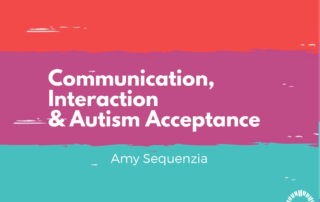
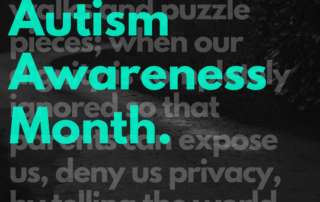
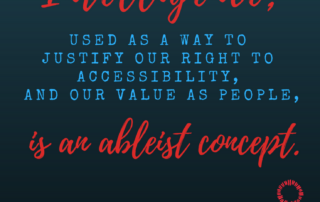
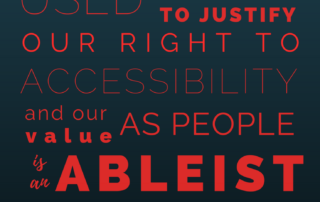
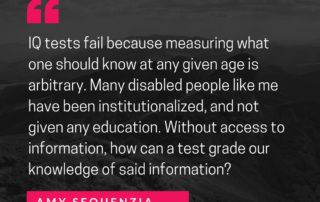
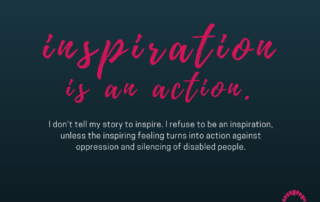
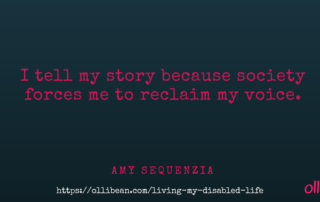
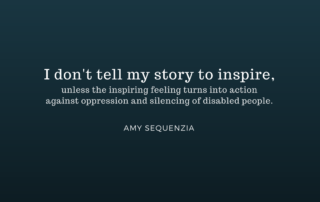
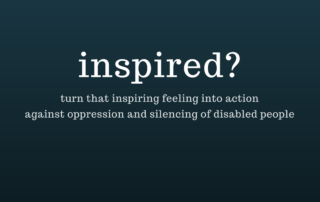
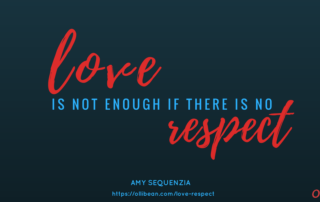
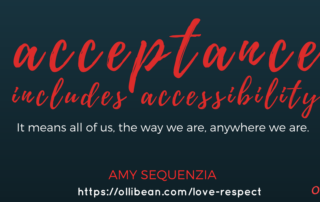
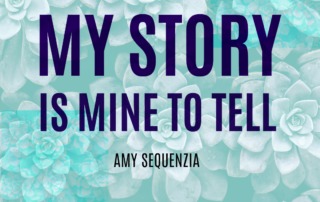
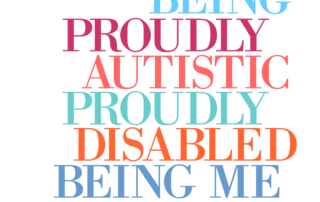
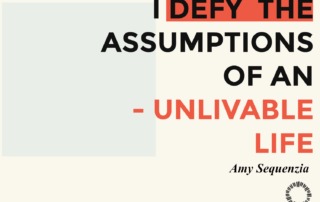
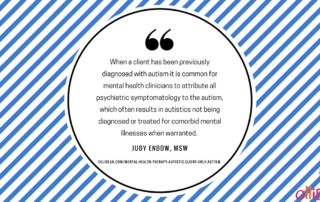
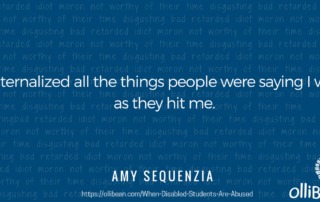
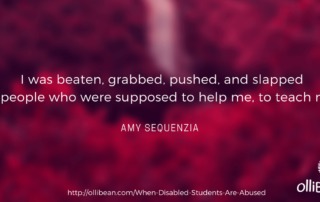
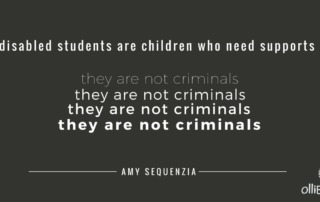
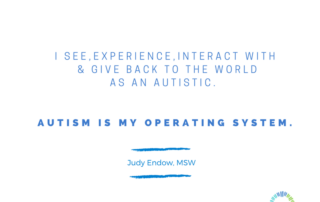
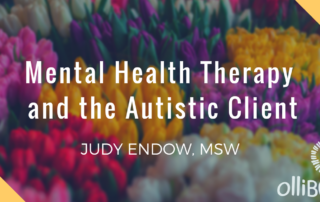
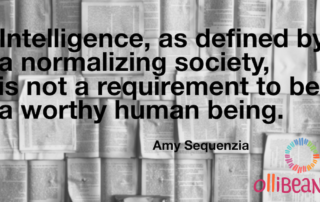
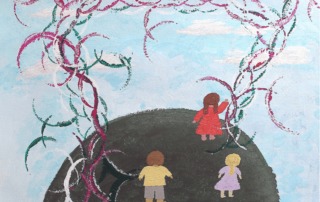
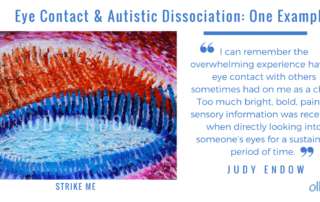
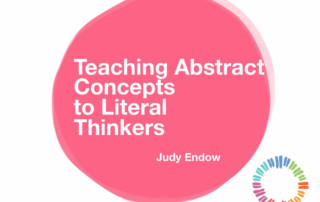
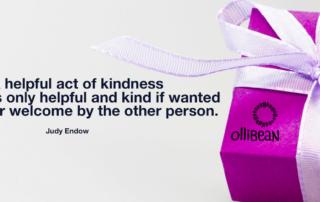
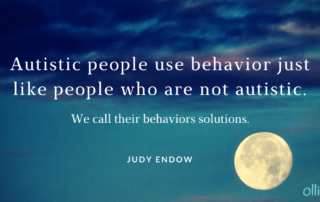
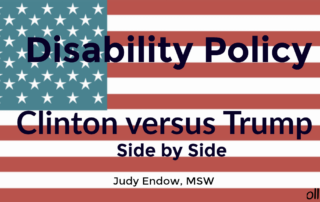
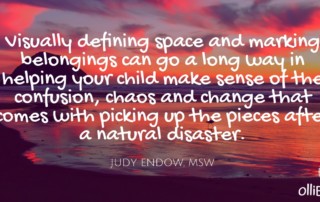

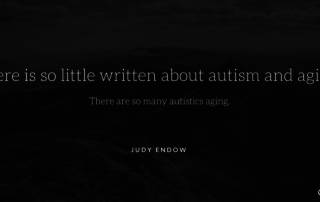
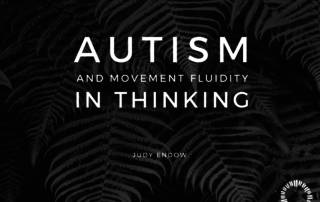
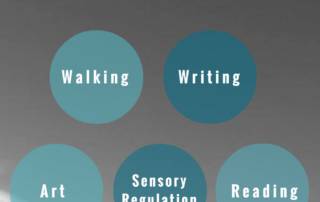
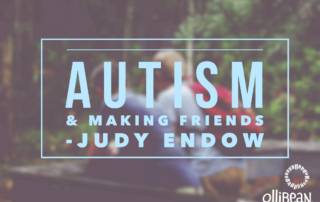
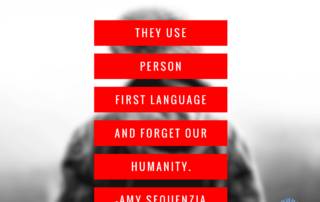
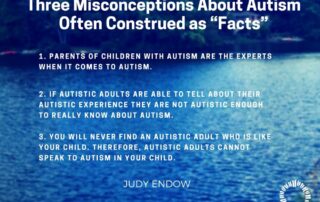
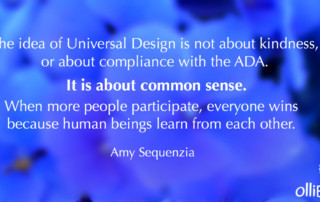
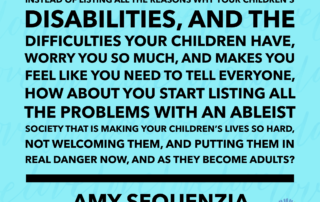
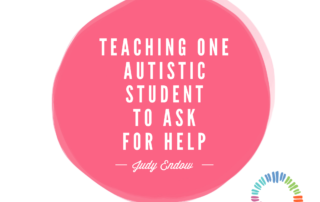
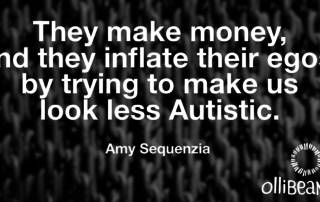
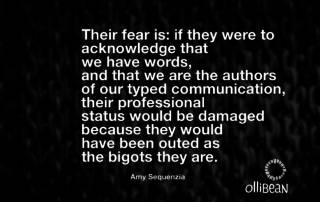
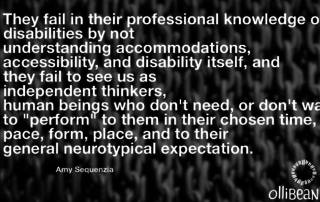
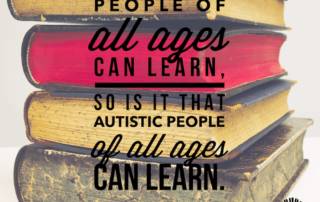
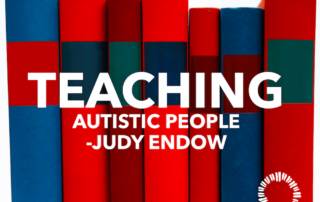
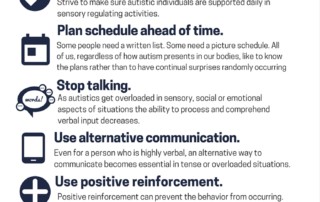
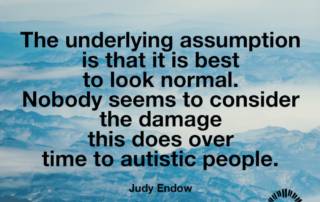
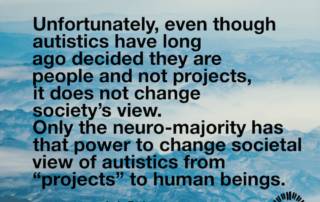
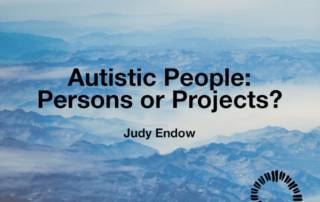
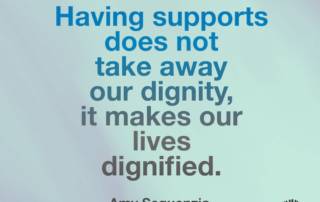
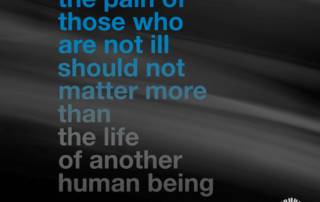
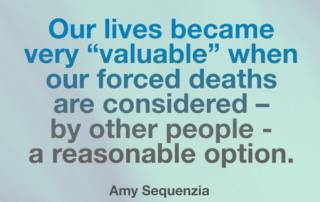
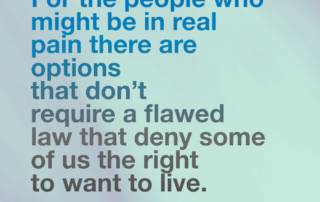
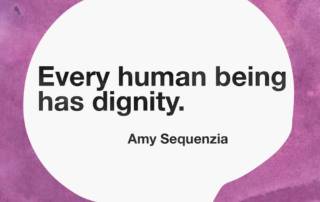
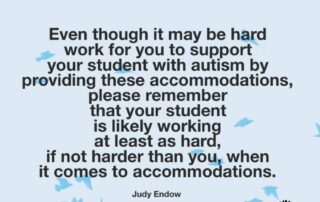
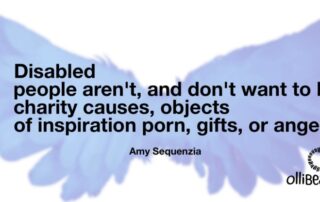
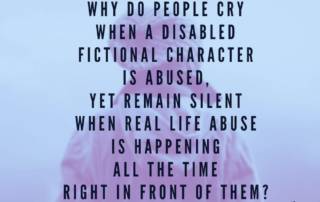
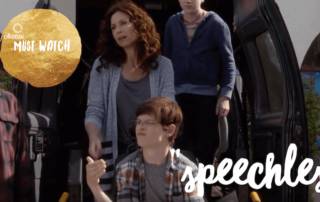
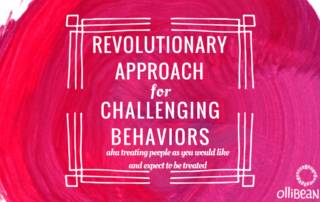
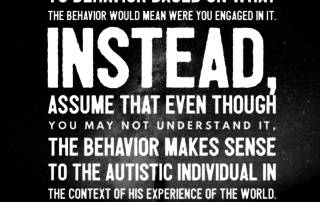
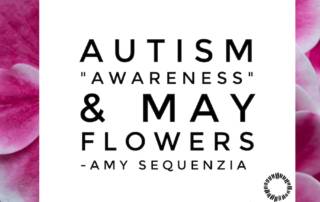
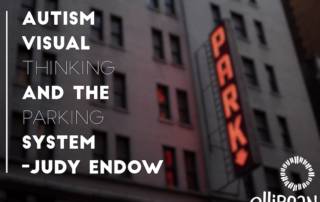
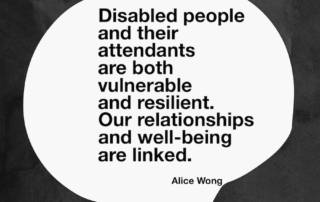
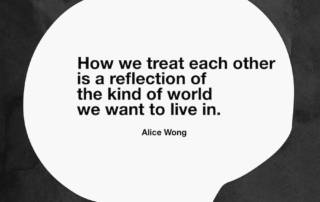

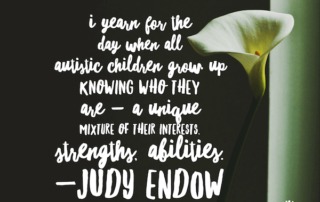
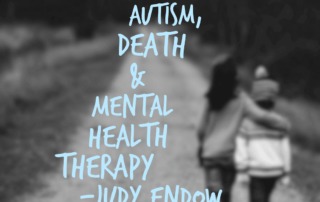
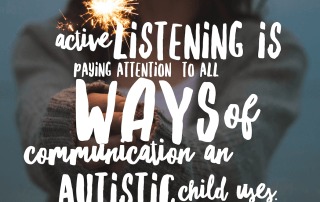
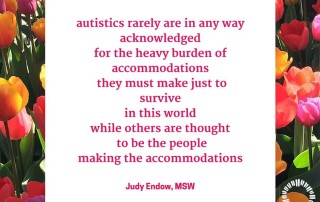
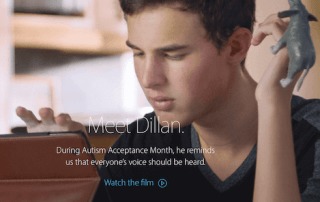
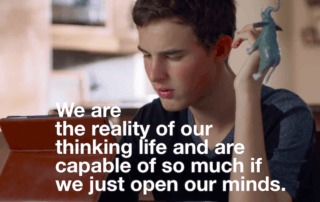
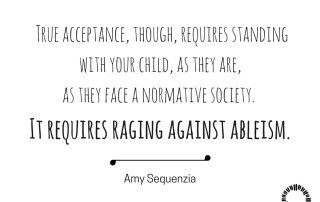
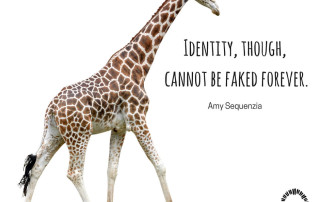
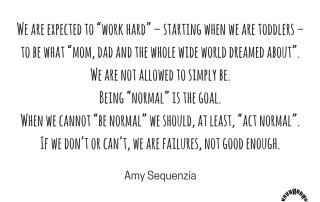
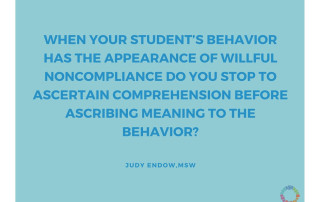
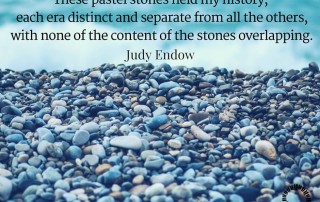
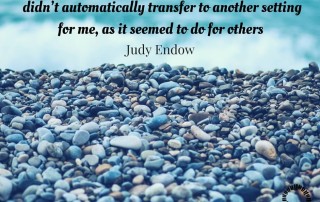
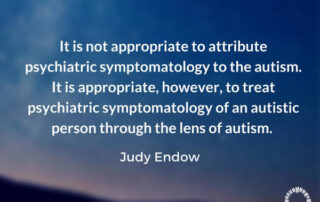
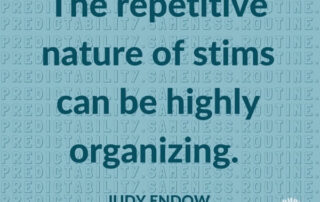
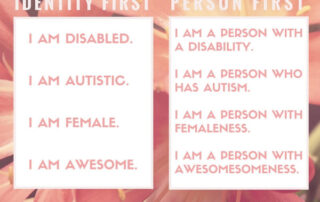
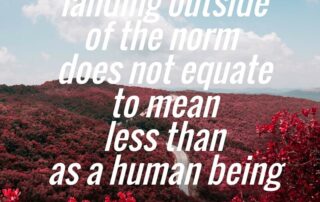
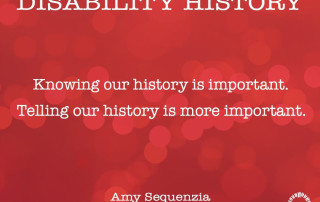
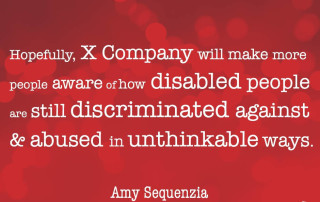
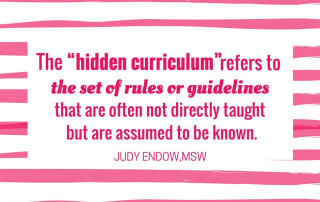
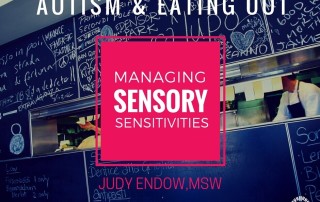
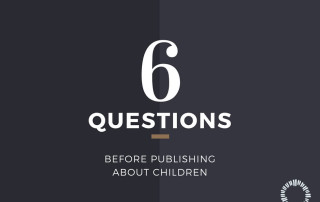
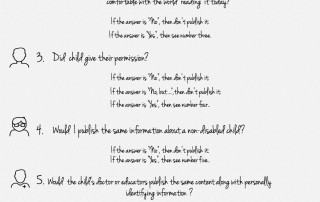
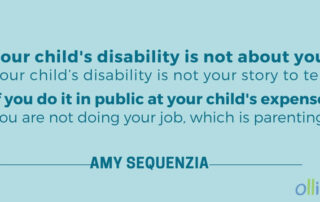
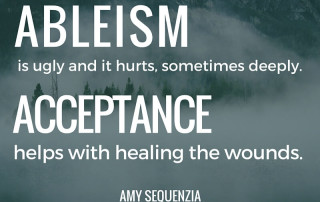

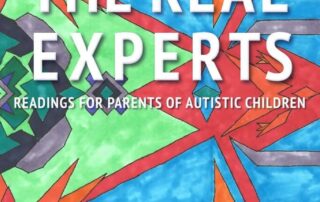


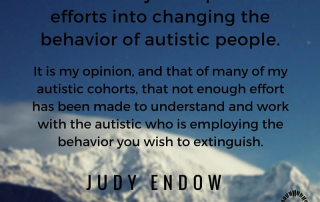
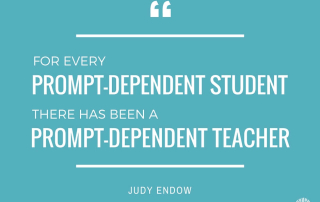
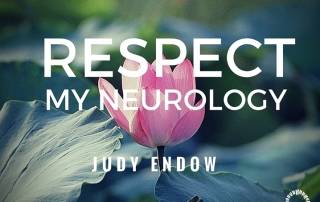

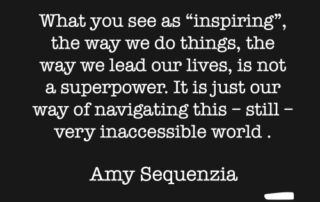
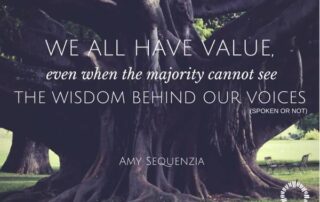
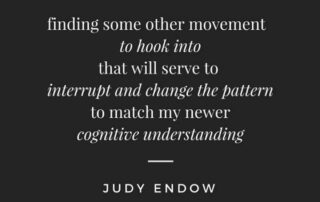
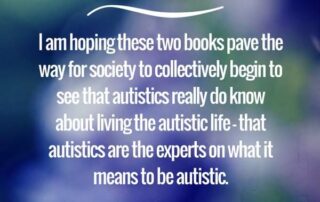
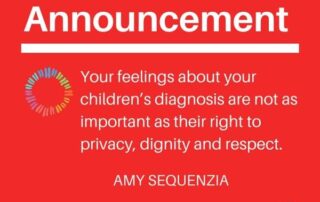
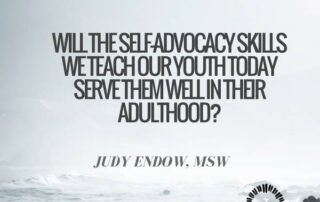

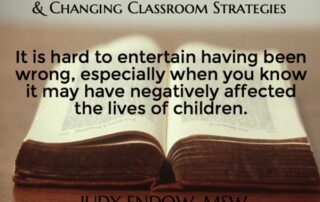


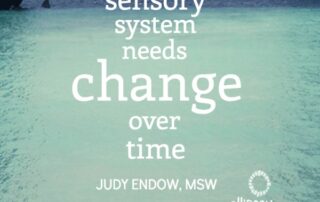
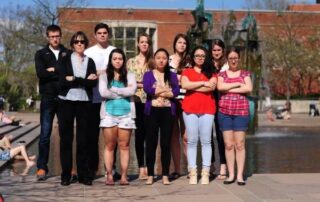
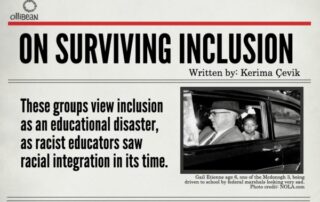
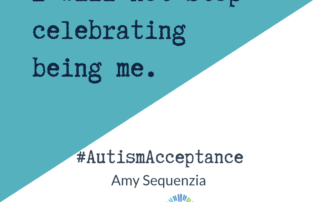
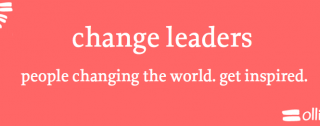
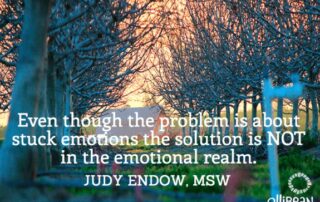
![[Image Description: The NeuroFly: top view of a bright blue human brain, with bright blue butterfly wings sprouting out of the sides.]](https://ollibean.org/wp-content/uploads/2015/10/NeuroFly-1-300x202.png)
